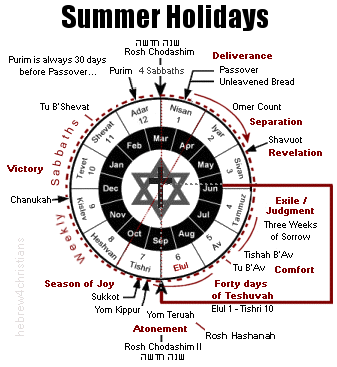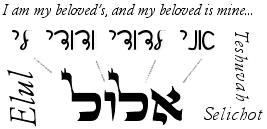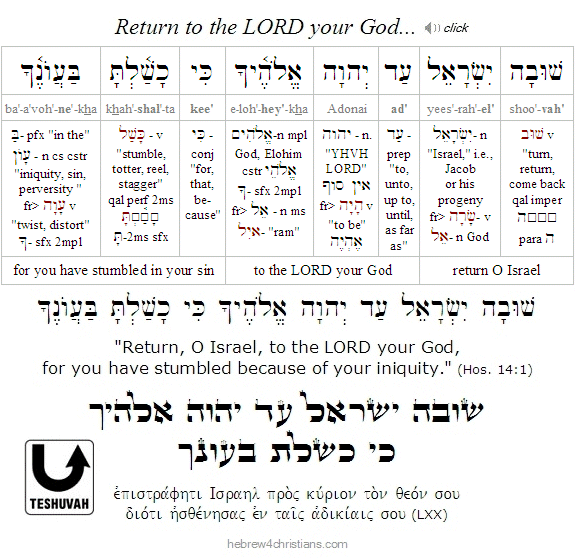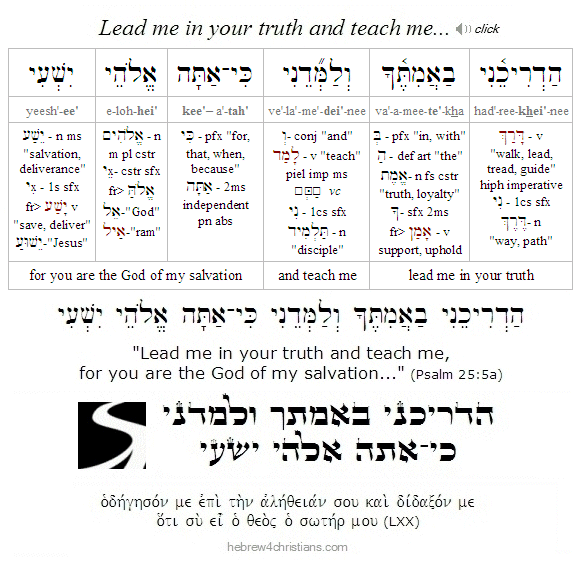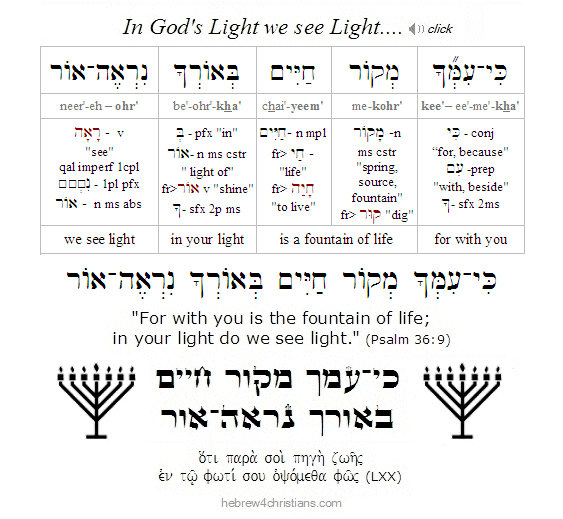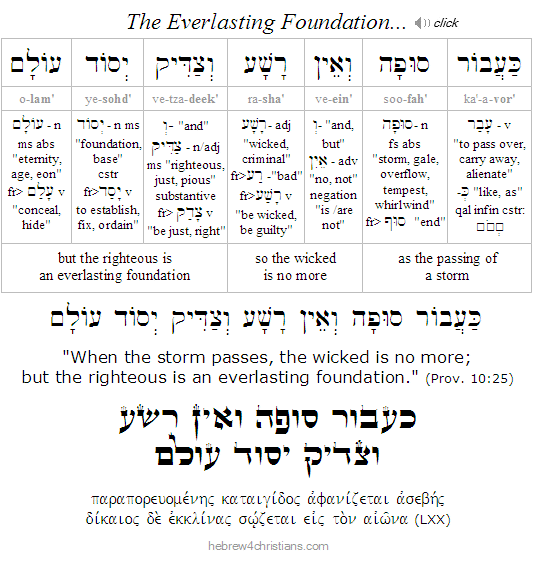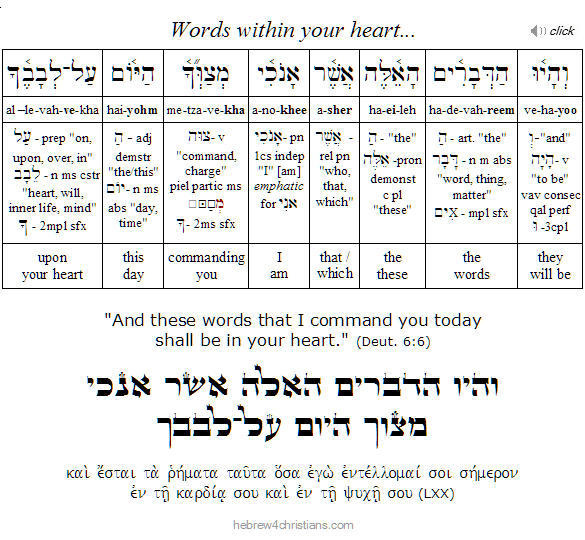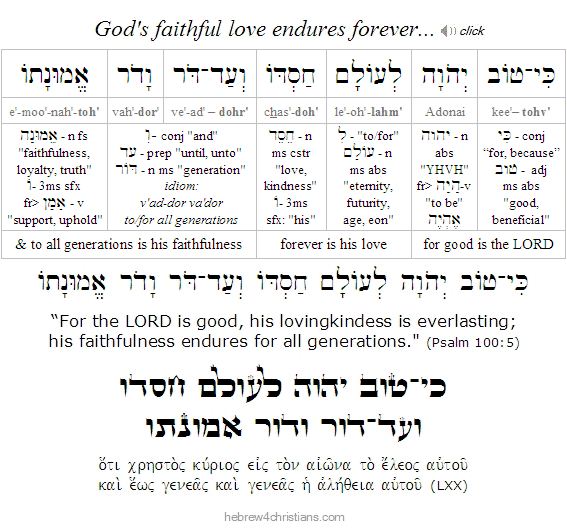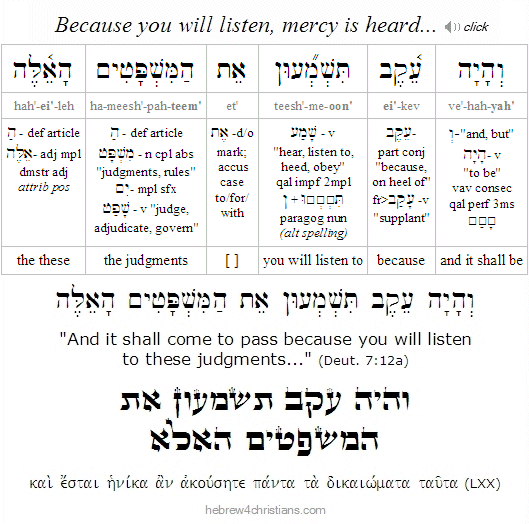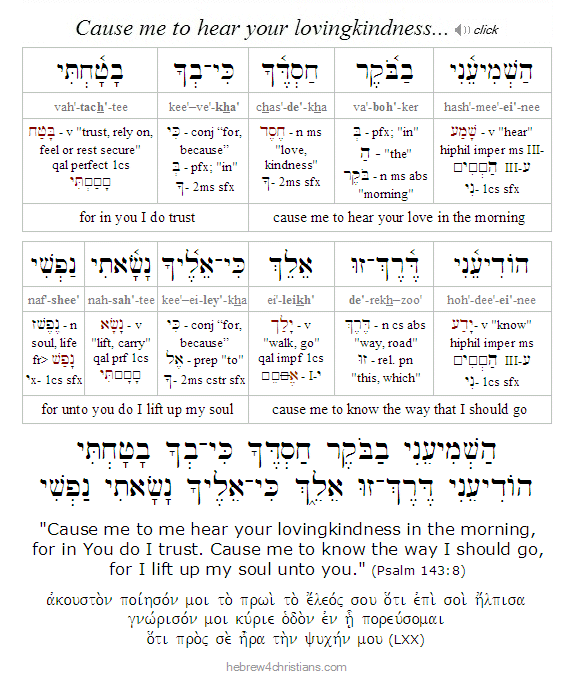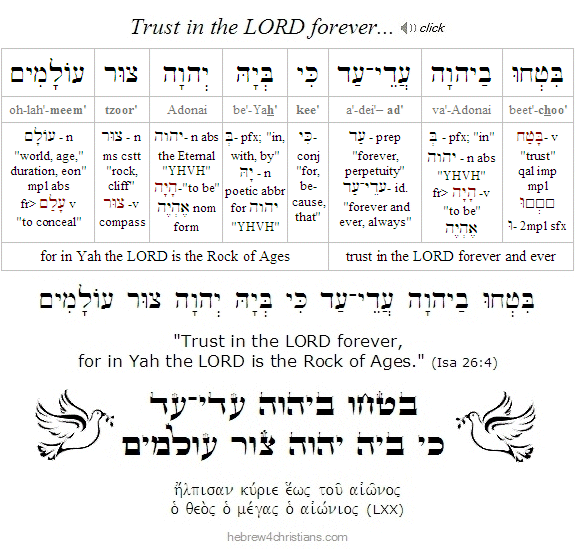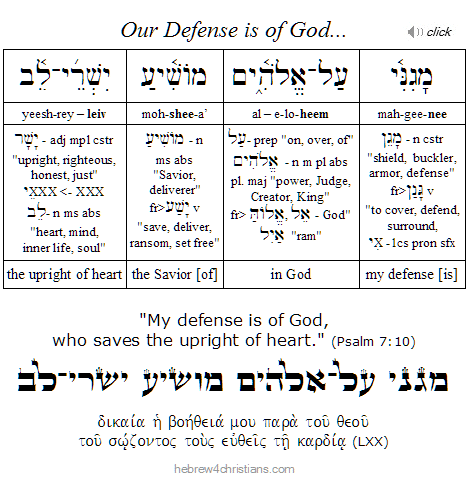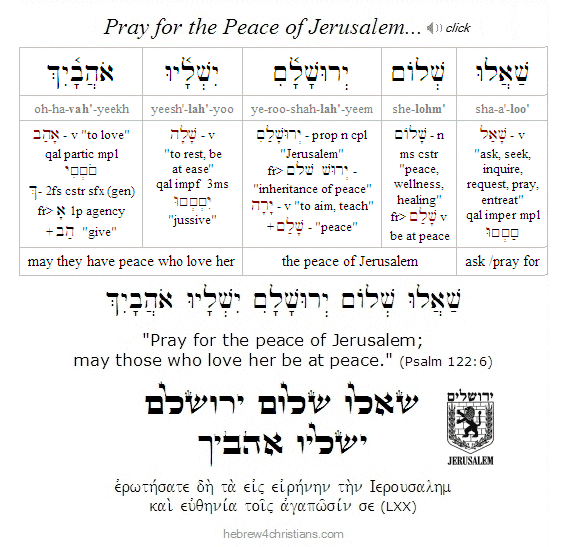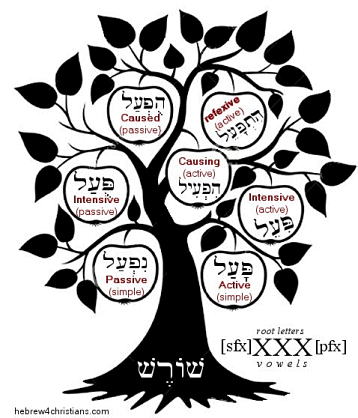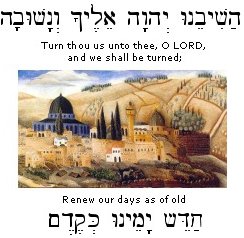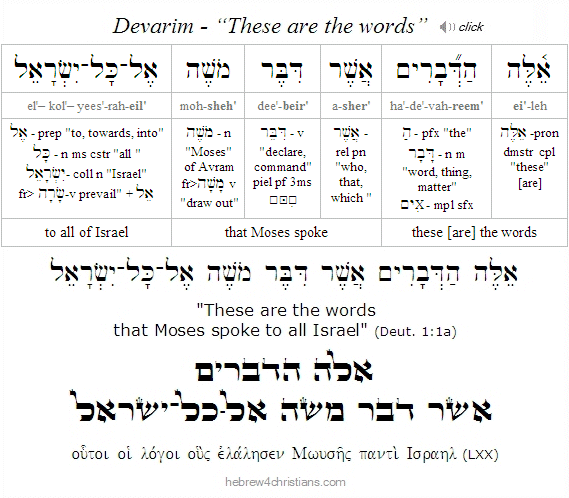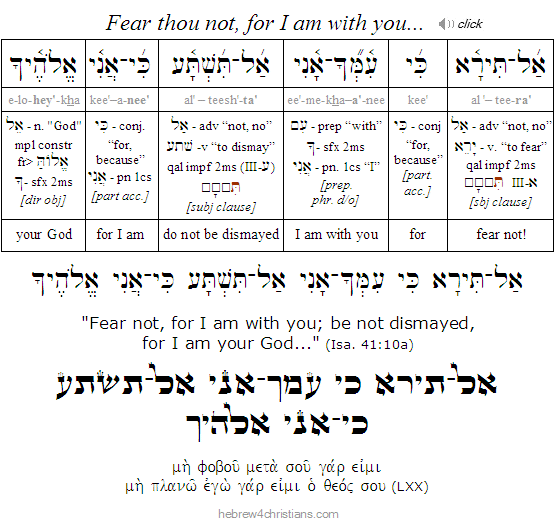|
Jewish Holiday Calendar
For August 2019 site updates, please scroll past this entry....
In the summer there occurs a three week period of mourning that begins with the Fast of Tammuz and ends with Tishah B'Av. The last nine days of this three week period (i.e., from Av 1 until Av 9th) are days of increased mourning. However, after this somber time, the romantic holiday of Tu B'Av, the 15th of Av occurs. Summer ends with the 30 days of the month of Elul, a yearly season of teshuvah (repentance) that anticipates Rosh Hashanah and the fall holidays. The 30 days of Elul are combined with the first 10 days of the month of Tishri to create the "Forty Days of Teshuvah" that culminate with Yom Kippur.
Because they occur between the spring and fall holidays, the summer holidays help us prepare for the second coming of the Messiah:
The Summer Holidays:

Note that in accordance with tradition, holiday dates begin at sundown. Moreover, some holidays may be postponed one day if they happen to fall on the weekly Sabbath:
- Month of Tammuz (Tues. July 2nd [eve] - Thurs. Aug. 1st [day])
- Month of Av (Thurs. Aug. 1st [eve] - Fri. Aug. 30th [day])
- Month of Elul (Fri. Aug. 30th [eve] - Sun. Sept. 29th [day])
- Month of Tishri (Sun. Sept. 29th [eve] - Mon. Oct. 28th [day]) - Fall holidays begin!
Note: For more about the dates of these holidays see the Calendar pages....
August 2019 Updates
Education for Eternity...

[ The following entry concerns this week's Torah reading, parashat Re'eh... ]
08.30.19 (Av 29, 5779) "Know within your heart that, as a parent disciplines his child, so the LORD your God disciplines you" (Deut. 8:5). This verse expresses the idea of "musar" (מוסר), or moral education intended to develop godly character within us. "My son, despise not the chastening (i.e., musar) of the LORD; neither be weary of his correction (i.e., tokhechah). For whom the Lord loves he corrects; even as a father the son in whom he delights" (Prov. 3:11; see also Heb. 12:5-6). In light of Torah we infer that God disciplines us because we are his children, for the sake of our growth and maturity, and not for vindictive reasons. God's correction indicates that he feels responsible for our character development, as a good father feels responsible for the character development of his child. Correction from the Lord is ultimately "soul-building," since it enables us to be partakers of His holiness -- and is grounded in His love and concern for us as our Heavenly Father (see Heb. 12:5-11). Hang in there, friend. "For the moment all discipline seems painful rather than pleasant, but later it yields the peaceful fruit of righteousness to those who have been trained by it" (Heb. 12:11). May God help us in our "education for eternity."
וְיָדַעְתָּ עִם־לְבָבֶךָ
כִּי כַּאֲשֶׁר יְיַסֵּר אִישׁ אֶת־בְּנוֹ
יְהוָה אֱלהֶיךָ מְיַסְּרֶךָּ
ve·yah·da·tah · eem · le·vah·ve·kha
kee · ka·a·sher · ye·ya·seir · eesh · et · be·noh
Adonai · E·loh·hey·kha · me·ya·se·re·ka

"Know within your heart that, as a man disciplines his son,
so the LORD your God disciplines you." (Deut. 8:5)

Teshuvah of Love...

08.30.19 (Av 29, 5779) When considering the matter of teshuvah (i.e., returning to God), it is vital to understand that God does not love you based on your obedience, though his love for you will lead you to obedience... It is only after accepting that you are accepted despite yourself -- despite your inherent inability to please God, despite your incurably sick heart, despite your disobedience, sin, and so on -- it is only then that earnest, Spirit-enabled obedience may spontaneously arise within your heart. In that sense "obedience" is like falling in love with someone. It is your love that moves you to act and to express your heart, and were you prevented from doing so, you would undoubtedly grieve over your loss... Therefore the "law of the Spirit of Life in Messiah" is first of all empowered by God's grace and love. We walk by faith, hope, and love - these three. And this explains why the very first step of teshuvah (repentance) is to love God: Shema! Ve'ahavta et Adonai... The first work of faith is to believe in the miracle that God's love is "for-you-love..."
"The Christian is in a different position from other people who are trying to be good. They hope, by being good, to please God if there is one; or -- if they think there is not -- at least they hope to deserve approval from good men. But the Christian thinks any good he does comes from the Christ-life inside him. He does not think God will love us because we are good, but that God will make us good because He loves us; just as the roof of a greenhouse does not attract the sun because it is bright, but becomes bright because the sun shines on it" (C.S. Lewis: Mere Christianity).
If you find yourself operating from a sense of God's conditional acceptance, you will undoubtedly need to repeat the same sins over and over until your heart is finally convinced of its incurably wretched state. You must first be utterly sick of yourself to believe in the miracle of God's deliverance. Only after this will the message of Messiah find opportunity to speak...
Note: It needs to be added that genuine repentance implies an understanding that sin is dreadfully bad since it separates us from God's love. Some Christians seem to think Jesus died on the cross for their sins so that could live their lives without regard for sin, but that is of course a perversion of the truth. Yeshua did not suffer, bleed out, and agonize upon the cross for our sins so that we'd be given license to disregard the dreadful horror of sin and God's great cost to remedy our hearts... Indeed, by treating sin lightly we disparage the sacrificial work of Yeshua given on our behalf -- we "crucify the Son of God afresh" and thereby deny God's wrath for sin as well as his severe mercy given to those who trust in him (Heb. 6:4-9).
Awakening to Life...
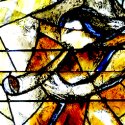
08.30.19 (Av 29, 5779) We shouldn't be surprised that most people refuse to wake up and realize the profound spiritual danger of their lives – namely, the imminent reality of personal judgment and death – since the Scriptures declare that people willingly suppress the truth and "celebrate" untruth (see Rom. 1:20-32). Soren Kierkegaard commented: "The world wants to be deceived... intensely, more intensely, more passionately perhaps than any witness to the truth has fought for the truth, the world fights to be deceived; it most gratefully rewards with applause, money, and prestige anyone who complies with its wish to be deceived" (Judge for Yourself). Indeed, any distraction that seduces people to deny reality will suffice for the sake of untruth... The Scriptures state: "And this is the judgment: the light has come into the world, and people loved the darkness rather than the light because their works were evil. For everyone who does wicked things hates the light and does not come to the light, lest his works should be exposed. But whoever does what is true comes to the light, so that it may be clearly seen that his works have been carried out in the power of God" (John 3:19-21).
"While there is nothing terrifying whatever and no terror whatever, there is nothing that builds up either, no upbuilding whatever. There is forgiveness of sin - that is upbuilding. The terrifying is that there is sin, and the magnitude of the terror in the inwardness of guilt-consciousness is proportionate to the dimension of the upbuilding. There is healing for all pain, victory in all strife, rescue in all danger - that is upbuilding. The terrifying is that there is pain, strife, danger; and the magnitude of the terrifying and the terror is proportionate to what builds up and to the upbuilding." - Soren Kierkegaard, Christian Discourses, 1848.
It's vital to remember that one of the main tactics of the enemy of our souls is to cast a spell over us induce a sense of forgetfulness and apathy... The satan wants you to forget that you are a child of the King. The entire venture of teshuvah (repentance) presupposes that you are created be'tzelem Elohim - in the image of God - and therefore you have infinite value and dignity. This is all the more evident in light of the awesome ransom that Yeshua paid to reconcile your soul with God. Understand: the judgment is great because the love is so great... So what is one of the greatest of sins you can commit in your life? To forget what God has done for you... Remaining asleep, unmindful of your true identity is one of the most tragic things of life. Therefore the blast of the shofar is meant to jolt us from our sleep... We are to remember who we really are -- to remember that God is our King. The person who says, "Tomorrow I will do teshuvah" really is saying, "Not now." And then tomorrow comes and he says, "Not now." And in this way his entire life passes by, saying, "Not now." Finally one day he wakes up only to find himself already dead.
May God help us wake up today to the Reality that is set before us. The "End of the World" is the day you will die and give account of how you lived before the Truth of Eternity -- and there will be no more rationalizations, no more evasions, no excuses, no pretense of being a victim, that will bear on the question before the bar of heaven....
The Advent of Elul...
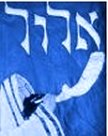
[ The unexamined life is not worth living, and indeed it is merely a facsimile of a worthwhile life... The following is related to the month of Elul and the theme of teshuvah (repentance)... ]
08.30.19 (Av 29, 5779) We are all on a spiritual journey, writing the "Book of our Life." To help us in the "writing" process, the Jewish sages decided that the month of Elul should be set aside as a season for cheshbon hanefesh (חֶשְׁבּוֹן הַנֶּפֶשׁ) - "making an account of the soul." This means that we engage in honest self-examination about our behavior. After all, what is the essence of teshuvah if it is not honesty with yourself? "For everyone who does wicked things (lit., ὁ φαῦλα, that which is "easy," "worthless," or "vain") hates the light and does not come to the light, lest his works should be exposed" (John 3:20). Therefore we make some time to reflect about our lives from the previous year. We ask searching questions like, "How did I get to this place in my life?" "Where am I now?" "Am I where I should be?" We engage in this process of self-examination with an aim to grow -- to let go of the pain of the past and move forward. Confession (i.e., homologia: ὁμολογία) means bringing yourself naked before the Divine Light to agree with the truth about who you are. Indeed, the related verb word "homologeo" (ὁμολογέω) literally means "saying the same thing" - from ὁμός (same) and λόγος (word). We need to confess the truth if we are to be free from the pain of the past. When King David wrote, יְהוָה אוֹרִי וְיִשְׁעִי מִמִּי אִירָ֑א - "The LORD is my Light and my salvation; whom shall I fear? (Psalm 27:1), he implied that he should even be free of fear of himself and of his past....
יְהוָה אוֹרִי וְיִשְׁעִי מִמִּי אִירָא
יְהוָה מָעוֹז־חַיַּי מִמִּי אֶפְחָד
Adonai oh·ree ve·yeesh·ee · mee·mee ee·rah
Adonai mah·ohz-chai·yai · mee·mee ef·chad

"The LORD is my light and my salvation; whom shall I fear?
The LORD is the stronghold of my life; of whom shall I be afraid?"

Hebrew Study Card
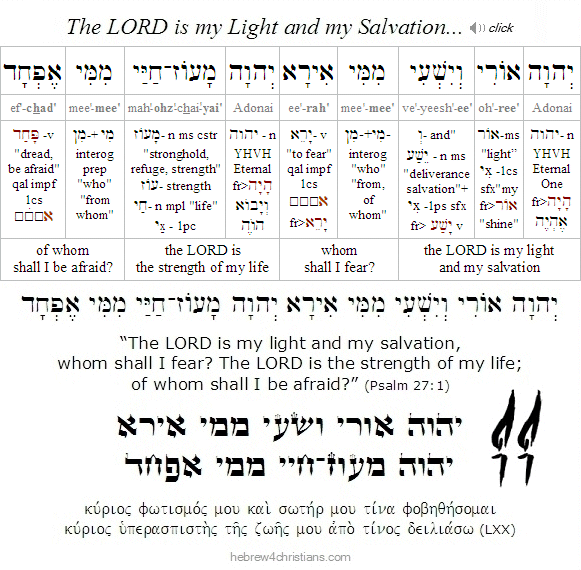
Being honest with ourselves is essential for any sort of authentic spiritual life... "Not everything that is faced can be changed; but nothing can be changed until it is faced" (James Baldwin) "No person is saved except by grace; but there is one sin that makes grace impossible, and that is dishonesty; and there is one thing God must forever and unconditionally require, and that is honesty" (Kierkegaard). Amen. Confession means "saying the same thing" about ourselves that God says - and that means not only acknowledging our various sins, transgressions, and iniquities, but also affirming our new identity as the beloved children of God. Saying that God doesn't love you is a lie as damning as denying His very existence...
Teshvuah of Wisdom....
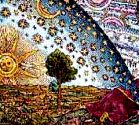
[ The following is related to the month of Elul and the theme of teshuvah (repentance)... ]
08.30.19 (Av 29, 5779) Moses prayed to God: "teach us to number our days," that is, help us understand how to make our days count for eternity, to have a weight of glory that will shine in the world to come... The sages say on the day of death, one considers one's life as if it had been a single day. Life goes by so quickly, and we never know when our personal Rosh Hashanah will come. "No one knows the day or hour..." That's why it is so vital to be healed and to turn to God while there is still time. So turn to him today and bacharta ba'chayim – "choose life!" "For this commandment (of turning to God in teshuvah) is not hidden from you, and it is not far away. It is not in heaven... nor across the sea.... Rather, the matter is very near you - in your mouth and your heart - to do it" (Deut. 30:11-14; cp. Rom. 10:8-13).
לִמְנוֹת יָמֵינוּ כֵּן הוֹדַע
וְנָבִא לְבַב חָכְמָה
eem·noht · yah·mei'·noo · ken · hoh·da'
ve·nah·vee · le·vav · chokh·mah

"Teach us to number our days
that we may get a heart of wisdom."
(Psalm 90:12)

Hebrew Study Card
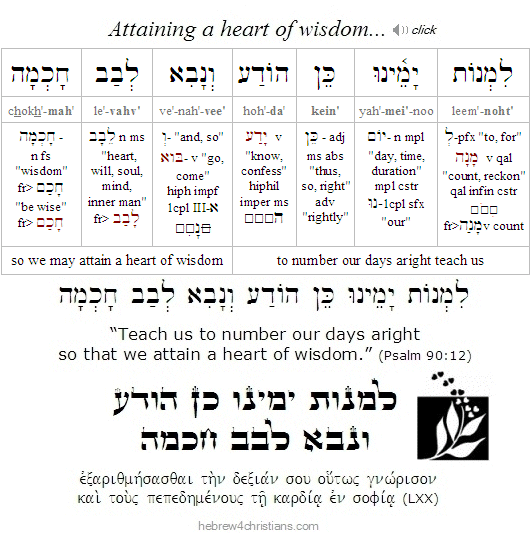
The Time is Now...

08.29.19 (Av 28, 5779) The sages advise: "Repent one day before you die." But who knows the day of one's death in advance? Therefore live each day as if it were to be your last, and may God help you make the wholehearted decision to "seek the LORD while He may be found; call out to Him while He is near." Amen. But many people live in a state of hesitation and uncertainty... The Spirit asks: "How long will you go limping between two different opinions?" (1 Kings 18:21). This question is meant for us to hear today. We are being called to make up our minds and turn (shuv) to the LORD. After all, what is more important to you than your relationship with God? Is there anything more important than this? As C.S. Lewis once said, "Christianity, if false, is of no importance and, if true, is of infinite importance. The one thing it cannot be is moderately important" (God in the Dock). "For he is our God, and we are the people of his pasture and the sheep of his hand today -- if you hear his voice" (Psalm 95:7). Today, if you hear his voice, do not harden your heart (Heb. 3:15). "Take care, brothers, lest there be in any of you an evil, unbelieving heart, leading you to fall away from the living God, but encourage one another every day, as long as it is called "today," so that none of you may be hardened by the deceitfulness of sin" (Heb. 3:12-13). Wake up! The time is now...
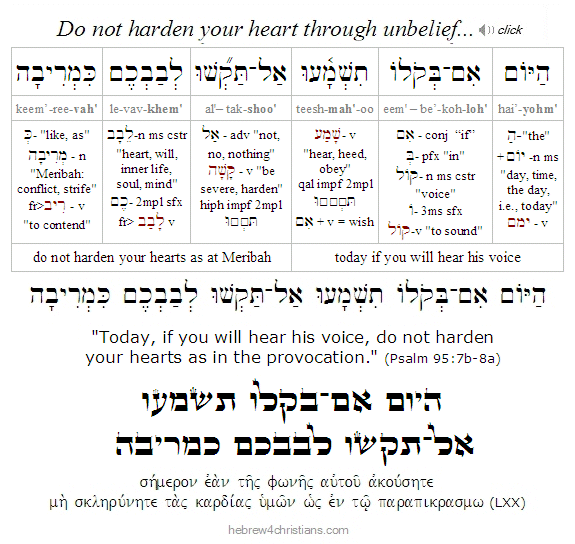 |
Choose Life and Live...
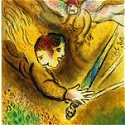
08.29.19 (Av 28, 5779) "See, I am setting before you today a blessing and a curse: the blessing, if you obey the commandments of the LORD your God, which I command you today, and the curse, if you do not" (Deut. 11:26-28). As this verse points out, a crucial aspect of our spiritual life is that we are responsible to choose the blessing over the curse, hope over despair, and life over death. Freedom is therefore a test of the soul, and any denial of our freedom is therefore an evasion of our task. It is "bad faith" to play the victim, to pretend that you can do nothing, or to passively allow yourself to be overtaken by natural passions. There are circumstances that may seem inescapable for you, but even then you can turn to God and intercede for his will to be done in you.
"Every time you make a choice you are turning the central part of you, the part of you that chooses, into something a little different than it was before. And taking your life as a whole, with all your innumerable choices, all your life long you are slowly turning this central thing into a heavenly creature or a hellish creature: either into a creature that is in harmony with God, and with other creatures, and with itself, or else into one that is in a state of war and hatred with God, and with its fellow creatures, and with itself. To be the one kind of creature is heaven: that is, it is joy and peace and knowledge and power. To be the other means madness, horror, idiocy, rage, impotence, and eternal loneliness. Each of us at each moment is progressing to the one state of the other." - C.S. Lewis: Mere Christianity
Therefore choose this day to believe and take hold of God's blessing and promises! Choose to see that your life matters - that everything you do, every deed, every word, every prayer - is significant and has an eternal weight of glory. The commandments are "for life" (Lev. 18:5), meaning they are a blessing as we choose to believe. The sages have said "everything is in the hands of heaven except the fear of heaven" (Berachot 33b). When Moses said to the people, "And now Israel, what does the Lord your God ask of you other than to fear the Lord your God..." (Deut. 10:12), he appealed to them make a real choice. God does not force people to trust in him but instead leaves that decision for each of us to make for ourselves. Dear friend, may you choose life that you may live!
Do not add to his words...

[ The following is related to our Torah reading for this week, parashat Re'eh.... ]
08.28.19 (Av 27, 5779) "You shall not add to the word that I command you, nor take from it, that you may keep the commandments of the LORD your God that I command you" (Deut 4:2; Rev. 22:18-19). The Kotzker rebbe commented, "Do not distort the divine commandments to your own preference; observe them as they are given." If you "cherry pick" which commandments you think are more important and overlook those you think less so, you will fall into idolatry, elevating your own desires above that of simply doing God's will...
This reminds me of a story I once read. A hunter ventured out into the woods and came across targets painted on various trees. As he got a closer look he was surprised to see that all the arrows had hit the bull's eyes on the targets. He was so curious to meet the great marksman who had accomplished this that he decided to search far and wide to find him. Finally he found the archer and questioned him about his skill. "What's the secret behind you accurate aim?" How can an archer attain such perfection?" "It's quite simple," replied the archer. "First I shoot my arrow, and then I paint the target."
It is a common failing of human nature to hear what we want to hear and see what we want to see... When we read and interpret the holy Scriptures, however, we must be careful and guard ourselves from reading into the texts our own biases and preferences, and -- as far as is possible by using due diligence and employing sound exegetical principles -- to let the text "speak for itself." For instance, instead of reading the Torah in its proper semantic context, we often import our understanding of the New Testament theology to the reading and thereby "add to" the commandments of the LORD. Sometimes this is justified, as for example, when we understand how Yeshua is the substance of the various zevachim (sacrifices) defined in the Torah, whereas at other times it is not, as for example, when it is assumed that the promises given to ethnic Israel are to be reinterpreted as belonging to the "church."
We must be careful on this point, friends. Where it is written, "all Scripture is breathed out by God (θεόπνευστος / עַל־פִּי רוּחַ אֱלהִים) and is profitable for teaching, for reproof, for correction, and for training in righteousness, that the man of God may be complete, equipped for every good work" (2 Tim 3:16-17), it is evident that the Scriptures referred to here are the Jewish Scriptures (i.e., the Torah, the Prophets, and the Writings), since they are the foundation, the context, and the overarching matrix for the later New Covenant revelation... These were the Scriptures Yeshua used to contextualize and explain his ministry to his followers: "And beginning with Moses and all the Prophets, he interpreted to them in all the Scriptures the things concerning himself" (Luke 24:27; John 1:45). In other words, the Torah has both a logical, a linguistic, and a theological priority regarding our understanding of the New Testament Scriptures, and the failure to read in context invariably leads to faulty interpretations and doctrinal errors of various kinds. "To the Jew first, and [then] to the Greek" (Rom. 1:16) is a principle not only of how the gospel message would transcend ethnic Israel to be offered to all the nations, but also about how we should approach the subject of Biblical hermeneutics.... God "breathed out" (θεόπνευστος) his revelation in order, and the message itself must be understood in light of that order (Gal. 4:4-5).
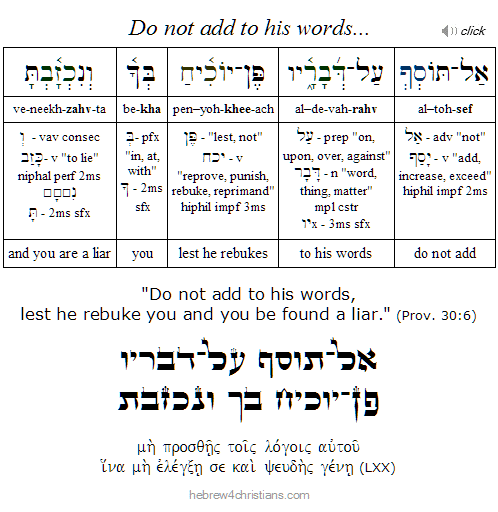 |
Walking after the LORD...

[ The following is related to our Torah reading for this week, parashat Re'eh.... ]
08.28.19 (Av 27, 5779) "You shall walk after the LORD your God and revere him and keep his commandments and heed his voice; you shall serve him and cleave to him" (Deut. 13:4). Here the sages note that the word "after" (i.e., acharei: אַחֲרֵי) implies a sense of distance – and that when we feel distant from God, we should begin taking steps so that we can learn to cleave to him... Experiencing "distance" is a blessing from heaven, then, since without sensing our great need, how could we turn and seek God for healing and life? Indeed, one who regards himself as close to God may actually be far away from him, while the one who realizes how distant he is may in truth be drawing close. We can cleave to God (דְּבָקוּת) only if we first see ourselves as "acharei," or removed, as it is written: "The LORD is near to the brokenhearted (קָרוֹב יְהוָה לְנִשְׁבְּרֵי־לֵב) and saves the crushed in spirit" (Psalm 34:18). As we learn to walk with God, we are often in tension between reverence and love; we feel distant yet we are invited to draw close to God's heart to heal our alienation (James 4:8).
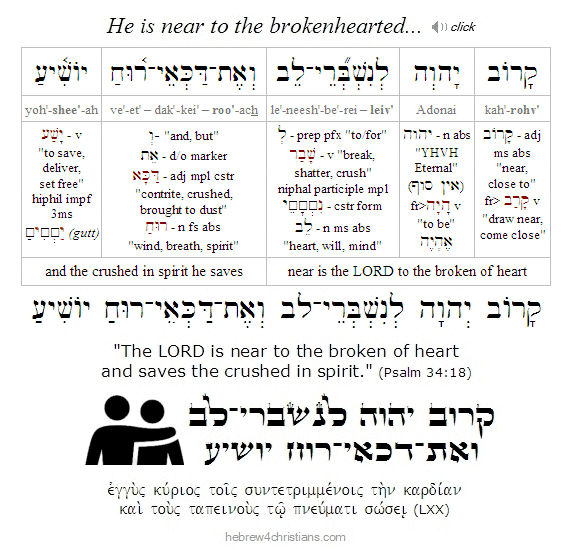 |
Brokenness distills the intentions of the heart by helping us to be more honest with ourselves. We begin to realize that we are more vulnerable than at first we thought; that our faith is not as strong as we imagined, and that our motives are often mixed and unconscious. Illusions are striped away; idols crumble; deeper levels of selfishness are uncovered; the gap between our words and our deeds is exposed... It is one thing, after all, to intellectually think about faith or to idealize spirituality, but it is quite another to walk out faith in darkness. Yet it is only there, in the rawness of heart, that we discover what we really believe and how our faith makes traction with reality...
Knowing who you are...

[ The following entry concerns this week's Torah reading, parashat Re'eh: "See!" Please read the Torah portion to "find your place" here. ]
08.28.19 (Av 27, 5779) One of the greatest mistakes is to forget the message of who you really are and your beloved status before the LORD... "Fear not, for I have redeemed you; I have called you by name, you are mine" (Isa. 43:1). Forgetting who you are leads to forgetting who the LORD is, just as forgetting who the LORD is leads to forgetting who you are... A verse from our Torah reading this week speaks to us along these lines: "You are children of the LORD your God (בָּנִים אַתֶּם לַיהוָה אֱלהֵיכֶם). You shall not cut yourselves for the dead. For the LORD has chosen you to be for him a treasured people (עַם סְגֻלָּה) out of all the peoples who are on the face of the earth" (Deut. 14:1-2). God regards us as his beloved children, and therefore we trust him as a child trusts his father. We may not always understand all that our father does, but we have complete faith in his good will toward us, even in the face of death itself. We do not engage in self-destructive mourning, then, because we are treasured by God and we trust in God's promises for eternal life (John 11:25). Because of this, Jewish halachah (legal custom) puts limits to grieving practices. Excessive mourning, interminable gloom, self-destructive anger, or the refusal to let go of our fear may indicate a lack of faith in God's care as our Father. Remember where it says "God works all things together for good," for that includes even physical death... Let us therefore "hope to the LORD (קַוֵּה אֶל־יְהוָה); be strong and strengthen our heart; and (again) let us hope to the LORD" (Psalm 27:14). Amen.
 |
Note: For more on this very important topic, please see the article "Am Segulah."
Seeing Spiritual Reality...

08.28.19 (Av 27, 5779) Our Torah portion this week (i.e., parashat Re'eh) exhorts us to see clearly – to focus the will – by understanding that our choices have spiritual consequence, and that we are responsible for what we choose. "Re'eh - see!" Open your eyes and apprehend that there is overarching moral reality before which we are infinitely accountable. Therefore we are commanded first to see, because without clear vision we will be unable to discern what is a blessing and what is a curse – that is, we will be blind to the effect our choices have in our lives (Prov. 29:18). Therefore choose this day, and choose life (בָּחַרְתָּ בַּחַיִּים)! Look and know there is good and there is evil, there is the sacred and the profane; there is real blessedness and loss... God will never allow us to be indifferent to Reality. We can (and we must) choose, and if we should regard ourselves as powerless, we deny the truth of our freedom – we turn away from possibility and become enslaved to a victim mentality.... You cannot opt out of responsibility for your choices, since not choosing is itself a choice, and therefore are "forced to be free" - and bear the consequences of how we live. As the C.S. Lewis once said, "Christianity, if false, is of no importance and, if true, is of infinite importance. The one thing it cannot be is moderately important" (God in the Dock).
בְּאֵין חָזוֹן יִפָּרַע עָם
וְשׁמֵר תּוֹרָה אַשְׁרֵהוּ
be·eyn · cha·zon · yip·pa·ra' · am
ve·sho·mer · to·rah · ash·rei·hu

"Where there is no vision, the people cast off restraint,
but the one who keeps Torah is made happy" (Prov. 29:18).

Download Study Card
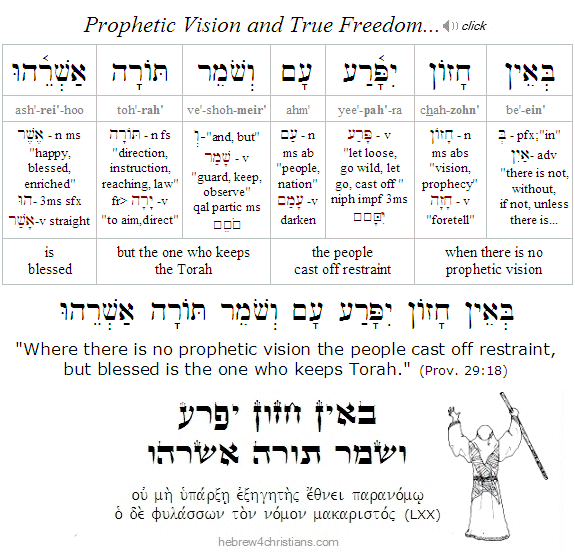
Torah of a Good Eye (תּוֹרָה שֶׁל עַיִן טוֹבָה)

08.28.19 (Av 27, 5779) Our Torah for this week (i.e., parashat Re'eh) directs us to look with compassion upon the needy and to suppress our selfish impulses: "Take care lest there be an unworthy thought in your heart ... and your eye look grudgingly on your poor brother, and you give him nothing, and he cry to the LORD against you, and you be guilty of sin (Deut. 15:9). The Hebrew verb translated "take heed" is an imperative urging us to be careful about how we think, since our thoughts affect our hearts, and our hearts affect our choices and actions. Suspicious or cynical thoughts are a symptom a hard heart, that is, a "difficult" heart that has trouble feeling sympathy for others. Note that the word translated "unworthy" (in the phrase "unworthy thought") is beli'al (בְּלִיַּעַל), which, according to Samson Raphael Hirsch, derives from the preposition be'li (בְּלִי), meaning "without," and ya'al (יַעַל), meaning "to progress," suggesting thinking that is feckless, stunted, profane, and useless. Worthy thinking, on the other hand, is fruitful as looks for the good in others and extends chesed, as it is written: ῾Η ἀγάπη ...οὐ λογίζεται τὸ κακόν, "love does not think evil" (1 Cor. 13:5) and ῾η ἀγάπη συγχαίρει δὲ τῇ ἀληθείᾳ, "love rejoices in the truth" (1 Cor. 13:8).
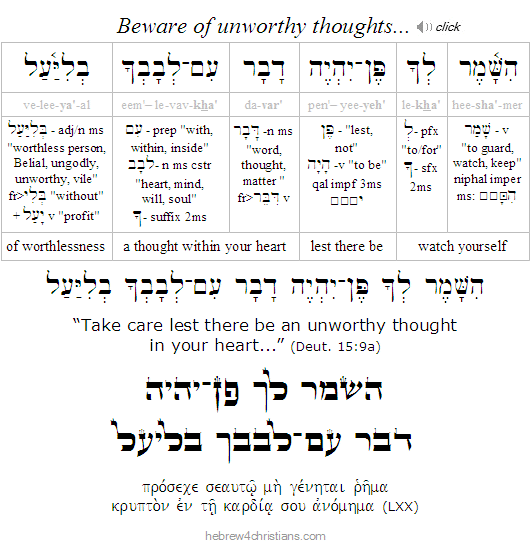 |
The LORD wants us to be willing to help others who are in need... Regarding the case of a poor brother Torah says: "You shall give to him freely (i.e., naton titten lo: נָתוֹן תִּתֵּן לוֹ, "giving you shall give") and your heart shall not be grudging when you give to him, because for this reason the LORD your God will bless you in all your work and in all that you undertake" (Deut. 15:10). Don't miss the connection here: you are blessed in order to give to those in need. Moreover, the Scripture promises that "whoever is generous to the poor lends to the LORD, and he will repay him for his deed" (Prov. 19:17; cp. Prov. 28:27).
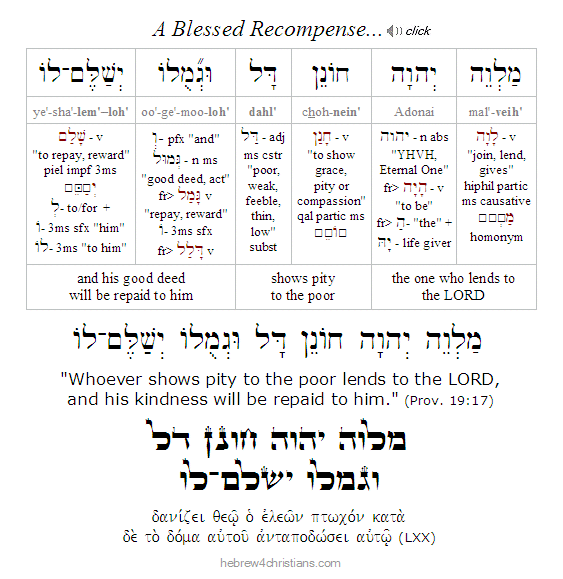 |
We read: "Whoever diligently seeks good seeks favor, but evil comes to him who searches for it" (Prov. 11:27). The one who seeks good is called shocher tov (שׁחֵר טוֹב), "a seeker of good." The shocher tov uses the "good eye" (i.e., ha'ayin ha'tovah: הַעַיִן־הַטּוֹבָה) to see worth and potential in others. The one who searches out evil, on the other hand, is called doresh ra'ah, "a searcher of evil." The doresh ra'ah has an evil eye (ayin ha'ra) that is stingy, critical and faultfinding. The proverb may therefore be stated this way: When you seek the good of others, you will find God's favor (ratzon), but when you search for evil in others, it becomes your own. As the Baal Shem Tov once said, "When we see faults in others, we must understand that they only reflect the evil within ourselves." Likewise King David said, וּתְפִלָּתִי עַל־חֵיקִי תָשׁוּב, "my prayer shall turn back upon my breast" (Psalm 35:13). Some prayers are conscious words spoken to God, whereas others are expressions of heart attitudes. Our proverb teaches that when we harbor indifference, ill will, or resentment toward others, we hurt ourselves; when we favor others and desire their blessing, on the other hand, we will find God's favor and blessing. טוֹב־עַיִן הוּא יְברָךְ - "The one with the good eye will be blessed" (Prov. 22:9; Matt. 6:22).
We read: "Whoever diligently seeks good seeks favor, but evil comes to him who searches for it" (Prov. 11:27). The one who seeks good is called shocher tov (שׁחֵר טוֹב), "a seeker of good." The shocher tov uses the "good eye" (i.e., ha'ayin ha'tovah: הַעַיִן־הַטּוֹבָה) to see worth and potential in others. The one who searches out evil, on the other hand, is called doresh ra'ah, "a searcher of evil." The doresh ra'ah has an evil eye (ayin ha'ra) that is stingy, critical and faultfinding. The proverb may therefore be stated this way: When you seek the good of others, you will find God's favor (ratzon), but when you search for evil in others, it becomes your own. As the Baal Shem Tov once said, "When we see faults in others, we must understand that they only reflect the evil within ourselves." Likewise King David said, וּתְפִלָּתִי עַל־חֵיקִי תָשׁוּב, "my prayer shall turn back upon my breast" (Psalm 35:13). Some prayers are conscious words spoken to God, whereas others are expressions of heart attitudes. Our proverb teaches that when we harbor indifference, ill will, or resentment toward others, we hurt ourselves; when we favor others and desire their blessing, on the other hand, we will find God's favor and blessing. טוֹב־עַיִן הוּא יְברָךְ - "The one with the good eye will be blessed" (Prov. 22:9; Matt. 6:22).
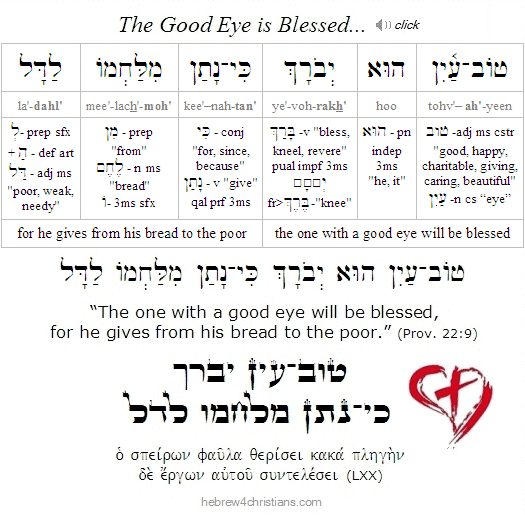 |
The heart looks through the eye.... A good eye (i.e., ayin tovah: עַיִן טוֹבָה) - sometimes called a "beautiful eye" (עין יפה) - refuses to think evil about others (it "does not impute the bad" - οὐ λογίζεται τὸ κακόν - as in 1 Cor. 13:5), but it rejoices in the truth – even if such truth is found only in the hope of a future good (1 Cor. 13:7). The good eye is the instrument of a giving heart that looks upon the needs and pains of others with genuine compassion. An "evil eye" (i.e., ayin hara: עַיִן רָעָה), on the other hand, is cynical, jaded, envious, and unsympathetic to other people and their struggles... Using a good eye takes from the treasure within the heart and gives it out freely to others: "The good person out of his good treasure brings forth good, and the evil person out of his evil treasure brings forth evil" (Matt. 12:35). There never is a risk that true compassion may be given away without warrant from heaven. In the future judgment to come, I'd rather be found guilty of "casting pearls before swine" than to be found guilty of withholding love from others...
A person with a "good eye" looks at things from the perspective of love. It beholds all circumstances -- and especially other people -- and invariably finds something worthy and beautiful.... "Whoever sows sparingly will also reap sparingly, and whoever sows bountifully will also reap bountifully" (2 Cor. 9:6). As we give, so we are given... Therefore the "Torah of a Good Eye" (תּוֹרָה שֶׁל עַיִן טוֹבָה) teaches that "whatever is true, whatever is honorable, whatever is just, whatever is pure, whatever is lovely, whatever is commendable, if there is any excellence, if there is anything worthy of praise, think about these things" (Phil 4:8).
Prophetic Listening...

08.27.19 (Av 26, 5779) A verse from Torah recalls Yeshua's words that "every scribe who has been trained for the kingdom of heaven is like a master of a house, who brings out of his treasure what is new and what is old" (Matt. 13:53). Rashi noted that the phrase, "And it shall come to pass if you hear" in Deut. 11:13, i.e., ve'hayah im shamo'a tishme'u (וְהָיָה אִם־שָׁמעַ תִּשְׁמְעוּ), is grammatically puzzling, since it the Hebrew reads "if you hear, you will hear," which suggests that as we listen attentively to the words of Torah, we will hear more, and we will encounter spiritual connections and applications that are new and ready for this hour. The early sages commented: "If you listen to the old, you will listen to the new" (Berachot 40a). Focusing our attention on the commandments even while in exile is likened to practice for the world to come, since then they will not be new to you when the final redemption appears. Happy are those who love the Torah. More light comes as we live in the truth (John 13:17). As Yeshua also said: "For to the one who has, more will be given, and he will have an abundance, but from the one who has not, even what he has will be taken away" (Matt. 13:12).
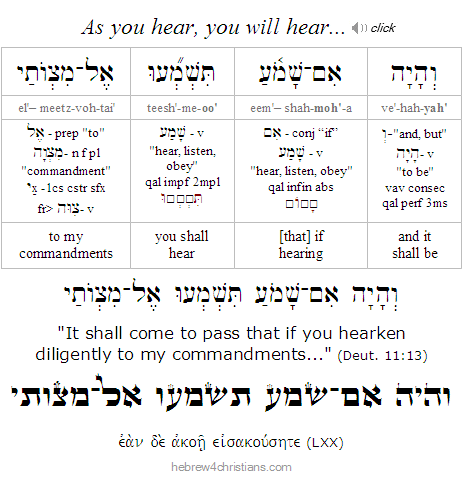 |
Seeing the Blessing...
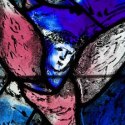
[ The following is related to our Torah reading for this week, parashat Re'eh.... ]
08.27.19 (Av 26, 5779) "See, I am giving... the blessing (הַבְּרָכָה) when you hearken (i.e, shama: שָׁמַע) to the commandments of the LORD your God which I command you today" (Deut. 11:26-27). Do not understand this as referring to blessing that results from hearing God's word, but rather the blessing that enables you to hear it in the first place... That is the blessing of being made awake, alive, and attuned to the Spirit of God. In this world you may or may not receive material blessing as you heed the truth, though you assuredly will be sustained by God's ongoing care (Psalm 37:25). The heavenly blessing is always present before you, however, when you sincerely turn to God and seek to do his will. And may it please the LORD our God to help us turn to Him now, in this hour...
"Blessed be the God and Father of our our Lord Yeshua the Messiah, who has blessed us in Messiah with every spiritual blessing in the heavenly places" (Eph. 1:3). Note that the Greek text translated "with every spiritual blessing" (i.e., ἐν πάσῃ εὐλογίᾳ πνευματικῇ) does not refer to "merely spiritual" as opposed to substantial or material blessings, but rather the blessing given by the Holy Spirit, those powers and graces "in heavenly places" (ἐν τοῖς ἐπουρανίοις), that derive from the kingdom of God, which are the highest blessings of all.
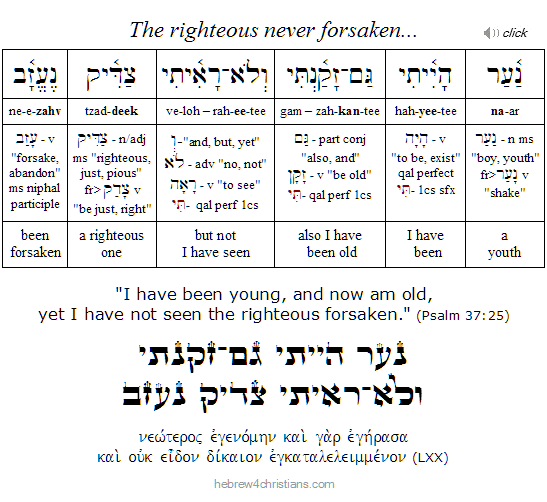 |
The Falling Away...

[ "Let no one deceive you in any way, for that day will not arrive until the falling away comes first (ἡ ἀποστασία πρῶτον), and then the son of perdition will be revealed..." (2 Thess. 2:3) ]
08.26.19 (Av 25, 5779) The widespread apostasy from the Christian faith we see today is the result of the abandonment of the sanctity of truth. Apart from the defection of the faith regularly seen in the "mainline" church denominations, in recent years many so-called "evangelical" churches have promoted a worldly (i.e., pragmatic) model of "church growth," selling Jesus as the answer to all of life's problems, an easy way to find happiness, prosperity, and peace... "Your best life now!" But friend, God never promised us an easy time of it if we followed him, but instead trouble, persecution, heartache and difficulties. As it is written "we must through much tribulation (διὰ πολλῶν θλίψεων) enter into the kingdom of God (Acts 14:22). Indeed "all those who live godly lives in Messiah will suffer persecution" (2 Tim. 3:12). This is normal and to be expected. As Yeshua said, "If they persecuted me, they will also persecute you; if they listened my word, they will listen to yours too" (John 15:20). "Selling Jesus" as a means to the end of finding personal happiness is wrong-headed and ultimately deceptive. God forbid that we should make an idol out of the Savior -- to regard him as a dispenser of blessings who lives to serve our desires! No! Yeshua did not come to make our lives easy but for us to come to the end of ourselves -- to set us free from this world and its ungodly matrix -- and to forsake any confidence we might have in the ways of human aspiration (John 1:12-13; Rom. 12:2, Titus 2:12). Over and over again he scandalized the religious sentiments of his day, upending and destroying conventional assumptions. "How difficult it will be for those who have wealth to enter the kingdom of God!" And the disciples were astonished at his words, be he said to them again, "Children, how difficult it is to enter the kingdom of God!" (Mark 10:23-24). Far from being a sign of divine favor, having wealth and material prosperity hinders access to the truth of God (James 5:1-9). "You adulterous people! Do you not know that friendship with the world is enmity with God? Therefore whoever wishes to be a friend of the world makes himself an enemy of God" (James 4:4).
We have a moral imperative, given by God Himself, to receive the truth and to live according to the nature of spiritual reality. Those who reject or suppress the truth, however, are responsible for their actions, as it is written, "No one who practices deceit shall dwell in my house; no one who utters lies shall continue before my eyes" (Psalm 101:7). We are commanded to keep distant from falsehood (Exod. 23:7; Prov. 4:24). People often lie when they want to manipulate reality to serve their desires. In that sense the lie is similar to lust, since lust seeks its own inner satisfaction regardless of the moral duty of the moment... Lying is also like stealing, since it reports reality to be something it isn't, and that difference robs another person of what is needed to navigate their lives properly... "A worthless person, a wicked man, goes about with crooked speech" (Prov. 6:12). Truth is the foundation of reality, and lying is therefore a form of denial of reality – a dangerous denial - since reality invariably proves self-authenticating (John 3:18). "The lip of truth will stand forever; but a lying tongue is but for a moment" (Prov. 12:19).
Being honest with ourselves is absolutely essential for any sort of authentic spiritual life... "No person is saved except by grace; but there is one sin that makes grace impossible, and that is dishonesty; and there is one thing God must forever and unconditionally require, and that is honesty" (Kierkegaard). Confession means "saying the same thing" about ourselves that God says - and that means not only acknowledging our various sins, transgressions, and iniquities, but also affirming our new identity as the beloved children of God. Saying that God doesn't love you is a lie as damning as denying His very existence...
May God help us never to "trifle" with Him, to play "religious games," and thereby fool ourselves... "God chose you from the beginning for salvation through sanctification by the Spirit and faith in the truth (πίστει ἀληθείας)" - 2 Thess. 2:13. It is the truth that sets us free, and for the truth Yeshua gave Himself up for us: "For this purpose I was born and for this purpose I have come into the world -- to bear witness to the truth. Everyone who is of the truth listens to my voice" (John 18:37). May it please the LORD our God to fill us with the Spirit of Truth (רוּחַ הָאֱמֶת) and to help us be honest with ourselves at all times. Amen.
 |
Life in Perilous Times...

08.26.19 (Av 25, 5779) The Scriptures foretell that the time before the prophesied End of Days would be "perilous" (χαλεπός) and full of moral depravity: "Understand this, that in the last days perilous times (καιροὶ χαλεποί) shall come" (2 Tim. 3:1). In the entire New Testament, the only other place we find this word translated "perilous" (i.e., χαλεπός) is in Matthew 8:28, where it describes savage demonic activity. Indeed, the word likely comes from a Greek verb (χαλάω) that means "to let down from a higher place to a lower," thereby creating a sort of spiritual "chasm" or rift, which again suggests that Satan's activity will be unleashed upon the earth. In the "End of Days," then, a wave of fierce demonic activity will appear upon the earth that will menace and terrorize others. If you can stomach reading the daily news, you will see that this peril is a regular feature of our world today.
Are we then to be in dread of these things? No. "There is no fear in God's love" (φόβος οὐκ ἔστιν ἐν τῇ ἀγάπῃ). God gives truth and grace to help us navigate our difficult situation; he understands the character of the times in which we live... Notice that the Greek word translated "times" in the phrase "perilous times" (καιροὶ χαλεποί) is also translated "appointed times" (מוֹעֲדִים) throughout the Scriptures. In other words, God has appointed this time to be one of judgment upon the world system, and we are here forewarned so that we can speak the truth and offer healing to others who seek deliverance... The Lord will never leave us nor forsake us; He will shelter us in Goshen (גּשֶׁן, lit. "drawing near") before the hour of his wrath; He will walk with us through the waters, and through the fires (Isa. 43:2). Our Lord knows how to calm the storms around us...
Let us be careful to whom we listen and accept as our authority. The latest "news" and gossip of this evil world is inherently deceptive, a carefully crafted dialectic of social engineering devised by Satan that is intended to divide people into warring factions in order to enslave them to their fears. We are not to follow the madness of the crowd or be victims of such devices (1 Pet. 5:8-9). The irony in all of this is that there is indeed a "dialectic" of the Spirit in motion, however, a dialectic that will make the various conflicts of this world look like a mere "tempest in a teapot." The great day of the LORD approaches, and the elements will all be burned with fervent heat, as it is written: "But the Day of the LORD (יוֹם־יְהוָה) will come like a thief, and then the heavens will pass away with a horrific roar, and the heavenly bodies will be burned up and dissolved, and the earth and every deed done on it will be laid bare" (2 Pet. 3:10). As was also foretold in our prophets: "Lift up your eyes to the heavens, and look at the earth beneath; for the heavens vanish like smoke, the earth will wear out like a garment, and they who dwell in it will die in like manner; but my salvation will be forever, and my righteousness will never be dismayed" (Isa. 51:6). Instead of giving credence to the fearmongering and propaganda of this depraved world, we must follow the LORD God Almighty and to submit to His leadership despite the madness that surrounds us. May God give us greater grace for these desperate days...
Struggle and Shalom...

08.26.19 (Av 25, 5779) In our Torah reading for this week (i.e., parashat Re'eh) it is written: "You shall not worship the LORD your God in that way" (Deut. 12:4), which here refers to Canaanite practices of idolatry that were based on mystery and superstition. Unlike these religious cults that were based on vain speculations, however, the Jews were duty-bound to carry out God's will as expressed by the truth of divine revelation. Our father Abraham was given revelation of Torah (Gen. 26:5) and at Sinai moral truth was enshrined in the Ten Commandments (Exod. 24:12; Deut. 5:22). A basic assumption of Torah therefore is that "ought implies can," or that we are genuinely responsible to know and to do moral truth. Unlike the ancient "mystery religions" that abandoned themselves by "celebrating" the lower nature, the Torah insists on overruling our base impulses and finding peace in the midst of the struggle to walk in righteousness. Therefore we do not understand the Hebrew word "shalom" (שָׁלוֹם), or "peace," to simply mean the absence of strife, but rather "wholeness," "completeness," "healing" -- the integration of the heart and mind that comes through catharsis and personal struggle (Gen. 32:28). Faith does not mean passivity, but protest -- "arguing" for (and even sometimes arguing with) heaven, reminding God of his promises, lamenting over the divine absence; finding courage to oppose the status quo, and repeatedly appealing to heaven "be'khol levaveinu" (בְּכָל־לְבָבֵנוּ) -- with all our hearts -- precisely because we believe that our prayers can affect even the divine decrees... True faith confesses to "move mountains into the sea" (Mark 11:23) and refuses to let go of God until it receives the promised blessing to become "Israel" (Gen. 32:26).
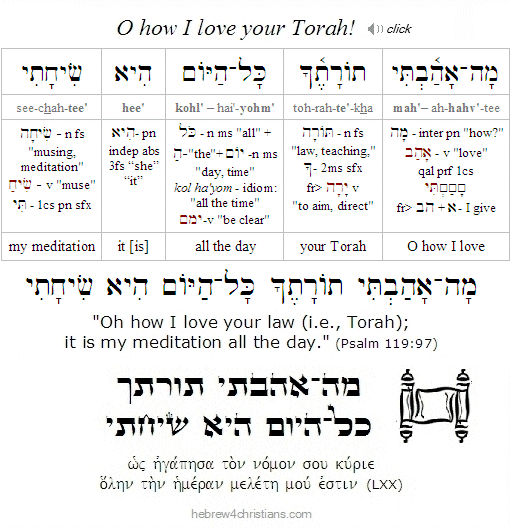 |
More Blessed to Give...

08.26.19 (Av 25, 5779) From our Torah portion for this week (i.e., parashat Re'eh) we read: aser te'aser: "You shall tithe..." (Deut. 14:22). Understand this as the great blessing of becoming a conduit of heavenly good to others. The sages say that giving tzedakah (צְדָקָה, i.e., "charity") to others is like a nursing mother. As long as she suckles her child, her milk supply is replenished and even increases; but once she weans the child, her supply dries up... So also when we give of our substance – the more we give, the more we will have; the less we give, the less we will have (Matt. 13:12). Therefore as our Lord taught us: "Give, and it will be given to you. Good measure, pressed down, shaken together, running over, will be put into your lap. 'Middah keneged middah' (מִדָּה כְּנֶגֶד מִדָּה) - for with the measure you use it will be measured back to you" (Luke 6:38). It is more blessed to give than to receive (Acts 20:35).
The Ineffable Name of God...
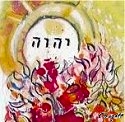
08.26.19 (Av 25, 5779) The "tetragrammaton," or the four-letter name YHVH (יהוה), is regarded as God's "proper name" in the Scriptures, though it is better to understand it as a metaphorical term (paronomasia) that points to God's ineffable and infinite essence (אין סוף). This is clearly taught in Torah and reaffirmed in the New Testament Scriptures. For instance when Moses asked for God's Name, God replied, ehyeh asher ehyeh (אֶהְיֶה אֲשֶׁר אֶהְיֶה), "I AM that I AM" (or "I will be what I will be"), abbreviated simply as ehyeh (אֶהְיֶה), "I AM" (Exod. 3:14). Note that God identified himself with Being itself, since ehyeh is the Qal imperfect form of the verb hayah (הָיָה), meaning "to be."
Indeed, the Name YHVH (יהוה) essentially means the "Eternal Presence," since God is called asher hayah, ve'hoveh, ve'yavo - "the One who is, and was, and is to come." In Hebrew: קָדוֹשׁ, קָדוֹשׁ, קָדוֹשׁ, יהוה אֱלֹהֵי צְבָאוֹת אֲשֶׁר הָיָה וְהֹוֶה וְיָבוֹא - "Holy, holy, holy, is the LORD God, the Almighty, who was and who is and who is to come" (Rev. 4:8). This "threefold Name" of the LORD of Hosts encompasses all possible states of being, indicating that God is LORD over all possible worlds... Amen. God's power and understanding are infinite (Psalm 147:5) and his Name is a mystery: "His eyes are like a flame of fire, and on his head are many crowns, and he has a name written that no one knows but himself" (Rev. 19:12).
So while the Scripture indeed states "the LORD is your name forever" (יהוה שִׁמְךָ לְעוֹלָם), the Hebrew can be read, "the LORD is your name for the world (i.e., לְעוֹלָם), indicating that it is a name accommodated for the language of mankind. Indeed the philosophical idea of a "name" implies "substance" and a definable essence, but the LORD transcends logical analysis and taxonomies. In this connection note that Yeshua taught us to simply regard God as "Abba," our Heavenly Father, likening the Infinite Mystery of Reality to that of a personal and loving providence. The LORD God is both "transcendent," that is, high above all we can ever fully know or describe, but He is also "immanent," that is, as close as our hearts and the breath from our lips (see Deut. 30:14). God's unsearchable greatness, power, and love extend to every possible world, unto the "breadth and length and height and depth" of all that exists, and that includes the inner recesses of your heart...
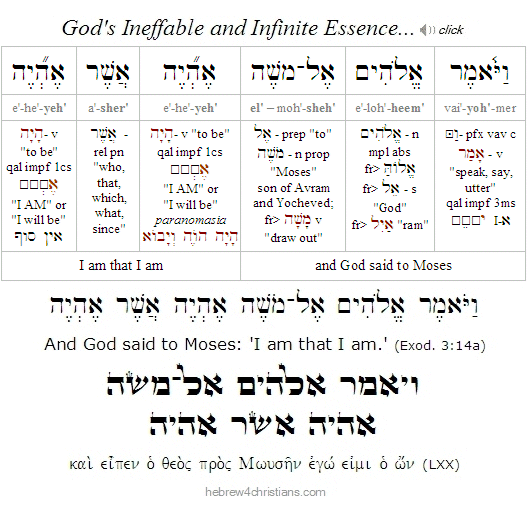 |
There are two places in the Torah when God explicitly revealed the meaning of the name YHVH (יהוה) to Moses. Both occurred at Sinai. The first occurred at the outset of Moses' ministry (at the burning bush when he was commissioned to be Israel's deliverer), and the second occurred after incident of the Golden Calf during the time of the revelation of the law at Sinai. It was only after Moses despaired and confessed the people's need for salvation that the LORD instructed him to meet him again at a place (i.e., makom: מָקוֹם) on the top of Sinai, where He would descend in the cloud to "declare His Name" (Exod. 33:17-34:7). This dramatic experience of revelation was later called middot ha-rachamim, or the revelation of the attributes of God's mercy, which prefigured the New Covenant...
Of the thirteen attributes that defined the meaning of YHVH as our merciful Savior, two are joined together. The LORD is rav chesed ve-emet (רַב־חֶסֶד וֶאֱמֶת), "abundant in lovingkindness and truth," indicating that his love is always a part of reality... In other words, just as God's Name means "presence" and "breath," it also means "compassion" and "love." As Yeshua said: "I am the Aleph and the Tav," says the LORD God (יְהוָה אֱלהִים), "the One who is and who was and who is to come, the Lord of Hosts (יְהוָה צְבָאוֹת)." Yeshua is the revelation of the Name of God, YHVH clothed in the flesh. As he testified to the Jewish people: "Most assuredly I say to you, before Abraham was, ehyeh: I AM" (John 8:58).
The sages ask: "Why is the Name of the Holy Blessed One called ehyeh asher ehyeh (אֶהְיֶה אֲשֶׁר אֶהְיֶה), 'I Am who I Am' (Exod. 3:14)? When one is remorseful and says, "I will return to the LORD and forsake my sin," the Blessed Holy One responds at that instant, saying 'I Am with you and will immerse you in my Presence' (Yitzchak of Peshischa). Indeed, God is our refuge and strength, our ever-present help (Psalm 46:1).
Note: Despite the fact that God is beyond all our understanding (Isa. 55:8-9), he graciously condescends to reveal himself to us in the person of Messiah and moves within us by the agency of the Ruach HaKodsh, or Holy Spirit. Yeshua taught us that the heart of God is like that of a good father, using the term Abba, a child's term of endearment for his daddy....
The Season of Teshuvah...

08.25.19 (Av 24, 5779) The last month of the Torah's calendar (counting from the month of Tishri) is called Elul (אֱלוּל), which begins Friday, August 30th at sundown this year (which is also a Shabbat). Traditionally, Rosh Chodesh Elul marks the beginning of a forty day "Season of Teshuvah" that culminates on the solemn holiday of Yom Kippur. The month of Elul is therefore a time set aside each year to prepare for the Yamim Nora'im, the "Days of Awe," by getting our spiritual house in order. During this season we make additional effort to repent, or "turn [shuv] toward God." In Jewish tradition, these 40 days are sometimes called Yemei Ratzon (יְמֵי רָצוֹן) - "Days of Favor," since it was during this time that the LORD forgave the Jewish nation after the sin of the Golden Calf (Pirke d'Reb Eliezar).
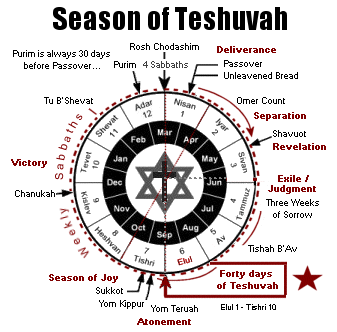 |
The advent of the month of Elul signals that Rosh Hashanah (i.e., Yom Teruah) will arrive in about five weeks (i.e., on Sunday, September 29th at sundown). During the time leading up to the High Holidays, it is customary to engage in cheshbon ha-nefesh ("soul searching") and to derive comfort that God is forgiving and loving to those who sincerely turn to Him. The Jewish sages chose the seven "Haftarot of comfort" to encourage us to make our hearts ready for the upcoming High Holiday Season.
Note that the word "Elul" (אֱלוּל) may be read as an acronym for the phrase,
ani le'dodi ve'dodi li (אֲנִי לְדוֹדִי וְדוֹדִי לִי), "I am my beloved's, and my beloved in mine"
(Song 6:3), to encourage to become full of desire for the Beloved of our soul...
Shuvah Yisrael ad Adonai Elohekha: "Return, O Israel, to the LORD your God..." (Hos. 14:1). The sages say you must return to the place where the LORD is your God -- that you receive his acceptance and love, and that you reclaim your status as his beloved child...
Rosh Chodesh Blessing...
The following Hebrew blessing can be recited to ask the LORD to help you prepare for the month of Elul and the forty day "Season of Repentance":
יְהִי רָצוֹן מִלְּפָנֵיךָ יהוה אֱלהֵינוּ
וֵאלהֵי אֲבוֹתֵינוּ שֶׁתְּחַדֵּשׁ עָלֵינוּ חדֶשׁ טוֹב
בַּאֲדנֵינוּ יֵשׁוּעַ הַמָּשִׁיחַ אָמֵן
ye·hee · rah·tzohn · meel·fah·ney·kha · Adonai · E·lo·hey·noo
vei·loh·hey · a·voh·tey·noo · she·te·kha·deish · ah·ley·noo · khoh·desh· tohv
ba'a·doh·ney·noo · Ye·shoo·a' · ha·mah·shee·akh · a·mein

"May it be Your will, LORD our God and God of our fathers,
that you renew for us a good month in our Lord Yeshua the Messiah. Amen."

Download Study Card
Blowing the Shofar...

Beginning on Rosh Chodesh Elul and continuing until the day before Rosh Hashanah, it is customary to blow the shofar (ram's horn) every day (except for Shabbat). This practice was adopted to help us awaken for the coming High Holidays....
The custom is to first blow tekiah (תְּקִיעָה), a long single blast (the sound of the King's coronation), followed by shevarim (שְׁבָרִים), three short, wail-like blasts (signifying repentance), followed by teruah (תְּרוּעָה), several short blasts of alarm (to awaken the soul), and to close with tekiah hagadol (תְּקִיעָה הַגָּדוֹל), a long, final blast:
 Listen to the Shofar Listen to the Shofar
The Blessing or the Curse...

08.25.19 (Av 24, 5779) Our Torah portion this week (i.e., parashat Re'eh) begins, "See (רְאֵה), I give before you today a blessing and a curse: the blessing (הַבְּרָכָה), if you obey the commandments of the LORD your God, which I command you today, and the curse (הַקְּלָלָה), if you ... turn aside from the way that I am commanding you today, to go after other gods that you have not known" (Deut. 11:26-28). We obtain God's blessing (i.e., berakhah: בְּרָכָה) when we obey the LORD, and our decision to obey manifests the blessed state of walking before the Divine Presence (the direct object marker et (את) before the word "the blessing" alludes to the blessings of "Aleph to Tav," that is from Yeshua, as described in Lev. 26:3-13). As King David said, "I have set (שִׁוִּיתִי) the LORD always before me..." (Psalm 16:8). David made a choice to "set" the LORD before his eyes, for he understood that opening his eyes to Reality was the only path of real blessing.
On the other hand, we obtain God's curse (i.e., kelalah: קְלָלָה) when we close our eyes and "forget" that the LORD is always present.... Suppressing God's truth invariably leads to idolatry, that is, to self exaltation. Note that the root word for the word "curse" (kalal) means to be treated as of little account, and therefore "ratifies" the rebellious heart's attitude toward God. This is middah keneged middah - we are ignored by the LORD as we ignore Him, just as we seen by Him when we truly seek His face (Isa. 55:6-7). So we see that the blessing or the curse really comes from our own inward decision, and God establishes the path we have chosen. As King David said, "God supports my lot" (Psalm 16:5), and Solomon wrote, "The heart of man plans his way, but the LORD directs his steps" (Prov. 16:9).
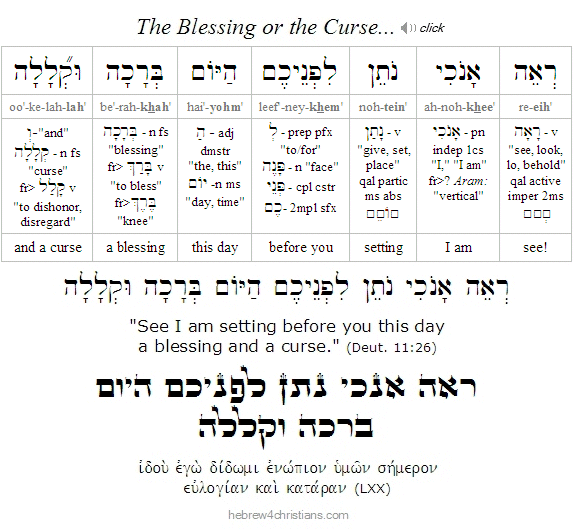 |
Note: "See, I am setting before you this day a blessing and a curse: the blessing, if you obey the commandments of the LORD your God, which I command you today, and the curse, if you do not" (Deut 11:26-28). Some of the sages say this admonition constitutes a severe reprimand of their immaturity. Forty years after receving the Torah at Sinai and the people still need to be cajoled like children with promises of rewards and threats of punishments? Those who are mature in their faith recognize good and evil for what they are: they seek the good because it is the way of truth and life. It is a sign of carnality to seek God because of the manna he provides rather than to seek him as the giver of life itself....
Haftarah: Aniyah So'arah (עֲנִיָּה סעֲרָה)
The weekly haftarah portion (i.e., reading from the Prophets) is usually thematically connected with the weekly Torah portion; however, beginning with the Fast of the Fourth month until the end of the Jewish year, the connection changes. First we always read three prophetic portions of rebuke leading up to the fast day of Tishah B'Av. Then, following Tishah B'Av, and for the next seven weeks leading up to Rosh Hashanah (i.e., the new year), we read selections of comfort that foretell of the future redemption of the Jewish people and the coming Messianic Era.
The third of the "Seven Weeks of Comfort" leading up to Rosh Hashanah is called Aniyah so'arah (i.e., עֲנִיָּה סעֲרָה, "O afflicted and storm-tossed one," Isa. 54:11-55:5), which reminds the Jewish people of God's eternal and unconditional covenant of peace. Indeed of the Jewish people it is said, "no weapon that is fashioned against you shall succeed, and you shall refute every tongue that rises against you in judgment." Therefore the LORD invites the people to drink from the waters of life: "Incline your ear, and come to me; hear, that your soul may live; and I will make with you an everlasting covenant (בְּרִית עוֹלָם), my steadfast, sure love for David (Isa. 55:3; Luke 1:68-75; Acts 13:34). Note. however, that when this Sabbath occurs on the New Moon of Elul, Isa. 66:1-24 is read instead.
Note: Rosh Hashanah will begin in about five weeks (i.e., Sunday Sept. 29th at sundown). During the time leading up to the High Holidays, it is customary to engage in cheshbon ha-nefesh ("soul searching") and to derive comfort that God is forgiving and loving to those who sincerely turn to Him. The Jewish sages chose the seven "Haftarot of comfort" to encourage us to make our hearts ready for the upcoming High Holiday Season.
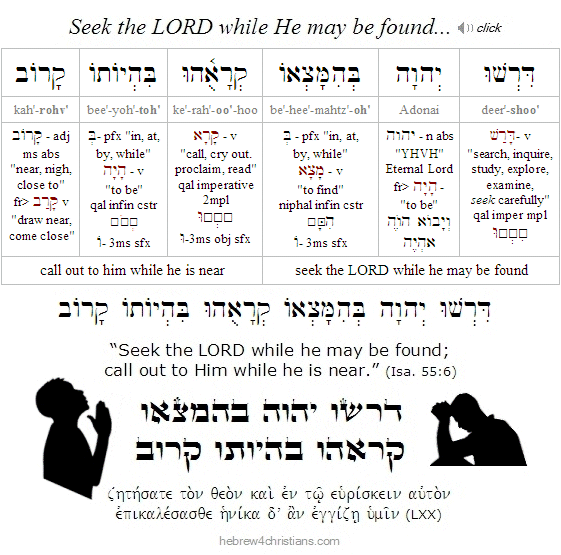 |
Seeing the Sacred...

08.23.19 (Av 22, 5779) From our Torah portion this week (i.e., parashat Eikev) we read: "And now, Israel, what does the LORD your God require of you, but to fear the LORD your God..." (Deut. 10:12). Every moment of life is an opportunity to ask the question: "How may I see the sacred here?" How may I revere and esteem the gift of life? How may I perceive the awe of God? Seize the moment and walk in God's way, today, now, and in this hour. Open your heart; renew your mind; turn to the light; find the sacred in your midst...
הוֹרֵנִי יְהוָה דַּרְכֶּךָ
אֲהַלֵּךְ בַּאֲמִתֶּךָ
יַחֵד לְבָבִי לְיִרְאָה שְׁמֶךָ
hoh·rei·nee · Adonai · dar·ke·kha
a·hal·leikh · ba·a·mee·te·kha
ya·kheid · le·vah·vee · le·yeer·ah · she·me·kha

"Teach me your way, O LORD,
that I may walk in your truth;
unite my heart to fear your Name"
(Psalm 86:11)

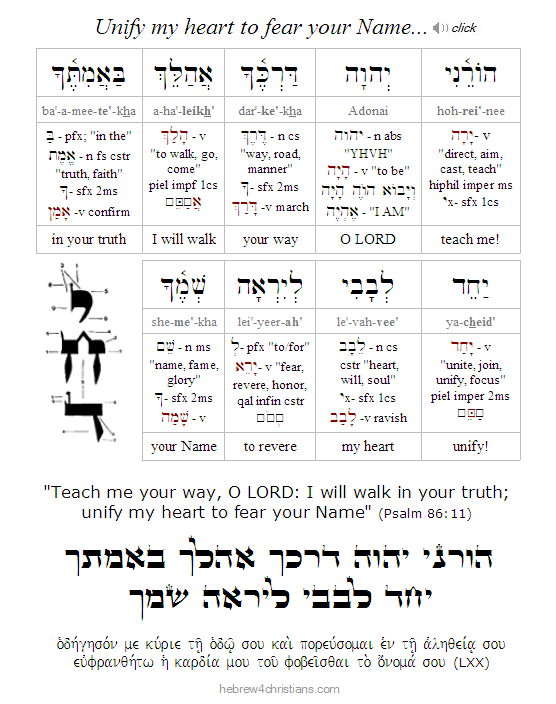
King David understood the great need for focus, for passion, for surrender: "One thing I ask of the Lord; that is what I will seek" (Psalm 27:4). Therefore he prayed for deep healing: "Teach me your way, O LORD, and I will walk in your truth; unite my heart to fear your Name" (Psalm 86:11). David understood that walking in the truth required "uniting his heart," or "repairing the breach" within his inner affections so that he could experience God's Presence... He needed emotional healing from inner wounds that split him off from reality. In effect, David prayed: "After You have healed my ambivalent heart, I will thank You with all my heart - entirely, wholly, completely - and I will glorify Your Name forever. My healing comes from Your great love (chesed) toward me, and through your love I am delivered free from the depths of hell" (Psalm 86:12-13).
Where it says, Ve'ahavta et Adonai be'khol levavkha – "you shall love the LORD your God with all your heart" (Deut. 6:5) that includes both your "good heart" and your "bad heart" – that is, all of you, all of your being, the whole person. Come as you are - broken, fragmented, divided within - and ask God to unify your heart by the miracle of his grace... Shabbat Shalom!
Danger of Forgetfulness...
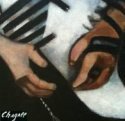
[ The following entry concerns this week's Torah reading, parashat Eikev... ]
08.23.19 (Av 22, 5779) The sages note: "Great is the power of forgetfulness, for it is also capable of causing you to forget the LORD your God, as it is written, "Guard yourself lest you forget the LORD your God by not keeping his commandments and his rules and his statutes, which I command you today" (Deut. 8:11). Therefore earnestly strive to remember and to retain the truth that has been entrusted to you: "Get wisdom; get insight; do not forget, and do not turn away from the words of my mouth" (Prov. 4:5).
קְנֵה חָכְמָה קְנֵה בִינָה
אַל־תִּשְׁכַּח וְאַל־תֵּט מֵאִמְרֵי־פִי
ke·neih · chokh·mah ke·neih · vee-nah
al-teesh-kach · ve·al-teit · mei·eem·rey·fee

"Get wisdom; gain insight; do not forget
and do not turn away from the words of my mouth.
(Prov. 4:5)

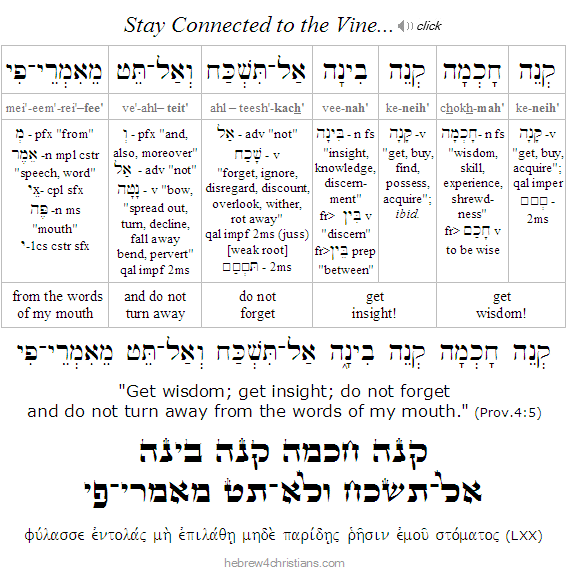
Note that the word "forget" comes from a root (שָׁכַח) that means to ignore or "wither," thus recalling the words of Yeshua: "I am the vine; you are the branches. Whoever abides in me and I in him, he it is that bears much fruit, for apart from me you can do nothing. If anyone does not abide in me he is thrown away like a branch and withers (ξηραίνω); and the branches are gathered, thrown into the fire, and burned" (John 15:5-6).
The Light of Truth...

08.23.19 (Av 22, 5779) In the Gospel of John it is recorded that Yeshua said, "I am the way, the truth, and the life" (i.e., ᾽Εγώ εἰμι ἡ ὁδὸς καὶ ἡ ἀλήθεια καὶ ἡ ζωή). The Greek word translated "truth" in this verse is aletheia (ἀλήθεια), a compound word formed from an alpha prefix (α-) meaning "not," and lethei (λήθη), meaning "forgetfulness." (In Greek mythology, the "waters of Lethe" induced a state of oblivion or forgetfulness.) Truth is therefore a kind of "remembering" something forgotten, or a recollecting of what is essentially real. Etymologically, the word aletheia suggests that truth is also "unforgettable" (i.e., not lethei), that is, it has its own inherent and irresistible "witness" to reality. In that sense light is a metaphor for truth: "The light shines in the darkness, and the darkness has not overcome it" (John 1:5). People may lie to themselves, but ultimately truth has the final word.
Greek scholars note that the word lethei itself is derived from the verb lanthano (λανθάνω), which means "to be hidden," so the general idea is that a-letheia (i.e., truth) is non-concealment, non-hiddenness, or (put positively) revelation or disclosure. Thus the word of Yeshua - His message, logos (λόγος), revelation, and presence - is both "unforgettable" and irrepressible. Yeshua is the Unforgettable One that has been manifest as the express Word of God (דְּבַר הָאֱלהִים). Yeshua is the Light of the world (אוֹר הָעוֹלָם) and the one who gives us the "light of life" (John 8:12). Though God's message can be supressed by evil and darkened thinking, the truth is regarded as self-evident and full of intuitive validation (see Rom. 1:18-21).
The Hebrew word for truth (i.e., emet: אֱמֶת) comes from a verb (aman) that means to "support" or "make firm." There are a number of derived nouns that connote the sense of reliability or assurance (e.g., pillars of support). The noun emunah (i.e, אֱמוּנָה, "faithfulness" or "trustworthiness") comes from this root, as does the word for the "faithful ones" (אֱמוּנִים) who are "established" in God's way (Psalm 12:1). A play on words regarding truth occurs in the prophet Isaiah: אִם לא תַאֲמִינוּ כִּי לא תֵאָמֵנוּ / im lo ta'aminu, ki lo tei'amenu: "If you are not firm in faith, you will not be firm at all" (Isa. 7:9; see Faith Establishes the Sign). Without trust in the LORD, there is no stability... Truth is something trustworthy, reliable, firm, or sure. In colloquial English, for example, this idea is conveyed when we say, "He's a true friend...", indicating that the loyalty and love of the person is certain. The familiar word "amen" likewise comes from this root. Speaking the truth (dibbur emet) is considered foundational to moral life: "Speak the truth (דַּבְּרוּ אֱמֶת) to one another; render true and perfect justice in your gates" (Zech. 8:16). Yeshua repeatedly said, "Amen, Amen I say to you...." throughout his teaching ministry to stress the reliability and certainty of God's truth (Matt. 5:18, 26, etc.). Indeed, Yeshua is called "the Amen, the faithful and true witness" (Rev. 3:14).
The relationship between the Hebrew and the Greek ideas seems to be that the revelation of God - the aletheia - is reliable and strong. The source for all truth in the universe is found in the Person and character of the God of Israel, blessed be He... The self-disclosure of the LORD is both unforgettable - both in the factual and moral sense - as well as entirely trustworthy. Aletheia implies that truth is something that should never be forgotten, and therefore we are regularly admonished not to "forget" the LORD (Deut. 8:11, Psalm 103:2), to "remember" his covenants, to "keep" his ways, to "guard" His precepts, and so on.
הַדְרִיכֵנִי בַאֲמִתֶּךָ וְלַמְּדֵנִי
כִּי־אַתָּה אֱלהֵי יִשְׁעִי
had·ree·khei·nee · va'a·mee·te·kha · ve·lam·me·dei·nee
kee - at·tah · E·lo·hey · yeesh·ee

"Lead me in your truth and teach me,
for You are the God of my salvation..." (Psalm 25:5)

Note: Thank God that followers of the Messiah are given the Ruach HaKodesh who brings to remembrance the words and truth of Yeshua, blessed be He, as it says in our Scriptures: ῾Ο δὲ παράκλητος, τὸ πνεῦμα τὸ ἅγιον, ὃ πέμψει ὁ πατὴρ ἐν τῷ ὀνόματί μου, ἐκεῖνος ὑμᾶς διδάξει πάντα, καὶ ὑπομνήσει ὑμᾶς πάντα ἃ εἶπον ὑμῖν (John 14:26).
Opening your Heart...

[ The following is related to our Torah reading for this week, parashat Eikev.... ]
08.23.19 (Av 22, 5779) Our Torah for this week (i.e., parashat Eikev) appeals for us to let go of our hurt and anger: "Circumcise (i.e., cut away) the barriers to your heart, and be no longer unresponsive to love" (Deut. 10:16). The metaphor of a "circumcised heart" (ברית מילה של הלב) symbolizes cutting away the outer covering of the heart so that it is "opened up" to feel once again. God wants us to let go of "hard feelings" so we can experience compassion (i.e., com+passion: "feeling-with") and sympathy for other people... Heart circumcision represents a radical turning away from the insular realm of the self toward the emotional realm of others and God. When our hearts are open, we are able to receive the flow of the Spirit of God and obey the "law of the Messiah" (תּוֹרַת הַמָּשִׁיחַ) to bear one another's burdens (Gal. 6:2).
וּמַלְתֶּם אֵת עָרְלַת לְבַבְכֶם
וְעָרְפְּכֶם לא תַקְשׁוּ עוֹד
oo·mal·tem · et · ohr·lat · le·vav·khem
ve·ohr·pe·khem · lo · tak·shoo · ohd

"Cut away the barriers to your heart,
and be no longer unresponsive to love."
(Deut. 10:16)

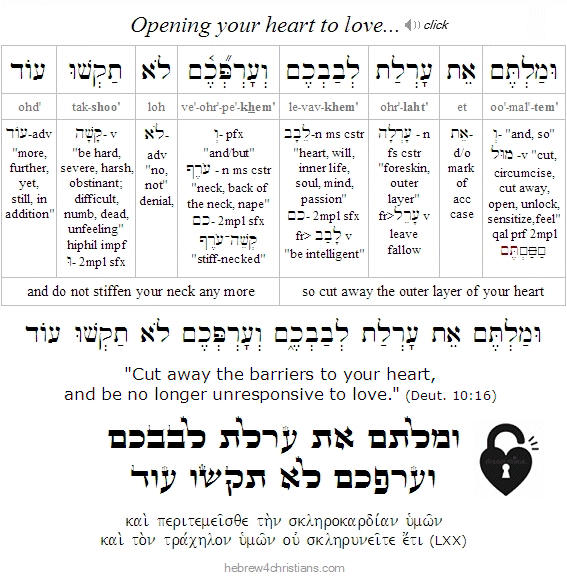
Physical circumcision represents a sign or mark of inclusion; it is a token that you are one of God's family, a Jew, though it is only a sign or token. Spiritual circumcision is an inner operation of the heart that marks you a true child of heaven. It is about your identity and purpose. Therefore we see the paradox that some physical Jews are not spiritual Jews, and some spiritual Jews are not physical Jews (though some are both), as the Apostle Paul said: For no one is a Jew who is merely one outwardly, nor is circumcision outward and physical. But a Jew is one inwardly, and circumcision is a matter of the heart, by the Spirit (ἐν πνεύματι), not by the letter. His praise is not from man but from God (Rom. 2:28-29).
Metaphorically speaking, a heart that is insensitive, indifferent, unfeeling, and callous toward the needs of others is "hard" or "uncircumcised." Often such hardness comes as a result of living in a fallen world. Many wounded people live with "scar tissue" that surrounds their heart, making them feel numb and unwilling to open up and trust others. Their affections have become disordered and they rationalize blaming others or seeking various forms of entitlement. "Turning off your heart" can mean suppressing any positive regard for others (empathy) while nurturing anger and self-righteousness, or it may mean withdrawing from others as a lifeless shell (both approaches vainly attempt to defend the heart from hurt). Although Yeshua always showed great compassion, especially to the wounded and broken in spirit (Isa. 42:3), He regularly condemned the "hardness of heart" (called "sclero-cardia," σκληροκαρδία) of those who resisted his message of healing and love.
A hard heart is closed off and impermeable to love from others, and especially from God. It is a "difficult" (קָשֶׁה) heart, inflexible and even cruel. Scripture uses various images to picture this condition, including a "heart of stone" (Ezek. 36:26, Zech. 7:12), an "uncircumcised heart" (Jer. 9:26), a "stiff neck" (Deut. 31:27), and so on. Stubbornness is really a form of idolatry, an exaltation of self-will that refuses to surrender to God. If you are wounded and afraid to open your heart in trust to others, ask God for healing...
Hardness of heart is something all of us deal with, even those who trust in Yeshua. After all, New Covenant believers are commanded to "put off the old self with its practices" (Col. 3:9) and are urged not to harden their hearts (μὴ σκληρύνητε τὰς καρδίας) through unbelief (Heb. 3:8,15, 4:7). May God's love help us keep our hearts soft and open toward others... May He give us a new heart, and put a new spirit within us. May He remove the heart of stone (לֵב הָאֶבֶן) from us and give us a heart of flesh (לֵב בָּשָׂר). May we be lev echad - "one heart" - with one another and with the Father (Ezek. 11:19). May we be so sensitized to the Presence of God that we detect the slightest touch from His hand upon us. Amen.
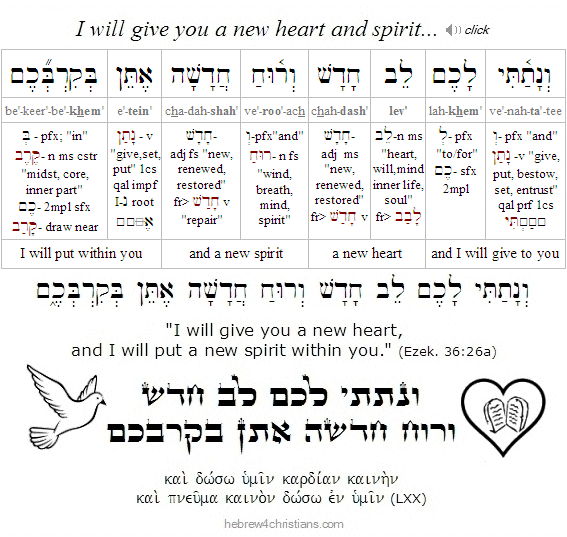 |
Seeing by Means of Light...
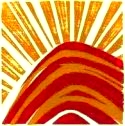
[ The following entry is indirectly related to our Torah for this week (Eikev) because it looks at the question of "fearing God" and seeing the sacred in our lives... ]
08.22.19 (Av 21, 5779) C.S. Lewis once made the helpful distinction between "looking at" and "looking along" a sunbeam (Lewis: "Meditation in a Tool Shed," 1945). In the former case the mind looks "at" the beam itself, from a supposedly "transcendental" perspective, as if it could objectively describe the thing in descriptive terms, as a "fact" or by reducing the phenomena to simpler, more "natural" terms (e.g., defining light as waves or particles or energy). In the latter case, the mind see "along" the beam in relationship with it, seeing by its means, as part of his horizon of experience, not focusing on it (as a fact) but experiencing other things through its agency, and interpreting them in a semantic world of interrelated meanings. Now Lewis' point was that modern scientific humanism assumes it provides a "truer" interpretation of experience by looking "at" things, as for example, when it "reduces" (i.e., explains away) religious experience as a matter of genetics, sociiology, psychology, or some other "natural" paradigm. Of course such a presupposition is without real warrant, since "looking at" something involves its own way of "looking along" the axis of assumptions hidden within its own methodology.... In short, there is no true "looking at" things as an independent observer, since everyone is affected by their own biases and assumptions they bring to experience. Such awareness should instill within every soul a deep sense of humility. Nevertheless, in questions of faith we are both look at and look along the contours of life to make inferences to the best explanation, and therefore as Lewis succinctly said, " 'I believe in Christianity as I believe that the sun has risen: not only because I see it, but because by it I see everything else.' We (all of us) walk by faith, not by sight, and the only real question is what direction are we looking...
"You can put this another way by saying that while in other sciences the instruments you use are things external to yourself (things like microscopes and telescopes), the instrument through which you see God is your whole self. And if a man's self is not kept clean and bright, his glimpse of God will be blurred - like the Moon seen through a dirty telescope." - C.S. Lewis: Mere Christianity
Grappling with Grace...

[ The following is related to our Torah reading for this week, parashat Eikev.... ]
08.22.19 (Av 21, 5779) I sometimes feel concern for people who are obsessed over technical questions regarding "Torah observance" (i.e., dietary law, Sabbath observance, ritual practices, etc.). Whenever the question of moral obedience comes up (as it invariably does in such discussions), it is helpful to recall the first and most basic commandment of all, i.e., the commandment to love the LORD with all our heart, soul, mind and strength. THAT is the starting point. Indeed, the very first of the Ten Commandments is אָנכִי יְהוָה אֱלהֶיךָ - Anochi Adonai Eloheykha: "I AM the Lord your God." Without this personal acceptance of the LORD as your God (i.e., your willingness to trust and to love Him), you simply cannot fulfill any of the commandments with the right inward intent. We must begin with the duty to love the LORD, and that means regarding him as lovable, wonderful, and the healer of all that is broken within us. The LORD heals the brokenhearted and binds up their wounds (Psalm 147:3). The "work of God" is to trust in the miracle of his love for you (John 6:29).
The term eikev (עֵקֶב) comes from the root akav (עָקַב, to "take by the heel"), as does the name Ya'akov (יַעֲקב, Jacob), who had "grabbed the heel" of his twin brother Esau while still in the womb of Rebekah. Ya'akov was later renamed Israel in commemoration of his grappling with Malakh Adonai (the Angel of YHVH) at Peniel. The Lord then declared to him, "Your name shall no longer be Ya'akov ("grappler") but Yisrael (יִשְׂרָאֵל), for as a prince (שַׂר, sar) you have striven (שָׂרִיתָ, sarita) with God and with men and have prevailed" (Gen. 32:28). The first occurrence of the root word appears in Genesis 3:15, where the LORD prophesied that although the Redeemer's heel (עָקֵב, akev) would be bruised, the very head (ראשׁ, rosh) of the serpent (satan) would be crushed.
Indeed, directly after the Akedah (the sacrifice of Isaac), the LORD said to Abraham, "in your offspring shall all the nations of the earth be blessed because (עֵקֶב) you have obeyed my voice" (Gen. 22:18). God blessed Abraham and his descendants because he grappled with the Voice of the LORD (YHVH). The great test of the Akedah centered on whether Abraham would accept the unconditional compassion of the LORD or if he would be tempted into seeking self-justification before God as Elohim (i.e, Judge). Ironically enough, Abraham's test was whether he would be "religious" or whether he would heed the compassionate intervention of the LORD... When the White Ram was caught in the thicket and sacrificed in Isaac's place, there was nothing left for Abraham to do other than accept God's gracious gift of love. Surrendering to God's love is the only genuine obedience, after all. "This is the work of God, that you believe in the one God has sent" (John 6:29).
Followers of Messiah are called to do works of healing and righteousness, as it is written: "For we are his workmanship, created in Yeshua the Messiah for good works that God purposed beforehand that we should do" (Eph. 2:10). The sages teach that we shouldn't put off performing acts of righteousness (e.g., tzedakah, visiting the sick, studying Torah, etc.) by thinking we can always do them at a later time; on the contrary, we should always regard the first opportunity presented to us as the only opportunity we might ever get. This is what is meant by the phrase "that I command you this day" (אֲשֶׁר אָנכִי מְצַוֶּה אֶתְכֶם הַיּוֹם). We should never trade a present opportunity for God's perfect will in our lives for a lesser good.... "Repent one day before you die..."
The call to love God with all our heart and soul might seem overwhelming, though we can heed the sages' advice, "It is not incumbent upon you to finish the task; yet you are not free to cease from it" (Avot 2:16). Though the Scriptures list a lot of commandments, all of these can be distilled to the all-encompassing principle of walking in love / לָלֶכֶת בְּאַהֲבָה (Eph. 5:2). "For in the Messiah Yeshua neither circumcision nor uncircumcision counts for anything, but only faith working through love" (Gal. 5:6). We can concentrate on heeding the immediate need of the hour. Walking in light of God's love - while not neglecting the "weightier matters" of the Torah: justice and mercy and faithfulness - ought to be the rule of faith in which we live (Matt. 23:23). This agrees with the New Testament's repeated focus that "love is the fulfillment of the Torah" / הָאַהֲבָה הִיא קִיּוּם הַתּוֹרָה (Rom. 13:10).
Note: For more on this, see "Grappling with Grace: Further thoughts on Eikev."
The Day is Drawing Near...
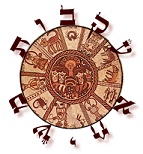
08.22.19 (Av 21, 5779) Jewish tradition has long held that human history (olam hazeh) would endure for 6,000 years - from the time of the impartation of the neshamah (soul) to Adam in the Garden of Eden to the coming of the Messiah. In a discussion from the Talmud, the 6,000 years of human history are divided into three epochs of 2,000 years each. The period of "tohu" occurred from the time of the fall of Adam until the call of Abraham; the period of "Torah" occurred from Abraham until the time of the destruction of the Second Temple, and the period of the "Messiah" refers to the time when the Messiah could appear before the Kingdom is established in Zion. The time immediately preceding the appearance of the Messiah will be a time of testing in which the world will undergo various forms of tribulation, called chevlei Mashiach (חֶבְלֵי הַמָּשִׁיחַ) - the "birth pangs of the Messiah" (Sanhedrin 98a; Ketubot, Bereshit Rabbah 42:4, Matt. 24:8). Some say the birth pangs are to last for 70 years, with the last 7 years being the most intense period of tribulation -- called the "Time of Jacob's Trouble" / עֵת־צָרָה הִיא לְיַעֲקב (Jer. 30:7).
 |
The climax of the "Great Tribulation" (צָרָה גְדוֹלָה) is called the great "Day of the LORD" (יוֹם־יהוה הַגָּדוֹל) which represents God's wrath poured out upon a rebellious world system. On this fateful day, the LORD will terribly shake the entire earth (Isa. 2:19) and worldwide catastrophes will occur. "For the great day of their wrath has come, and who can stand?" (Rev. 6:17). The prophet Malachi likewise says: "'Surely the day is coming; it will burn like a furnace. All the arrogant and every evildoer will be stubble, and that day that is coming will set them on fire,' says the LORD Almighty. 'Not a root or a branch will be left to them'" (Mal. 4:1). Only after the nations of the world have been judged will the Messianic kingdom (מַלְכוּת הָאֱלהִים) be established upon the earth. The remnant of Israel will be saved and the 1000 year reign of King Messiah will then commence (Rev. 20:4).
As for the exact timing of these events, "no one knows the day or hour." In fact, various Jewish sages have argued for "missing years" in the prophetic calendar (due to periods of exile or other factors) and therefore they say that the Day of the LORD may be delayed on account of national sins. For example, based on the gematria of the first two words of a verse from this week's parashah (i.e., וְהָיָה עֵקֶב, Deut. 7:12) Rashi explained that the 2,000 years of the Days of Messiah actually began 198 after the destruction of the Second Temple. "198 years after the destruction of the Temple the bells of the Messiah will be heard" (i.e., the days of the Messiah would begin). According to Rashi, the delay was the result of Israel's sin. (On the other hand, many ultra-Orthodox Jews believe they can "hasten" the Messiah's appearance through acts of teshuvah: "Mashiach Now!").
Note: Since Jewish eschatological tradition estimated that the "days of Messiah" would begin after 4,000 years of history (i.e., four "days"), or roughly 2,000 years after Abraham, we can better understand the Messianic fervor among the Jews during the first century in Judea. The Essenes were awaiting the advent of the "Teacher of Righteousness" and the "Zealots" wanted to establish the Kingdom of God by force of arms. Even the common people of Israel were full of expectation that the Messiah would soon appear to redeem captive Israel. It was in this context, in the "fullness of time" (Gal. 4:4), that Yeshua began His earthly ministry as the Suffering Servant who redeemed us from the "curse of the law" (Gal. 3:13).
כַּעֲבוֹר סוּפָה וְאֵין רָשָׁע
וְצַדִּיק יְסוֹד עוֹלָם
ka·a·vohr soo·fah ve'ein rah·sha
ve'tza·deek ye·sohd oh·lahm

"When the whirlwind passes, the wicked are no more,
but the righteous have an everlasting foundation."
(Prov. 10:25)

For more see: "As the Day Draws Near: Messiah and the Philosophy of History."
The Torah of Manna...

[ The following is related to our Torah reading for this week, parashat Eikev.... ]
08.22.19 (Av 21, 5779) "Remember the long way (כָּל־הַדֶּרֶךְ) that the LORD your God made you travel... to humble you and to test you (לנַסֹּתְךָ) by hardships to learn what was in your heart, whether you would keep the commandments or not. So he humbled you with hunger and then gave you manna to teach you that people cannot live on bread alone, but they will live by every word that comes from the mouth of the LORD" (Deut. 8:2-3, Matt. 4:4). So are you hungry, friend? Do you ever feel a sense of emptiness or an urge to fill some void within? So often we turn to "empty cisterns" in the vain hope that we will find some relief. God's answer is to turn to him for life - for the blessing of real sustenance for your soul.
We are given daily bread (לחם יומי) -- just enough to sustain us for this day. This teaches us to live one day at a time, trusting in God's provision and thanking him for the gift of life. The Torah of "manna" teaches us to trust God and to be thankful for his daily care. When you live each day as if it might be your last, the fear of the future fades away and you are free to live at peace in the moment. Therefore Yeshua taught us: "Don't be anxious about tomorrow, for tomorrow has its own troubles. Live one day at a time" (Matt. 6:34). Kierkegaard comments: "If there is no next day for you, then all earthly care is annihilated. When the next day comes, it loses its enchantment and its disquieting insecurity. If there is no next day for you, then either you are dying or you are one who by dying to temporality has grasped the Eternal, either one who is actually dying or one who is really living... The one who rows a boat turns his back to the goal toward which he is working. So it is with the next day. When, with the help of the Eternal, a person lives absorbed in today, he turns his back to the next day. The more he is eternally absorbed in today, the more decisively he turns his back to the next day." Amen. We walk by faith, not by sight (כי באמוּנה נתהלּך ולא בּראוּת עינים); we stand in the intersection between time and eternity, suspended between what is seen and what is unseen, and it is from there, from that place of struggle and exile that we call upon the name of the LORD, our Strong Tower in the midst of the flux of this passing realm (Prov. 18:10).
God who needs nothing, loves into existence wholly superfluous creatures in order that He may love and perfect them. He creates the universe already foreseeing ... the buzzing cloud of flies above the cross, the flayed back pressed back upon the uneven stake, the nails driven through the mesial nerves, the repeated incipient suffocation as the body droops, the repeated torture of back and arms as it is time after time, for breath's sake, hitched up. If I may dare the biological image, God is a 'host' who deliberately creates his own parasites; causes us to be that we may exploit and 'take advantage' of Him. Herein is love. This is the diagram of Love Himself, the Inventor of all loves. - C.S. Lewis: The Four Loves
The sages have said that in the world to come, all prayers will cease except for the offering of thanks to God for his sustaining love given in our Savior... Barukh atah Adonai Eloheinu, melekh ha'olam, she'asah li kol tzorki: "Blessed are you, LORD our God, sovereign of the universe, who meets all my needs. "My God will supply your every need according to his glorious riches in Yeshua the Messiah. לֵאלהִים אָבִינוּ הַכָּבוֹד לְעוֹלְמֵי עוֹלָמִים. אָמֵן -- May glory be given to God our Father forever and ever. Amen" (Phil. 4:19-20).
כִּי לא עַל־הַלֶּחֶם לְבַדּוֹ יִחְיֶה הָאָדָם
כִּי עַל־כָּל־מוֹצָא פִי־יהוה יִחְיֶה הָאָדָם
kee · lo · al-ha·le'·chem · le·va·do · yee·che·yeh · ha·a·dahm
kee · al-kol-mo·tza · fee-Adonai · yee·che·yeh · ha·a·dahm

"Man does not live on bread alone, but by everything that comes
from the mouth of the LORD does man live" (Deut. 8:3)

Hebrew Study Card
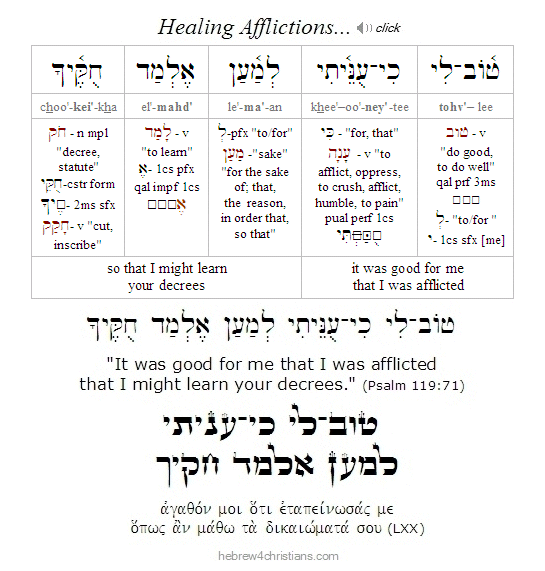
Teshuvah and Transformation

08.21.19 (Av 20, 5779) Our Lord taught that teshuvah (תְּשׁוּבָה), or "repentance," is more like spiritual rebirth than moral reformation: "Unless you are born from above (ἄνωθεν), you cannot see the kingdom of God" (John 3:3). This implies that we experience a radical shift in the way we "live and move and have our being" (Acts 17:28). The Greek word metanoia (μετάνοια) comes from a verb that means more than simply "changing your mind," but rather refers to the process of being transformed, or "metamorphosized," into a new kind of being -- like a worm that is changed into a butterfly that takes to the bright sky. Teshuvah, then, means turning (i.e., shuv: שׁוּב) to receive your new identity, your new life, in Messiah. To "repent" is to escape from the default mode of life to enter into a new realm of existence itself. It is an abandonment of the old life and nature – those self-serving assumptions driven by fear – so that we can walk in wonder and newness of life. So renew your minds, chaverim! Be young and tender at heart. Though the outer may self waste away, the inner self is divinely empowered and sustained for this very day and hour (2 Cor. 4:16; Psalm 73:26).
Our Good Shepherd...

08.21.19 (Av 20, 5779) The walk of faith is one of "holy suspense," trusting that God is on the other side of the next moment, "preparing a place for you" (John 14:3). In the present, then, we live in unknowing dependence, walking by faith, not by sight. For "hope that is seen is not hope; for who hopes for what he sees?" (Rom. 8:24). This is the existential posture of faith - walking in darkness while completely trusting in God's daily care. Our task at any given moment is always the same - to look to God and to accept His will. This is where time and eternity meet within us, where God's kingdom is revealed in our hearts. Therefore Yeshua taught us: "Don't be anxious about tomorrow, for tomorrow has its own troubles. Live one day at a time" (Matt. 6:34). It makes no sense to worry about the future if the LORD is the Good Shepherd who tenderly watches over your way (Psalm 23:1).
יְהוָה רעִי לא אֶחְסָר
בִּנְאוֹת דֶּשֶׁא יַרְבִּיצֵנִי
עַל־מֵי מְנֻחוֹת יְנַהֲלֵנִי
נַפְשִׁי יְשׁוֹבֵב
יַנְחֵנִי בְמַעְגְּלֵי־צֶדֶק לְמַעַן שְׁמוֹ
Adonai · roh·ee · loh · ech·sahr
bee·noht · de·she · yar·bee·tzei·nee
al-mei · me·noo·choht · ye·na·cha·lei·nee
naf·shee · ye·shoh·vev
yan·chei·nee · ve·ma·a·ge·lei · tze·dek · le·ma·an · she·moh

"The LORD is my shepherd; I shall not lack.
He makes me lie down in green pastures.
He leads me beside still waters.
He restores my soul.
He leads me in paths of righteousness for his name's sake."
(Psalm 23:1-3)

Hebrew Study Card
"Yea, though I walk through the valley of the shadow of death, I will fear no evil..." (Psalm 23:4). O God of Light, Light of the world, surely You know my need for light as I look to You, especially when darkness tries to extinguish my hope. Despite my inability to see you now, help me to know that you are with me; let "thy rod and thy staff comfort me" and lead me closer to you. Lord, when I am afraid, quicken the faith you have put within my heart. Be Thou my Shepherd in my darkness, O Lord my God...
The heart of faith senses the LORD's presence, even in the darkness, and hears the Spirit saying, "I am with you..." Love hopes all things and believes even in the midst of troubles.
I do not see the road ahead of me, I cannot know for certain where it will end. Nor do I really know myself, and the fact that I think I am following your will does not mean I am actually doing so. But I believe the desire to please you does in fact please you, and I hope I have that desire in all that I am doing. I hope that I will never do anything apart from that desire. And I know that if I do this you will lead me by the right road, though I may know nothing about it. Therefore, I will trust you always, though I may seem to be lost and in the shadow of death. I will not fear, for your are ever with me, and you will never leave me to face my perils alone. -- Thomas Merton: Seeds of Contemplation
"Who among you fears the LORD and hears (שָׁמַע) the voice of his Servant? Let him who walks in darkness and has no light trust in the Name of the LORD and rely on his God... I will lead the blind in a way that they do not know, in paths that they have not known I will guide them. I will turn the darkness before them into light, the rough places into level ground. These are the things I do, and I do not forsake them" (Isa. 50;10; 42:16).
Divine Light and Healing...
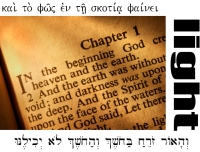
[ As I mentioned the other day, sometimes it can be helpful to use "non-linear" methods to consider Scripture, though of course we must first always read in context while using logic and the historical-grammatical method to ascertain the truth of God. The following, however, explores a bit of the "esoteric" side of understanding the words "light" and "healing" based on discussion of various Torah sages who have used gematria and other approaches to help elicit additional insight into the words. If you do not find this sort of thing helpful, please skip it! Shalom. ]
08.21.19 (Av 20, 5779) The Torah begins with the the famous words "in the beginning [God] created" (בראשׁית ברא) which some sages say can be read as "it was created for the head" (בראשׁ יתברא), referring first of all to the Messiah who is the head over all (Col. 2:10), but also to the intellect or mind that reflects the image of God. Recall that the first act of creation was that of light: "God said, 'Let there be light, and there was light" (Gen. 1:3). Now light itself is a mysterious thing - a "wave" or a "substance" depending on how you consider it - a connection between the spiritual and the physical realms.
In Hebrew light is called "ohr" (אור), a word formed from three letters Aleph (א), Vav (ו), and Resh (ר). The letter Aleph is the "father" of the Aleph-Bet, whose original pictograph represents an ox, symbolizing strength. It's numerical value is one and it is a silent letter. Aleph therefore is preeminent in its order and alludes to the ineffable mysteries of the oneness of God. Indeed, the word aluph (derived from the name of this letter) means "Master" or "Lord." Note that Aleph is formed from the letter Vav with two Yods (י), one ascending and the other descending. The gematria for these parts add up to 26 (Yod+Yod+Vav), the same number as the sacred Name YHVH (יהוה), also indicating a link between the "three-in-one" Aleph and God Himself. The letter Vav (ו) originally looked like a hook or nail, and in Biblical Hebrew it is used as connective prefix meaning "and." Symbolically Vav pictures a conduit or connection between heaven and earth. The letter Resh (ו), as mentioned above, represents the head, and by extension, intelligence, the mind (לֵבָב), comprehension, uncovering (ἀλήθεια), remembering, and revelation.
The Torah is called "light" in Prov. 6:23 (תּוֹרָה אוֹר), and the Word of God brings light to the heart as it says, "Your word is a light to my path" (Psalm 119:105) that "enlightens my eyes" (Psalm 19:8) and "imparts understanding" (Psalm 119:130). YHVH is called our light and our salvation (Psalm 27:1), just as Yeshua is the creative force of reality (John 1:1-3) who embodies the divine light to the world (John 8:12). Light is God's means of connecting with us through the heart, and divine healing comes from connecting with God through revelation - the "sun of righteousness (שֶׁמֶשׁ צְדָקָה) that shines with healing in his wings" (Mal. 3:20). Yeshua is the heart and healing center of existence who came to deliver people from darkness.
Now on the other hand the Hebrew verb chalah (חָלָה) means to be sick, from a root that means emptiness (חלל) and profanity (חֹל). To be sick can symbolically be understood as profane (ח) thinking (ל) regarding the Spirit of God (ה), which suggests that illness and disease result from obstruction of the divine light. Using the same sort of methodology we see that the Hebrew word for healing (רפא) can suggest that when the mind (ר) directs the mouth (פ) to praise God (א), the soul will experience shalom (שׁלום).
Since the words that are the "vessels" of Torah are themselves Torah, the same can be said of the letters that form them. That is why the Hebrew word for "word" (דּברֵ) also can mean "thing" or "matter," and words are regarded as spiritual substances (or molecules) composed from the more basic ideas expressed by the individual letters. Note further that the Hebrew word for letter is 'ot (אות), a word that means "sign" or "wonder" and that reveals Yeshua the Messiah as the Aleph and Tav, the beginning and the end, of all reality.
 |
Words within your heart...

08.21.19 (Av 20, 5779) "These words shall be within your heart" (Deut. 6:6). The midrash says that you may learn the entire Torah but if you have no fear of sin within your heart, you have nothing... You may have a great harvest with a thousand measures of wheat, wine, and oil, but if you have no storehouse in which to put them, what do you have? Likewise you may learn the whole of Scripture, with all its mysteries and truth, but only if you have the fear of sin within you will it truly be yours... Work out your salvation with fear and trembling, for it is God who is calling you both to will and to do his good pleasure (Phil. 2:12-13).
Gratitude and Spirituality...
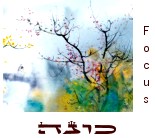
08.21.19 (Av 20, 5779) Expressing gratitude is a core value of genuine spirituality. "Modei ani," I thank you, God... Being thankful indicates that you are trusting that God is working all things together for your good, and it confesses that all you are is a gift from heaven. Indeed, the Hebrew word todah (תּוֹדָה), usually translated "thanks," can mean both "confession" and "praise." The matriarch Leah used a play on words regarding the birth of her fourth son (Gen. 29:35) when she said she would thank the LORD (אוֹדֶה אֶת־יהוה), and therefore she named him "Judah" (יְהוּדָה), from which the word "Jew" was later derived. The Apostle Paul, the greatest of the Torah sages, alluded to this when he said that a true Jew (יְהוּדִי) is one inwardly (κρυπτός), whose circumcision is a matter of spirit, not of the flesh. A genuine Jew gives thanks to God for who He is and what He has done; his desire is not for the approval of men, but of God (see Rom. 2:28-29).
Gratitude and Seeing...

08.20.19 (Av 19, 5779) From our Torah this week (i.e., parashat Eikev) we read: "And you shall bless the LORD your God for the good..." (Deut. 8:10). Whenever we derive benefit or enjoyment from something we are to bless (i.e., thank) God for his goodness. Indeed the Hebrew term for gratitude is hakarat tovah (הַכָּרַת טוֹבָה), a phrase that means "recognizing the good." The heart looks through the eye, and therefore how we see is ultimately a spiritual decision: "If your eye is "single" (i.e., ἁπλοῦς, sincere, focused)," Yeshua said, "your whole body will be filled with light" (Matt. 6:22). When we see rightly, we are awakened to God's Presence in the little things of life, those small miracles and "signs and wonders" that constantly surround us. The good eye of faith sees hundreds of reasons to bless God for the gift of life (1 Cor. 10:31; 1 Thess 5:18; Psalm 103:1-5). The LORD is "enthroned among the blessings of His people" (Psalm 22:3).
The thank offering mentioned in the Torah (i.e., zevach ha-todah: זֶבַח הַתּוֹדָד) reappears in the New Testament. In the Book of Hebrews were are instructed to "continually offer up a sacrifice of thanks (זֶבַח תּוֹדָה) to God, that is, the fruit of lips that acknowledge his Name" (Heb. 13:15). It is interesting to note that the Greek verb used to "offer up" (i.e., ἀναφέρω) is used to translate the Hebrew verb "to draw near" (karov) in Leviticus. In other words, the "offering up of thanks" for the sacrifice of Yeshua functions as "korban" and draws us near to God. Thanking God for personal deliverance constitutes "right sacrifices" (זִבְחֵי־צֶדֶק) as we draw near to God in the blessing of His love (Psalm 4:5; Heb. 7:19).
"Give thanks to the LORD for He is good; his love endures forever" (Psalm 136:1); "give thanks to the LORD always" (Col. 3:17; Eph. 5:20; 1 Thess. 5:18)... Gratitude is foundational to our lives as followers of Yeshua. Indeed there are really only two prayers we ever offer to God, namely "Help, LORD!" and "Thank you, LORD." Meister Eckhart once remarked that if the only prayer you said in your entire life was, "thank you," that would suffice... Genuine prayer ultimately resolves to an expression of thanks. We are to "praise the Bridge that carries us over" into the Presence and Love of God, and that Bridge is Yeshua our Lord.
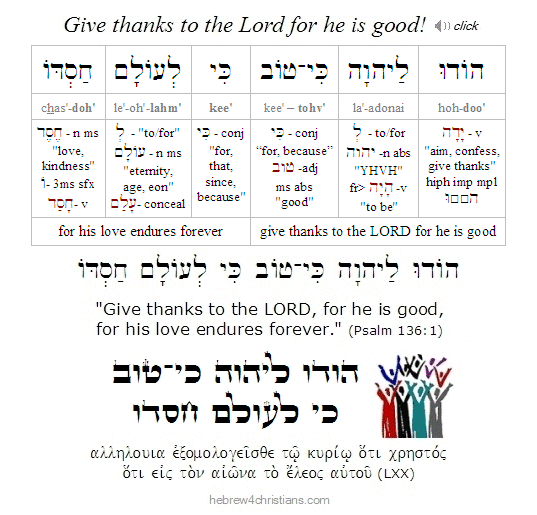 |
The first matter to be thankful for is the blessing for your existence itself. Rabbi Bunim would begin his teachings with these words: "We thank you, who are blessed and who are the source of all blessing, that you are manifest and hidden. Then he continued: "A fearless man must feel God as he feels the place on which he stands. And just as he can't imagine himself without a place to stand on, so he must in all simplicity grow aware of God who is the place (ha'makom) of the world and comprises it. But at the same time he must know that He is the hidden life that fills the world" (quote from Buber: Collected Hasidic Sayings).
Remember all the way...

08.20.19 (Av 19, 5779) From our Torah reading this week (i.e., parashat Eikev) it is written: "Remember all the way (וְזָכַרְתָּ אֶת־כָּל־הַדֶּרֶךְ) that the Lord your God has led you..." (Deut. 8:2). We learn what is in our hearts by being tested in the dry places. "From the day you left Egypt... you have been rebellious against God" (Deut. 9:7). Moses' rebuke was meant to awaken the people, to encourage them to search their hearts and confess who they were. Self-examination is essential for us to return to God, for otherwise we continue the cycle of pride-shame that binds us. We can't learn to walk as children of God until we are free of the need to defend ourselves. We come to the cross "just as we are," full of brokenness and need, confessing "salvation is of the LORD." Ve'zakharta et kol ha'derekh - remember this "all the way" of our sojourn... God knows the whole way that you have come, and he is refining your heart for your ultimate good (Jer. 29:11).
The Whole Commandment...

[ The following is related to our Torah reading for this week, parashat Eikev.... ]
08.20.19 (Av 19, 5779) "The whole commandment that I am commanding you this day you shall observe and do, so that you may live..." (Deut. 8:1). The Hebrew phrase kol ha'mitzvah (כָּל־הַמִּצְוָה), here translated as "the whole commandment," refers to the heart attitude, or the inner passion of the soul. Some have linked the word "commandment" (מִצְוָה) with the word "connection" (צוותא), suggesting that God's commandments are the means by which we cleave to Him, as is written: "this is the love of God (אַהֲבַת אֱלהִים), that we keep his commandments" (1 John 5:3). The commandments are "for life" (Lev. 18:5), which means they serve as the call of the Beloved to rise to something far greater...
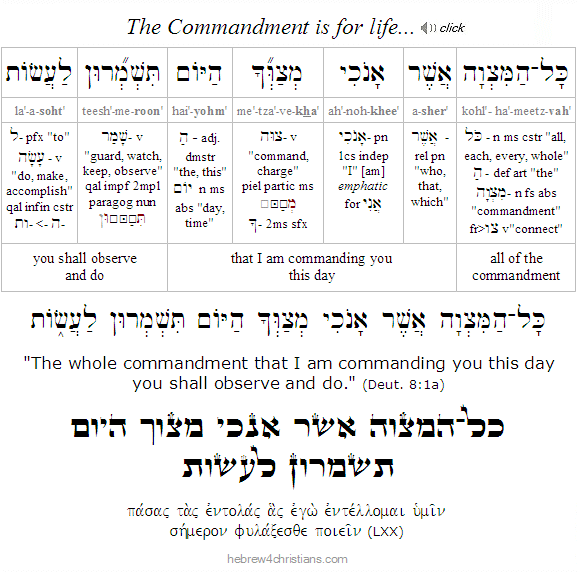 |
The "whole commandment" is to walk in God's love. As it is written, tamim yiyeh im Adonai Elohekha: "You shall be wholehearted with the LORD your God" (Deut. 18:13), and "Fear God and keep his commandments - כִּי־זֶה כָּל־הָאָדָם - for this is the whole man" (Eccl. 12:13).
The Kotzker once said, "The prohibition against making idols includes the prohibition against making idols out of the commandments. We should never imagine that the whole purpose of the Torah is its outer form, but rather the inward meaning." Indeed, sacrificial blood was placed over the tablets of the law (i.e., the blood sprinkled on the kapporet, or the "crown" of the Ark) that represented God's forgiveness and atonement for sin. The life is "in the blood," which represents God's passion, the deepest truth of Torah. And this is the message of the gospel itself, of course, since the blood of Yeshua passionately shed for our sake has opened up a new and everlasting way for us to be rightly related to God (Heb. 9:12).
Believing in Love...

08.19.19 (Av 18, 5779) In our Torah portion this week (i.e., parashat Eikev) we read: "But now, Israel, what does the LORD your God ask from you ... but to love him with all your heart and with all your soul?" (Deut. 10:12). But how are we able to love God be'khol levavka (בְּכָל־לְבָבְךָ) – "with all our heart" – and be'khol nafshekha (וּבְכָל־נַפְשֶׁךָ) - "with all our soul," apart from healing of the brokenness that makes our hearts divided and sick? That is what the redemption from Egypt was about: we were personally chosen by God, redeemed by his grace, led out from from cruel bondage, only to be led into the desert, away from the world, where we slowly began to understand that we were valued, cared for, and beloved of God. We believed in the possibility of promise, of covenant... Only then could we hear the request from heaven: "Now love Me..." In other words, we can only truly love God by knowing we are beloved by God, and the invitation to love him is a response of his great passion for you (1 John 4:19). Accept that you are accepted in the heart of the Beloved (Eph. 1:4-6).
What the LORD asks from us is humanly impossible, since the human heart is unable to truly love and serve the LORD apart from intervening grace (Eph. 2:1-10). The real miracle of faith is found in a transformed heart. It is never a question of "willpower" or the "zeal" of man; no - it is never a question of what I can do but rather what God can do (John 1:13).
דֶּרֶךְ־מִצְוֹתֶיךָ אָרוּץ
כִּי תַרְחִיב לִבִּי
de'·rekh -meetz·vo·tey'·kha · a·rootz
kee · tar·cheev · lee·bee

"I will run the way of your commandments,
for you enlarge my understanding."
(Psalm 119:32)

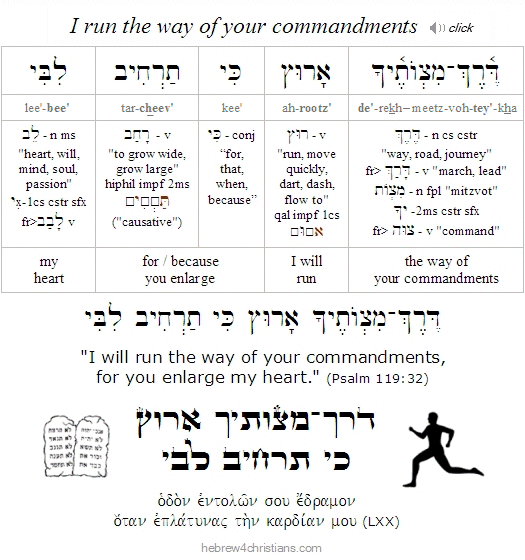
We love because He loves us (and we receive and accept that love). It is the strength of his love that keeps you, not the strength of your own... Nevertheless it seems to be the pattern of God's grace to bring affliction and trouble into our lives so that we will begin to seek the Presence of God (i.e., the "troubles of love"). We all are delivered from Egypt by the blood (i.e., the love) of God in the tribulation of hard exile. After all, how many of us came to know the LORD apart from the pain that comes from apprehending our own slavery to inner brokenness? Indeed it is a "severe mercy." Therefore our Savior says: "Truly, truly, I say to you, unless a grain of wheat falls into the earth and dies, it remains alone; but if it dies, it bears much fruit" (John 12:24). The hard "outer shell" of the seed must be broken so that the life of the Spirit can come through... The commandment to love the LORD, then, only finds its voice after we come to faith, after we experience the Holy Spirit's power, indeed, after we are made alive from the dead.
For more on this, see "Blessings and Brokenness."
Grappling with Faith...

08.19.19 (Av 18, 5779) Our Torah reading for this week is called "Eikev" (עֵקֶב), a word often translated "because," though it literally means "heel," and therefore recalls Jacob (יעקב) the "heel-holder" who wrestled with the pain of his past to learn to bear the name Israel (יִשְׂרָאֵל), the "prince of God" (Gen. 32:28)... Like Jacob, we must grapple to believe that the covenant of God's love and acceptance is meant for us, too... The Sassover rebbe reads the opening verse of our Torah portion, "And it shall be because you listen..." (וְהָיָה עֵקֶב תִּשְׁמְעוּן) as, "and it shall be when your heel is ready to take a step, you will listen to your heart." This is the step of faith. As you walk with God, you will come to know yourself as a child of the great King. Regarding the related verse, "Because Abraham heard my voice" (עֵקֶב אֲשֶׁר־שָׁמַע אַבְרָהָם בְּקלִי), the sages read, "Abraham heard the word 'down to his heel.'" Like Abraham, we will hear God's voice as we walk with him by faith (John 13:7).
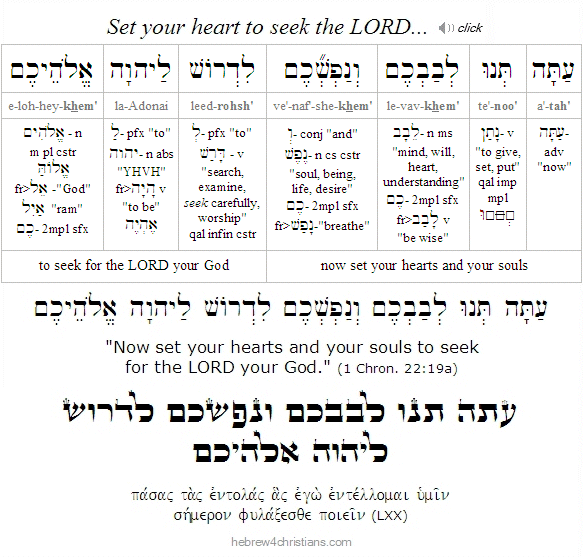 |
Parashat Eikev - עקב

[ The Torah reading for this week is parashat Eikev, which is traditionally read during Shabbat Va'tomer, the second "Sabbath of Consolation" after Tishah B'Av.... ]
08.18.19 (Av 17, 5779) In our Torah reading for this week (i.e., parashat Eikev), Moses continues his farewell address to Israel by saying, "And because (עֵקֶב) you listen to these rules and keep and do them, the LORD your God will keep with you the covenant and the love that he swore to your fathers" (Deut. 7:12). Note that the word eikev (עֵקֶב), often translated "because," literally means "heel," which recalls Jacob (יעקב) the "heel-holder" who wrestled with the pain of his past to learn to bear the name Israel (יִשְׂרָאֵל), the "prince of God" (Gen. 32:28)... And like Jacob, we must grapple to believe that the covenant of God's love and acceptance is for us, too... The Sassover rebbe interpreted the opening verse of our Torah portion, "And because you will listen..." (וְהָיָה עֵקֶב תִּשְׁמְעוּן) as, "and it shall be when your heel is ready to take a step, you will listen to your heart." This is the step of faith. As you begin to walk with God, you will come to know yourself as a child of the great King. Likewise regarding the related verse in the Torah, "Because Abraham heard my voice" (עֵקֶב אֲשֶׁר־שָׁמַע אַבְרָהָם בְּקלִי), the sages read, "Abraham heard the word 'down to his heel'" (Gen. 26:5). Like Abraham, we will hear God's voice as we walk with him by faith...
עֵץ־חַיִּים הִיא לַמַּחֲזִיקִים בָּהּ
וְתמְכֶיהָ מְאֻשָּׁר
eitz - cha·yeem · hee · la·ma·cha·zee·keem · bah
ve·to·me·khey'·ha · me·oo·shar

"A tree of life is Torah to those who lay hold of it;
those who grasp it are called blessed"
(Prov. 3:18)

Hebrew Study Card
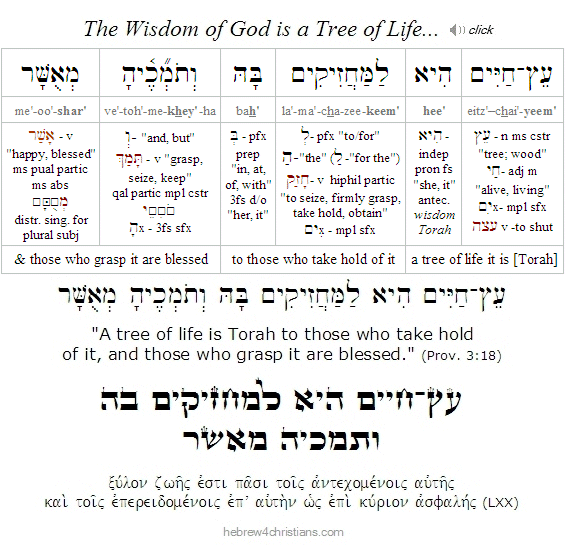
The portion begins: "ve'hayah eikev..." (Deut. 7:12). Here translators differ about how to understand the Hebrew. The JPS version, for instance, renders this as "and if you listen," whereas others render it as, "and because you listen..." The former translation makes the blessing seem conditional upon obedience, whereas the latter reading affirms the obedience that leads to blessing... The Hebrew word eikev (i.e., עקב, "heel," "step"), however, refers to action, and therefore it may be regarded as a prophecy expressing faith that the blessing which God swore on oath will be fulfilled. May it be so for us, chaverim...
Countdown to Rosh Hashanah...

08.18.19 (Av 17, 5779) The weekly haftarah portion (i.e., the weekly reading from the Prophets) usually is thematically connected with the weekly Torah portion; however, after the fast of Tishah B'Av, and for the next seven weeks (49 days) leading up Rosh Hashanah (i.e., the new year), we read selections of comfort that foretell of the future redemption of the Jewish people and the coming Messianic Era of Yeshua. In other words, we have a seven-week period of consolation, encouraging us to keep our hope alive, culminating in the "jubilee" of the Jewish new year.
Seven Weeks of Comfort:
- Nachamu, Nachamu Ammi ("Comfort, comfort, my people") - Isa. 40:1-26
- Va'tomer Tzion ("But Zion said...") - Isa. 49:14-51:3 (this week)
- Aniyah So'arah ("O afflicted and storm-tossed") - Isa. 54:11–55:5
- Anochi, Anochi hu ("I, even I am He...") - Isa. 51:12–52:12
- Rani Akarah ("Sing, O Barren one...") - Isa. 54:1–10
- Kumi Ori ("Arise and shine...") - Isa. 60:1–22
- Sos Asis ("I will greatly rejoice...") - Isa. 61:10–63:9
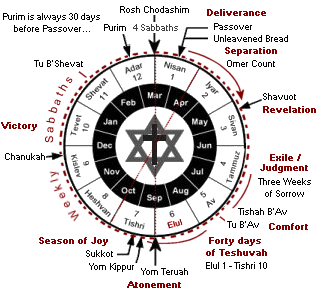 |
Regarding the theme of the consolation given in these haftarot, the Midrash suggests that "the sages established that the first of these haftarot would be "Comfort, comfort My people" – as though Hashem is commanding the prophets to comfort His nation. To this Knesset Yisrael responds: "And Tzion says, 'Hashem has abandoned me' – i.e., she is not consoled by the comfort of the prophets... And where the haftorah is "a stormy afflicted one who will not be comforted," it is as if the prophets once again declare before the Holy One: See, Knesset Yisrael is not appeased with our consolations. Therefore the Holy One Himself again speaks: "I, I am your comforter," and then He says, "Rejoice, O barren one who has not given birth," and also "Arise and shine, for your light has come." To this, Knesset Yisrael responds: "I shall surely rejoice in Hashem" – as if to say, now I have reason to rejoice and to be joyful, "My soul will rejoice in my God for He has dressed me in garments of salvation" (Orach Chaim).
Shabbat Va'tomer Tzion
The second of the "Seven Weeks of Comfort" leading up to Rosh Hashanah is called Va'tomer Tzion (וַתּאמֶר צִיּוֹן, "But Tzion said..."), which reminds us to never to lose hope for the heavenly future of Zion (Jerusalem).... "Can a woman forget her nursing child, that she should have no compassion on the son of her womb? Even these may forget, yet I will not forget you. Behold, I have engraved you on the palms of my hands; your walls are continually before me" (Isa. 49:15-16). The Haftarah concludes by Isaiah saying that the LORD will comfort the Mountain of Zion by making it like the Garden of Eden, with joy and happiness within her, along with thanksgiving and the sound of song.
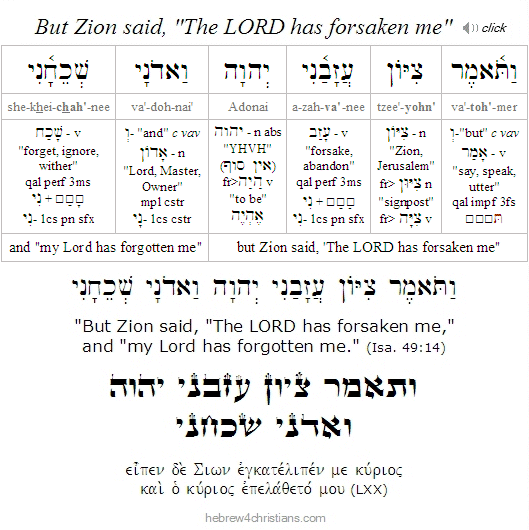 |
Note: The month of Elul begins in about two weeks (i.e., on Friday, August 30th this year), which initiates the 40 day period of preparation for the Jewish High Holidays. This means that Rosh Hashanah will begin in about six weeks (i.e., Sunday, September 9th at sundown). During the time leading up to the High Holidays, it is customary to engage in cheshbon ha-nefesh ("soul searching") and to derive comfort that God is forgiving and loving to those who sincerely turn to Him. The sages chose the seven "Haftarot of comfort" to encourage us to make our hearts ready for the upcoming High Holiday Season.
Fear thou not...

08.16.19 (Av 15, 5779) Most of us understand that loving God is our essential obligation, the end or "goal" of all the other commandments, the very reason why God has spoken and why we exist. Yeshua plainly taught that this was the point of "the Torah and the prophets," the rest being commentary (Matt. 7:12, Matt. 22:36-40). However, while love is our greatest duty - the yoke of heaven - you might be surprised to learn that the most frequent commandment is simply al-tirah, "Be not afraid." Over and over again in the Scriptures we hear the LORD saying to those who trust in Him, al tira, "be not afraid."
אַל־תִּירָא כִּי עִמְּךָ־אָנִי
אַל־תִּשְׁתָּע כִּי־אֲנִי אֱלהֶיךָ
אִמַּצְתִּיךָ אַף־עֲזַרְתִּיךָ
אַף־תְּמַכְתִּיךָ בִּימִין צִדְקִי
al · tee·rah · kee · ee·me·kha · ah·nee; al · teesh·tah · kee · ah·nee · E·loh·hey·kha
ee·matz·tee·kha · af - a·zar·tee·kha; af - te·makh·tee·kha · bee·meen · tzeed·kee

"Fear not, for I am with you; be not dismayed, for I am your God;
I will strengthen you, I will help you, I will uphold you with my righteous right hand."
(Isa. 41:10)

Hebrew Study Card
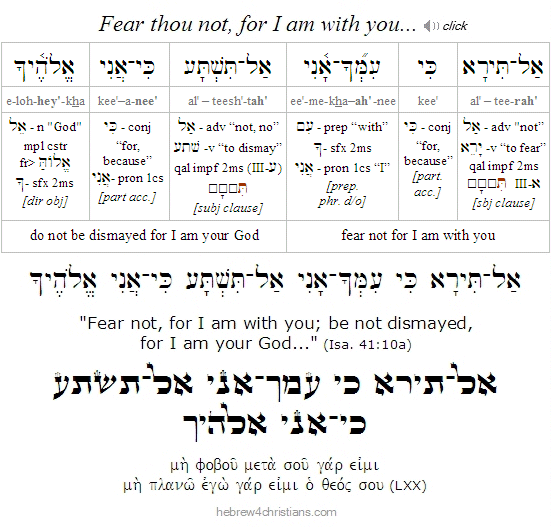
This is a word for the exiles of every age: Be not afraid - al-tirah – not of man, nor of war, nor of tribulation, nor even of death itself (Rom. 8:35-39). If God be for us, who can be against us? Indeed, Yeshua came to die to destroy the power of death "and to release all those who through fear of death were subject to lifelong slavery" (Heb. 2:14-15). The resurrection of the Messiah is the focal point of history - not the "dust of death." Death does not have the final word. Indeed, because Yeshua is alive, we also shall live (John 14:19). Because of Yeshua's victory, we can now live without fear: al-tirah, "Be not afraid, it is I." "There is no fear in God's perfect love," as the Apostle John wrote (1 John 4:18). If we love God because He first loved us (1 John 4:19), then we find courage because of the heart He imparts to us... God will uphold you – even in the trials of your faith.
Of course this doesn't mean that we should pretend that evil doesn't exist or that there's no real danger in this world. No, the Scriptures are clear that there are spiritual enemies in the world and we are engaged in a genuine spiritual war (1 Pet. 5:8-9; Eph. 6:10-18). Indeed every day the media attempts to frighten us by broadcasting lies and fearmongering propaganda. We must fight these messages of fear by remembering the truth and promises of God; we must never fear mere men but rather the LORD our God, who is our Maker, our King, and our Redeemer. We must train our minds to see beyond mere appearances, to ignore the messages of this dark world, and to look for God's Presence in everything.
יְהִי־חַסְדְּךָ יְהוָה עָלֵינוּ
כַּאֲשֶׁר יִחַלְנוּ לָךְ
ye·hee · chas·de·kha · Adonai · a·ley·noo
ka·a·sher · yee·chal·noo · lakh

May your chesed, O LORD, be upon us,
as we wait for You (Psalm 33:22)

Download Study Card
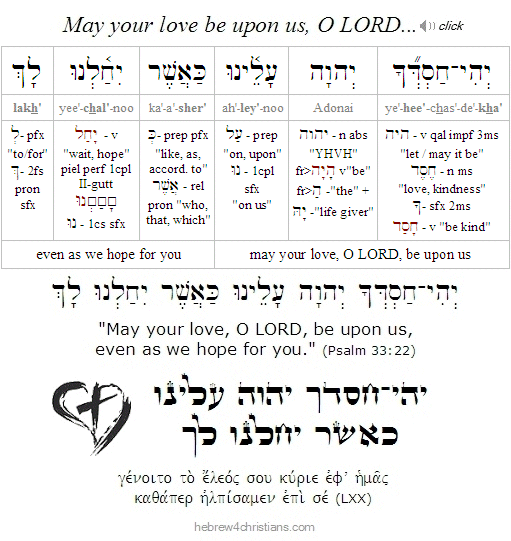
We must trust in the LORD and His care for our lives, which always comes "as we hope" in Him... May it please God to impart to each us the courage that comes from Heaven itself. May He help us not to live in fear, but rather to walk in faith, full of confidence. So remember: al-tirah, "be not afraid!" Let us be strong and be strengthened in Yeshua our King.
The Seeking Savior...

08.16.19 (Av 15, 5779) "Those who are well have no need of a physician, but those who are sick" (Matt. 9:12). Even though we are weak, sickly, broken, and sinful people, we must never lose hope and begin to fear that we do not belong to the Kingdom of the Messiah... Indeed, our infirmities are often a blessing in disguise, a gift that reveals our need... If you are sinful and sick, you are invited to come before the Master for life and rescue from the power of sin. Take your place among the lepers, the tax collectors, the outcasts... you will never hear Him criticize you or shame you for sincerely coming to Him for healing of your sinful state... "For the Son of Man came to seek and to save the lost" (Luke 19:10). Yeshua is the Good Shepherd (הָרעֶה הַטּוֹב) who leaves his flock of 99 sheep in order to find the one sheep who is lost (Matt. 18:12-14). He is always like that – He is always seeking and saving the lost sinner; He is always offering life and healing to those who have been made sick with the plague of sin. Thank God we have a Savior who seeks us out in our desperate need!
לְכוּ וְנָשׁוּבָה אֶל־יְהוָה
כִּי הוּא טָרָף וְיִרְפָּאֵנוּ
יַךְ וְיַחְבְּשֵׁנוּ
le·khoo · ve·na·shoo'·vah · el-Adonai
kee · hoo · ta·raf · ve·yeer·pa·ei'·noo
yakh · ve·yach·be·shei'·noo

"Come, let us return to the LORD;
for he has torn, but he will heal us;
he has smitten, but he will bind us up."
(Hosea 6:1)

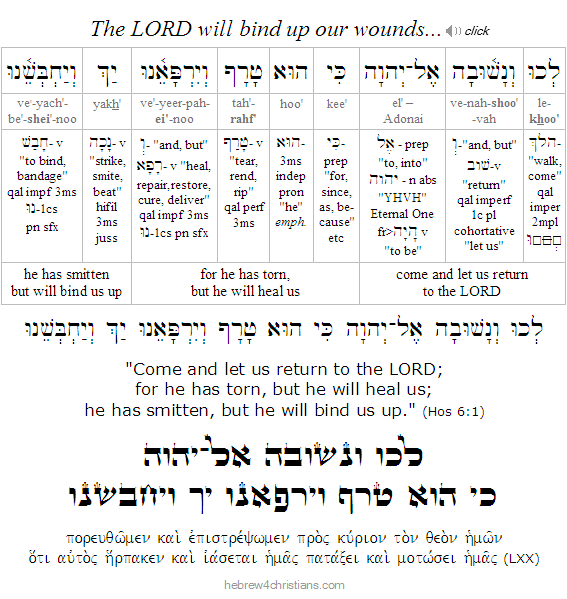
King David wrote, "You have given those who fear you a banner (נֵּס לְהִתְנוֹסֵס) for the sake of the truth" (Psalm 60:4), which Rashi interprets as, "You have given hardships and suffering to those who fear you to elevate them in the way." Indeed the word nes (נֵּס) can mean "banner" (as on the mast of a ship), a "sign" (or miracle), or a "test" (nisayon). God tests those who fear Him in order to help them become a miraculous sign to the world at large. Ultimately, the sign or miracle is the gift of Messiah's suffering on our behalf and His resurrection for our justification (Isa. 11:10). Even in the face of our enemies who have breached the land, we have the promise of victory in Adonai Nissi (יְהוָה נִסִּי), God my Miracle.
May you, broken and contrite one, hear the word of His hope calling out for your soul... He is your Shepherd, your Healer, and your Miracle. May you come beneath His banner of truth and love to find eternal refuge....
Cleaving to God...
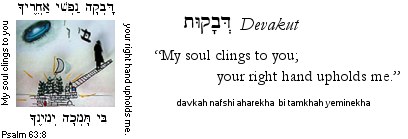
[ The following concerns this week's Torah reading, parashat Vaetchanan, which is always read on the Sabbath following Tishah B'Av... Nachamu, nachamu... ]
08.16.19 (Av 15, 5779) Our Torah portion this week says: "But you who have cleaved to the LORD your God are all alive today" (Deut. 4:4). The Hebrew word devakut (דְּבָקוּת) means "cleaving" and refers to communion with God. This word comes from the root word davak (דָּבַק), meaning to "cling" or "stick" (the Modern Hebrew word for "glue" is devek (דֶבֶק) which also comes from the same root). The sages comment that we can cleave to God only one day at a time. As Yeshua said: "Take therefore no thought for tomorrow: for tomorrow shall take thought for the things of itself. Sufficient for the day its own trouble" (Matt. 6:34). One day at a time. The LORD gives us daily bread (לֶחֶם חֻקֵּנוּ) so that we may persevere for this day. "For he is our God, and we are the people of his pasture and the sheep of his hand today -- if you hear his voice" (Psalm 95:7). Today, if you hear his voice, do not harden your heart (Heb. 3:15). "Take care, brothers, lest there be in any of you an evil, unbelieving heart, leading you to fall away from the living God, but encourage one another every day, as long as it is called "today," so that none of you may be hardened by the deceitfulness of sin" (Heb. 3:12-13).
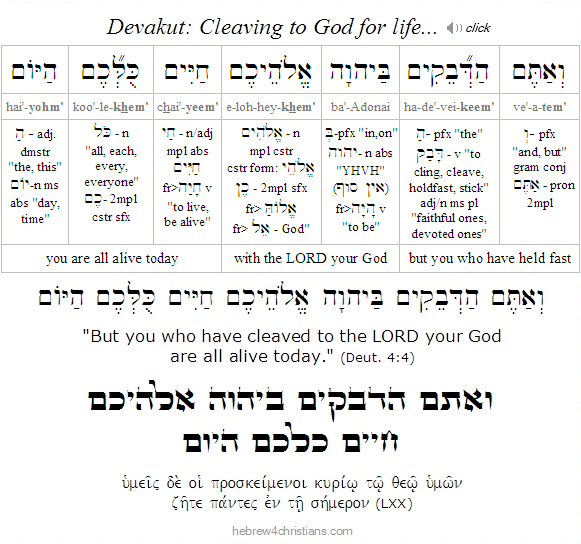 |
דָּבְקָה נַפְשִׁי אַחֲרֶיךָ
בִּי תָּמְכָה יְמִינֶךָ
dah·ve·kah · naf·shee · a·cha·rey·kha
bee · tahm·khah · ye·mee·ne·kha

"My soul cleaves to you;
Your right hand upholds me."
(Psalm 63:8)
Hebrew Study Card

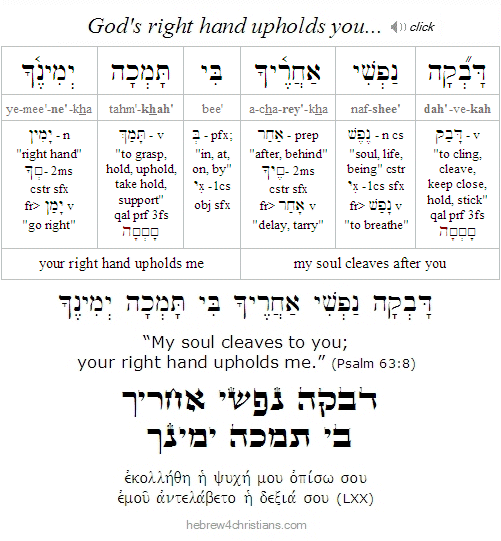
The Holiday of Tu B'Av...

[ The 15th of Av - otherwise called Tu B'Av - begins at twilight on Sunday, Aug. 10th... ]
08.16.19 (Av 15, 5779) Today is the 15th of Av (i.e., Tu B'Av), the "holiday of love." Just as Yom Kippur originally celebrated the reconciliation of Israel to the LORD after the sin of the Golden Calf, so Tu B'Av originally celebrated the reconciliation of Israel for the Sin of the Spies. Therefore both the fifteenth of Av and Yom Kippur became joyous times celebrating forgiveness and restoration to the LORD. The Babylonian Talmud (Ta'anit 31a) quotes Shimon ben Gamliel as saying, "Israel had no holidays as joyous as the fifteenth of Av and the Day of Atonement, when the maidens of Israel would go out and dance in the vineyards... What were they saying: Young man, consider whom you choose to be your wife..."
In modern Israel, Tu B'Av is observed as an annual holiday of love and affection (i.e., chag ha-ahavah: חַג הָאַהֲבָה) that is celebrated like "Valentine's Day" (though it is a much older holiday). However, since it is the "last" festival of the Jewish year, Tu B'Av prophetically pictures our marriage to the Lamb of God (Seh Elohim), Yeshua our beloved Messiah. On a soon-coming day those who belong to him and are faithful to follow his ways will be blessed with the unspeakable joy as their "wedding day" finally has come. This is heaven itself - to be in the Presence of the LORD and to be His beloved (Rev. 19:6-9).
With the advent of the holiday of Tu B'Av, we are reminded of the beautiful phrase, ani l'dodi ve'dodi li (אֲנִי לְדוֹדִי וְדוֹדִי לִי), "I am my beloved's, and my beloved is mine" (Song. 6:3), a phrase the sages say is an acronym for the name Elul (אלול). Now the month of Elul begins in just a couple of weeks (i.e., Monday, August 5th this year), and the entire month is set apart to prepare us for the coming High Holidays in early September. During this time it we engage in cheshbon ha-nefesh ("soul searching") and to derive comfort that God is forgiving and loving to those who turn to Him. The sages chose the seven "Haftarot of comfort" to encourage us to make our hearts ready for the upcoming High Holiday Season.
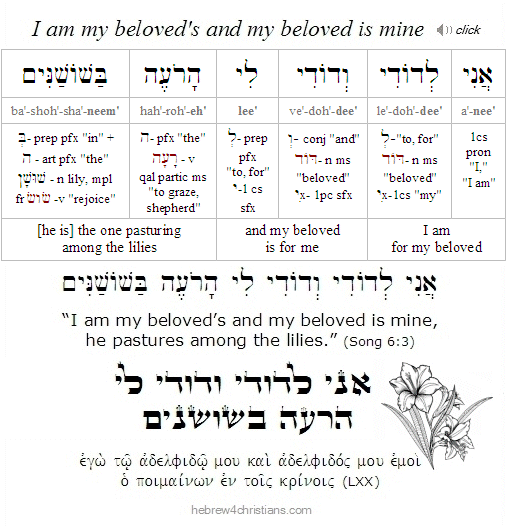 |
Note: Why is the 15th of Av called Tu B'Av? Well, as you perhaps know, Hebrew letters can be used to express numbers. Joining the letters Tet (9) and Vav (6), for example, equals the number 15, sometimes written as the acronym "Tu" (ט"ו). The phrase "Tu B'Av" (ט"ו באב) indicates the 15th day of the month of Av (אָב), a "full-moon" holiday that has been celebrated as a day of love and affection since the First Temple period. For more click here.
The Great Commandment...
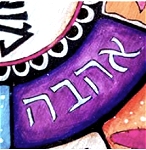
08.16.19 (Av 15, 5779) Our Torah portion this week (Vaetchanan) includes the first part of the Shema: "Hear, O Israel, the LORD is our God; the LORD is One" (Deut. 6:4). During its recitation we pronounce each word very carefully and cover our eyes with our right hand, testifying of the sovereignty of God and our primary duty to love Him with our whole being. Yeshua said that the Shema was the great commandment of Torah (see Mark 12:29-30).
שְׁמַע יִשְׂרָאֵל יְהוָה אֱלהֵינוּ יְהוָה אֶחָד
she·ma · Yees·rah·eil · Adonai · E·loh·hey·noo · Adonai · e·chad

"Hear, O Israel, the LORD is our God; the LORD is One."
(Deut. 6:4)

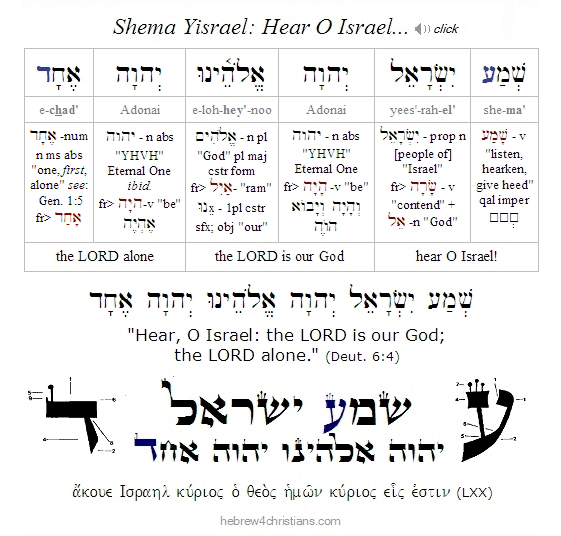
Note that this verse includes three Divine Names: Lord (יהוה), God (אלהים), and Lord (יהוה) again, which suggests the multiplicity-in-oneness (unity) that the word "echad" implies (see below). God's attributes as Compassionate Source of life, Eternal Judge, and Savior, are unified and affirmed in this verse. The two letters Ayin (ע) and Dalet (ד) are enlarged in the opening verse of the Shema. Together, these letters form the word 'ed (עֵד), which means "witness," suggesting that we recite the Shema to testify of the sovereignty of God and our primary duty to love Him bekhol levavkha, with all our hearts...
Interestingly, the word echad (אֶחָד) in Hebrew implies unity in diversity, not absolute numerical identity (the word for one and only one, i.e., "unique," is yachid (יָחִיד)). For example, in Exodus 26:6 the parts of the Tabernacle (mishkan) are to be constructed so that "it shall be one (echad) tabernacle," and Ezekiel spoke of two "sticks" (representing fragmented Israel) as being reunited into one: "and they shall be one (echad) stick in My hand" (Ezek. 37:19). Moses also uses echad in Genesis 2:24 when he says: "And they (husband and wife) will become one flesh (basar echad)." Ultimate Reality is multidimensional, personal and loving, and that is part of the very essence of God. There is no such thing as a "Person" - either human or Divine - that exists in an absolute vacuum, outside of relationship. Absolute monism is inconsistent with the idea of Divine Personhood, just as Aristotle's "Unmoved Mover" is a solipsistic illusion and logical absurdity.
There is a "three-in-one" sacred place of the heart (represented by the inmost chamber of the Mishkan called the Holy of Holies) which contains the "three-in-one" sacred Throne of the Divine Presence (represented by the Ark of the Covenant covered by sacrificial blood that signifies the cross of Messiah), before which the "three-in-one" blessing of God is heard (represented by the the priestly benediction when the Sacred Name YHVH was uttered), as we affirm the great "three-in-one" affirmation of faith known as the Shema: "Hear, O Israel, the LORD our God is One LORD," which declares our duty to love God with the "three-in-one existence" he has given us: with all our heart (be'khol levavkha), with all our soul (be'khol nafshekha), and with all our strength (be'khol me'odekha).
At the revelation at Sinai, "the mountain burned with fire to the heart of heaven" (בָּאֵשׁ עַד־לֵב הַשָּׁמַיִם), wrapped in darkness, cloud, and heavy mist" (Deut. 4:11). Yet what is this divine Fire if it is not the very passion of God - a passion that descends from the "heart of heaven" to the place of revelation within the human heart? Indeed the fire is none other than the Word of God, "the Voice that speaks from the midst of the fire" (קוֹל אֱלהִים מְדַבֵּר מִתּוֹךְ־הָאֵשׁ) the truth revelation (see Exod. 3:2, Deut. 4:33). As the Spirit asks: "Who has ascended to heaven and come down? Who has gathered the wind in his fists? Who has wrapped up the waters in a garment? Who has established all the ends of the earth? What is his name, and what is his Son's name? Surely you know" (Prov. 30:4).
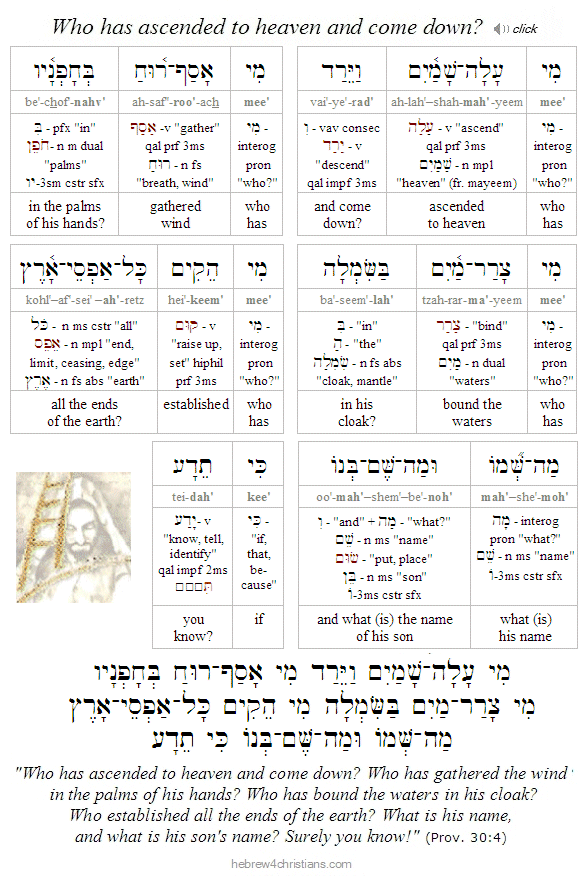 |
Yeshua is the Center of Creation - its beginning and end. As it is written: אָנכִי אָלֶף וְתָו רִאשׁוֹן וְאַחֲרוֹן ראשׁ וָסוֹף / "I am the 'Aleph' and the 'Tav,' the First and the Last, the Beginning and the End" (Rev. 22:13). "For from him and through him and to him are all things. To him be glory forever. Amen" (Rom. 11:36). Indeed he is called מֶלֶךְ מַלְכֵי הַמְּלָכִים / Melech Malchei Hamelachim: The "King of kings of kings" and the LORD of all possible worlds -- from the highest celestial glory to the dust of death upon a cross. Yehi shem Adonai mevorakh (יְהִי שֵׁם יהוה מְברָךְ): "Let the Name of the LORD be blessed" forever and ever (Psalm 113:2).
Note: In Hebrew, the "heart" of something represents its core. center, and essence. Revelation is a matter of the heart, written by the God's Spirit, yielding a life of praise and thanks to the Lord. For more information about the Shema and its blessings, or to download Shema study pages, please see the Shema section of the site. Shalom.
The Heart of Heaven...
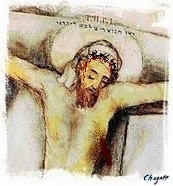
[ The following concerns this week's Torah reading, parashat Vaetchanan, which is always read on the Sabbath following Tishah B'Av... Nachamu, nachamu... ]
08.15.19 (Av 14, 5779) In our Torah portion this week (Vaetchanan), Moses recalled the awesome revelation of the Torah at Sinai, describing how the mountain "burned with fire unto the heart of heaven" (בּעֵר בָּאֵשׁ עַד־לֵב הַשָּׁמַיִם) when the Ten Commandments were uttered and were written upon the two tablets (Deut. 4:11-13). The sages say that the tablets represented a heart, as it says, "write them on the tablet of your heart" (Prov. 3:3), and God's word is likened to a fire that reveals the great passion of God's heart for us (Jer. 23:29; Deut. 4:24). Tragically, the two tablets were smashed after the people lost sight of the heart of heaven, and therefore God requires a broken heart - teshuvah - to behold his glory once again. Therefore we see that Yeshua died of a broken heart upon the cross for our return to God, and the fire of his passion burned unto the very heart of heaven....
 |
The Word Shalom...

[ Sometimes it can be helpful to use "non-linear" methods to consider Scripture, though of course reading in context while using logic and the historical-grammatical method is the primary way we come to ascertain the truth of God. The following, however, explores a bit of the esoteric" side of understanding the word "shalom" based on the discussion of various Torah sages who have used gematria and other approaches to help elicit additional insight into the word. If you do not find this helpful please skip it!]
08.15.19 (Av 14, 5779) One of the most well-known Hebrew words is shalom (שָׁלוֹם), usually translated as "peace." The word comes from a root (שׁלם) meaning whole or complete. Shalom does not merely mean the absence of strife as much as healing, wholeness, and well-being despite the presence of strife. For example, after he wrestled with the Angel of the LORD, the Scripture says "Jacob came whole" (וַיָּבֹא יַעֲקֹב שָׁלֵם), connecting his struggle to receive the blessing with his healing (Gen. 33:18).
Note that the word shalom is formed from the three root letters (שׁ.ל.ם). The letter Shin (שׁ) is said to stand for fire and the letter Mem (מ) for water (the word sha-mayim [שׁמים] means "heaven"). In the letters that form the word shalom, then, two antithetical forces are mediated or balanced by the letter Lamed (ל) which pictures a shepherd's staff. The word lamad (למד) itself means "to learn" and can be read as an acronym for lev mavin da'at (לב מבין דעת), "a heart that understands knowledge." A disciple is called a talmid (תַלמִיד), from the same word. The word shalom (שָׁלוֹם) therefore contains these three root letters plus the letter Vav (ו) which means "connection." Originally the letter Vav looked like a hook or nail, and in Biblical Hebrew it is used as connective prefix meaning "and." The letter Vav is spelled ואו, which adds up to 13 - the same value as YHVH (יהוה), "love" (אהבה), and "one" (אחד). The Vav pictures a conduit or connection between heaven and earth. Its numeric value is six, which is associated with man who was created to yield God's kingdom on earth. Shalom, or "peace," then represents the Shepherd who connects the things of heaven with your heart. The phrase lev simcha (לֵב שִׂמְחָה) means "a joyful heart" which is a mark of peace given by God. The Hebrew word for joy (i.e., simchah: שִׂמְחָה) shares the Shin and Mem letters of shalom and adds the letter Chet (ח) meaning life (חַי), and the letter Hey (ח), referring to the Holy Spirit (הַקּדֶשׁ). Ultimately peace comes from Yeshua the LORD, who is the Wonderful Teacher (פּלֶא יוֹעֵץ), the Mighty God (אֵל גִּבּוֹר), the Everlasting Father (אֲבִיעַד), and Sar Shalom (שַׂר־שָׁלוֹם), the Ruler of Peace (Isa. 9:6). God will keep in perfect peace (i.e., שָׁלוֹם שָׁלוֹם, "the peace of peace") all those who trust in Him (Isa. 26:3).
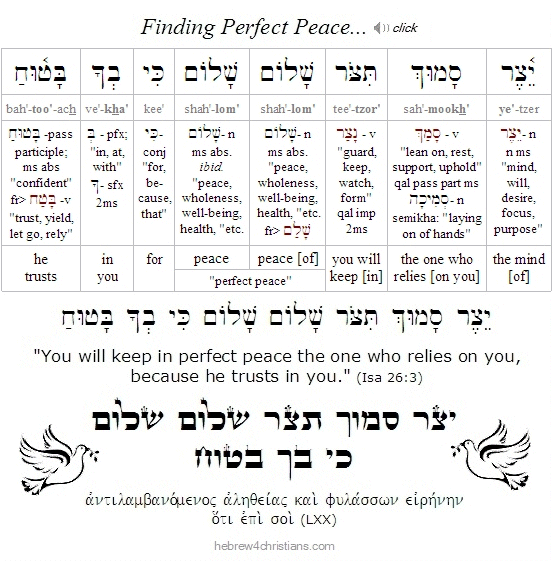 |
Comfort and Hope...
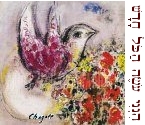
08.15.19 (Av 14, 5779) Our Torah portion this week (i.e., parashat Vaetchanan) begins with Moses' plea to the LORD to be allowed entry into the Promised Land, despite God's earlier decree (Num. 20:8-12; 27:12-14). The Hebrew word va'etchanan (וָאֶתְחַנַּן) comes from the verb chanan (חָנַן), which means to beseech or implore. Moses was asking God to show him grace (חֵן) by reversing the decree that forbade him to enter the Promised Land.
Note that in Jewish thinking appealing to God's grace requires expending personal effort. The gematria of vaetchanan is 515 -- the same as the word for prayer (i.e., tefillah, תְּפִלָּה) -- which suggests (according to Jewish tradition) that Moses offered tachanunim (supplications) no less than 515 times to be allowed into the Promised Land. This represents deep wrestling: the grammatical form of the verb vaetchanan is "hitpael" -- reflexive -- implying that Moses grapled deeply within his heart for a way to go forward despite his disappointment (the Hebrew word "to pray" (i.e., לְהִתְפַּלֵל) is also reflexive: you first undergo self-examination before turning to God (1 Cor. 11:31)). We must first be willing to be honest with ourselves before we can hope to do any real business with heaven.... Despite his repeated appeals, however, God finally said to Moses: רַב־לָך, "enough from you" (Deut. 3:26) and reaffirmed His decree that he would not be allowed to lead Israel into the land. That privilege was given to Yehoshua bin Nun (יְהוֹשֻׁעַ בִּן־נוּן), i.e., "Joshua the son of Nun," who was clearly a picture of the Messiah.
The sages refer to the principle: ma'aseh avot siman labanim (מַעֲשֵׂה אֲבוֹת סִימָן לַבָּנִים): "The deeds of the fathers are signs for the children." The entire Exodus story amounted to a sort of parable: "As below, so above" (and conversely). Moses was forbidden into the land because symbolically the covenant made at Sinai was insufficient to fulfill the promise of God. This insufficiency, however, was not the fault of God's Torah, which is "holy, just, and good" (Rom. 7:12), but rather because of the weakness of the human condition (i.e., the law of sin and death). In Jewish midrash, the rock is called the "well of Miriam" because the water was said to have run dry upon her death. But this is simply a midrash, and we know from the New Testament that both the manna (i.e., lechem ha-chayim: לֶחֶם הַחַיִּים) and the living water (i.e., mayim ha-chayim: מַיִם הַחַיִּים) both represented the Presence of Yeshua (John 6:35; 7:38). "Our fathers ... passed through the sea and ate the same spiritual food and drank the same spiritual drink. For they drank from the spiritual Rock that followed them, and the Rock was the Messiah" (1 Cor. 10:1-4). This Rock was not given to Israel in the merit of Miriam, but rather foreshadowed the sustenance of life given through the One who would be stricken for His people (Isa. 53:4 and 1 Cor. 10:4). The Torah states that Moses' sin that led to his exile was that he "struck the rock twice" (Chukat), and this implied that the Savior of Israel would need to be stricken a second time to give life the people. No! The Rock that was once smitten for the people was now to be spoken to as the "Living Rock" (Num. 20:8, 1 Cor. 10:4).
Even in the face of exile, we know that God's correction and judgment is not the last word for those who turn to Him in trust (Lam. 3:22-23). In the end, the Jewish people will be saved (Rom. 11:26), just as Moses was indeed later admitted to the Promised Land where he met with Yeshua on the Mount of Transfiguration (Matt. 17:1-5). The LORD is faithful and true, and He will never break His promise to the children of Israel...
חַסְדֵי יְהוָה כִּי לא־תָמְנוּ
כִּי לא־כָלוּ רַחֲמָיו
chas·dei · Adonai · kee · loh-tah·me·noo
kee · loh-khah·loo · ra·cha·mahv

"The lovingkindness of the LORD never ceases;
his compassions never come to an end."
(Lam. 3:22)

Hebrew Study Card
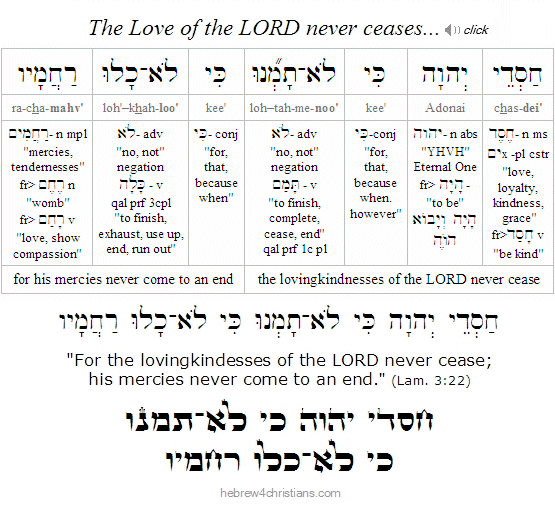
The Eyes of the LORD...

08.14.19 (Av 13, 5779) There is a story told of how the Baal Shem Tov once hired a wagon driver to take him to a nearby village. On the way, the two men soon passed by a field laden with luscious produce. The wagon driver stopped the wagon, turned to the Baal Shem Tov - whose identity he did not know - and said with a wicked grin, "I'm going to fetch us some good vegetables from that field. You be on the lookout. Call out if you see anyone coming!"
Just as the driver bent down to pick some vegetables, the Baal Shem Tov screamed, "We're seen! We're seen!" The frightened man then ran back to the wagon and raced away. After traveling some distance he turned around and saw no one behind them. "Why did you call out like that?" he angrily chided the rabbi. "There was nobody watching." The Baal Shem Tov then pointed upward and said: "God was watching; God is always watching." As our Scriptures teach: "The eyes of the LORD are in evey place, observing the evil and the good" (Prov. 15:3).
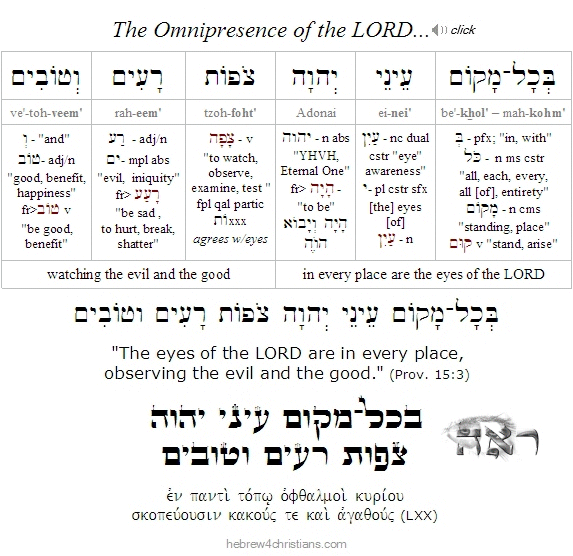 |
Each soul born into this world is required to believe that God exists and is personally knowable (Rom. 1:19-20), that we are always in His presence (Prov. 15:3; Psalm 94:9; 139), that He knows all things (Psalm 147:5), and absolutely nothing can be hidden from Him (Isa. 40:28; Jer. 23:24; Heb. 4:13). When we sin, however, we "break from" reality and deny the divine Presence by a perverse act of self-exaltation. Whenever we imagine that we are unseen by God or whenever we "forget" that we live, move, and have our being in His presence, we are denying reality... Our sin causes us lose sight of what's real: we forget who God is; we forget who we are; and we exile ourselves from the Source of life... Surely sin is a form of insanity, and therefore we have a moral and spiritual obligation to think clearly and to value truth.
As Rabbi Judah would say, "Contemplate three things, and you will not come to the hands of transgression: Know what is above from you: a seeing eye, a listening ear, and all your deeds being inscribed in a book" (Pirke Avot 2:1). Therefore "fear God and keep his commandments, because this is the whole duty of man. For God will bring every deed into judgment, with every secret thing, whether good or evil" (Eccl. 12:13-14).
 |
Note: I have been fighting a fever the last couple days, friends. Your prayers are appreciated....
Finding your heart...
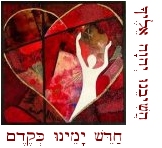
08.13.19 (Av 12, 5779) From our Torah portion this week (Vaetchanan) we read: "Take good heed for your souls..." (Deut. 4:15). The Hebrew grammar here is a bit unusual, since the verb shamar (שָׁמַר), meaning to "keep" or to "guard," is written in the passive (niphal), i.e., "Let yourselves be guarded well..." (וְנִשְׁמַרְתֶּם מְאד לְנַפְשׁתֵיכֶם). If we open our hearts to heed or listen to the truth of God - if we surrender to God's will for our lives - we will be protected from the snares of idolatry. "Know therefore today, and lay it to your heart, that the LORD is God in heaven above and on the earth beneath; there is no other" (Deut. 4:39). When you surrender from the heart you will understand that "the LORD is your keeper (יְהוָה שׁמְרֶךָ)... and yishmor et nafshekha - the LORD will guard your life" (Psalm 121:5,7).
Note that the phrase "lay it to your heart" (in Deut. 4:39) may better be rendered as "return to your heart" (וַהֲשֵׁבתָ אֶל־לְבָבֶךָ), suggesting that the truth of the LORD is found there – within the heart that truly seeks him (Deut. 4:29). Hashivenu! In other words, the truth is found in the heart's seeking for the LORD and His love. Know this truth today... "The most important part of teaching is to teach what it is to know," that is, to know "in your heart."
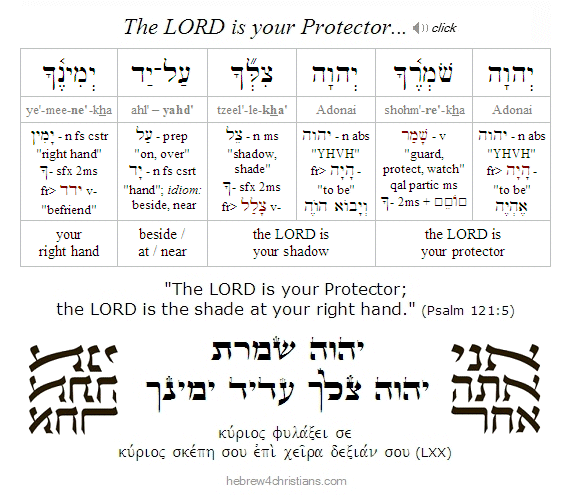 |
Every Prayer Answered...

08.13.19 (Av 12, 5779) If you earnestly pray yet are tempted to think that God is not responding, remind yourself that every prayer uttered to God from a heart of honest faith, that is, from a heart that trusts in God's redemptive love given in Messiah, is indeed answered, and not a syllable goes unheeded or will be lost before heaven. Just as assuredly we believe that no one will get away with evil -- that justice will eventually be served and all wrongs redressed at the bar of Eternal Judgment -- so we understand that every utterance of the heart of faith finds compassionate response from the heart of heaven. Indeed the essence of teshuvah (return, "repentance") is heartfelt prayer, and therefore when we bring honest words and turn back to accept the truth, God's mercy and compassion are decisively evoked (1 John 1:9). The most important thing is not to lose faith, however, but to believe that God hears you and will indeed answer the cry of your heart. Decide to believe and settle your expectation. Never give up hope. God is faithful; He will do it (1 Thess. 5:24).
King David asked for God's direct and miraculous intervention to heal his soul: "Cause me to me hear your lovingkindness in the morning, for in You do I trust. Cause me to know the way I should go, for I lift up my soul to you" (Psalm 143:8). David's request was that he would be empowered to hear God's loving voice calling to his heart at the start the day, to be assured of God's kindness and favor. Note that the Hebrew verbs used in this verse are both hiphal imperatives, implying that God is the agent or cause of the action. We lift up our heart in expectation, understanding that the LORD alone is the One who is able to draw us near to Him: "You [God] cause me to hear... You [God] cause me to know..."
הַשְׁמִיעֵנִי בַבּקֶר חַסְדֶּךָ
כִּי־בְךָ בָטָחְתִּי
הוֹדִיעֵנִי דֶּרֶךְ־זוּ אֵלֵךְ
כִּי־אֵלֶיךָ נָשָׂאתִי נַפְשִׁי
hash·mee·ei'·nee · va·bo'·ker · chas·de'·khah
kee · ve·kha · va·tach'·tee
ho·dee·ei'·nee · de'·rekh · zoo · ei·leikh
kee · ei·ley'·kha · na·sa'·tee · naf·shee

"Cause me to me hear your lovingkindness in the morning,
for in You do I trust.
Cause me to know the way I should go,
for I lift up my heart to you"
(Psalm 143:8)

Heavenly Revelations...
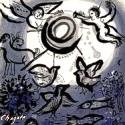
08.13.19 (Av 12, 5779) Within the earliest Jewish traditions, groups of scholars counted the number of times each letter appeared in the Hebrew Scriptures (as well as the number of words, verses, paragraphs, etc.). These textual specialists were called soferim (i.e., "counters," from the verb safar (ספר) meaning "to count"). The soferim (or "scribes") would ensure that Torah scrolls (and the other books of the Tanakh) were meticulously copied and faithfully transmitted, carefully noting any unusual words and spellings and preserving them exactly through their scribal arts. Jewish historians generally believe that Ezra the Scribe (c. 480–440 BC) instituted the practices of the soferim.
God is the Author of Creation (בורא העולם), of course - the One who is indelibly writing ma'aseh vereshit – the works of creation... Indeed where the Scriptures state: הַשָּׁמַיִם מְסַפְּרִים כְּבוֹד־אֵל - "The heavens declare the glory of God" (Psalm 19:1), note the the Hebrew word translated "declare" (מְסַפְּרִים) is an intensive form of the same verb used to express the idea of counting (לִסְפּוֹר). The Hebrew verb therefore suggests proclaiming, announcing, and openly broadcasting a message. Every detail of the universe, from great cosmic events to the bloom of a lily in the field, is broadcasting the glory and truth of God.
הַשָּׁמַיִם מְסַפְּרִים כְּבוֹד־אֵל
וּמַעֲשֵׂה יָדָיו מַגִּיד הָרָקִיעַ
ha-sha·ma·yeem · me·sa·pe·reem · ke·vohd · El
oo·ma·a·seih · ya·dahv · ma·geed · ha·ra·kee·a'

"The heavens declare the glory of God,
and the sky above proclaims the work of His hands.
(Psalm 19:1)

Download Study Card
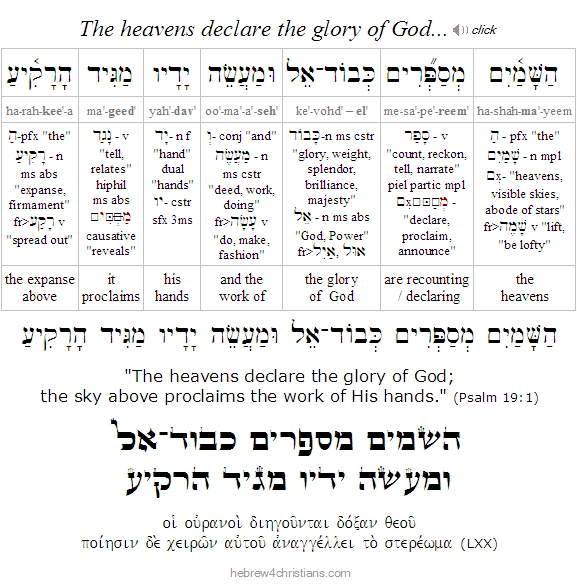 |
Parallel to the idea that the heavens are broadcasting God's majestic presence, the heavenly expanse (raki'a: רָקִיעַ or "firmament") proclaims the work of God's hands. The verb used to translate "proclaim" (i..e., nagad: נָגַד) means to explain or declare something, but the hifil verb form (i.e., maggid: מַגִּיד) is causative and intensive - meaning to preach or reveal in a conspicuous or obvious way. We see this usage in Jewish tradition during the "Maggid" of the Passover seder, when the story of the Exodus is plainly taught to the children at the table.
Just as the order, precision, and enormous complexity of the physical universe reveals the glory and excellencies of the Creator, so the vast heavenly expanse conspicuously displays the work of God's hands. And though mankind may suppress this constant narrative through willful ignorance, people are forever without excuse, "for what can be known about God is plain to them, because God has shown it to them. For the invisible attributes of God, namely, his eternal power and divine nature, are clearly perceived in the things that have been made" (Romans 1:18-20). If you open your heart, you will see God's power presently on display in the sky above you, the ground beneath you, and every place in between...
 |
Exile and Carelessness...
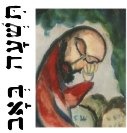
[ The following is related to the Fast of Tishah B'Av... ]
08.12.19 (Av 11, 5779) How could the great symbol of God's manifest presence on the earth, the Holy Temple, go up in smoke, and the very place (i.e., ha-makom: הַמָּקוֹם) where the LORD chose to "put His Name" be destroyed? We note that the "rebuke" portion of the tochachah begins with v'im lo tishme'u li (וְאִם־לא תִשְׁמְעוּ לִי), "if you do not listen to me" (Lev. 26:14), which recalls the Shema and the duty to love the Lord bekhol levavkha, "with all your heart." The sages point out that the refrain "if you walk contrary to me" (וַהֲלַכְתֶּם עִמִּי בְּקֶרִי) - which occurs several times during the rebuke - really means "if you walk carelessly (i.e., keri: קְרִי) with me." The commentator Rashi notes that the verb karah (קָרָה) means "to befall" or "to happen" and therefore suggests a sense of randomness (the related word mikreh [מִקְרֶה] means "coincidence"). If the people regarded the events of life as "random," then God would reciprocate by bringing senseless trouble into their lives. For this reason a careless attitude about the things of God is the first step toward apostasy...
It's been said that the opposite of love isn't hate, but rather indifference, and that explains why punishments came when the people "left their first love." If you walk carelessly with God, then you may be afflicted with "troubles of love" (i.e., yissurei ahavah: יִסּוּרֵי אַהֲבָה), that is, with various difficulties, intended to help you "come to your senses," to help you wake up, and to cause you return to the LORD for healing... This is a severe mercy of God.
Note: During Tishah B'Av we weep over our sins that have brought us into a place of exile. The sages note that the word "weeping," i.e., בְּכִי, has the same letter value as the word for "heart," i.e., לב. We weep from the heart, then, because the heart itself is what needs to be healed... For more on this subject, see "A Tishah B'Av Parable," here.
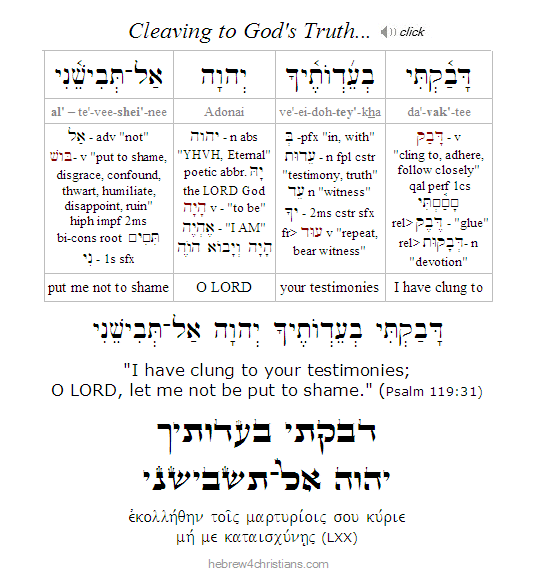 |
Searching for God...

[ The following concerns this week's Torah reading, parashat Vaetchanan, which is always read on the Sabbath following Tishah B'Av... ]
08.12.19 (Av 11, 5779) From this week's Torah portion we read: "if you seek for the LORD your God from there, you will find him, if you search for him with all your heart (בְּכָל־לְבָבְךָ) and with all your soul" (Deut. 4:29). From where do we search, from what place, except while in exile, after hardship, testing, and tribulation? If you seek for the LORD your God from there - in the midst of your exile, in the midst of your heart's cry - you will find him there, in your heart. This message is a prophecy, so that even after testing befalls you, in the end you will belong to the LORD and will hear his voice.
וּבִקַּשְׁתֶּם מִשָּׁם אֶת־יְהוָה אֱלהֶיךָ וּמָצָאתָ
כִּי תִדְרְשֶׁנּוּ בְּכָל־לְבָבְךָ וּבְכָל־נַפְשֶׁךָ
u·vee·kash·tem · mee·sham · et · Adonai · E·loh·hey·kha · oo·mah·tzah·ta
kee · teed·re·she·noo · be·khol · le·vah·ve·kha · oo·ve·khol · naf·she·kha

"But you will seek the LORD your God from there and you will find Him,
if you search for Him with all your heart and with all your soul."
(Deut. 4:29)

Note that the word "you will seek" is in the plural, whereas the rest of the verse is in the singular. "Where is God to be found?" asks the Kotzker Rebbe, but "in the place where He is given entry!" As the Apostle Paul wrote, "The word is near you, in your mouth and in your heart" (that is, the word of faith that we proclaim); because, if you confess with your mouth that Yeshua is LORD and believe in your heart that God raised him from the dead, you will be saved. For with the heart one believes and is justified, and with the mouth one confesses and is saved. For the Scripture says, "Everyone who believes in Him will not be put to shame." For there is no distinction between Jew and Greek; for the same LORD is LORD of all, bestowing his riches on all who call on him. For "everyone who calls on the name of the LORD will be saved" (Rom. 10:8-13).
Personal Update: Please remember me in your prayers, friends. I have been running a fever and not feeling well the last couple days. Thank you. - John
 |
Reading in Context...

08.12.19 (Av 11, 5779) An essential and basic principle of Bible interpretation is stated in the simple axiom: "a text without a context is a pretext," and therefore we must endeavor to understand the New Testament in light of the Torah, not the other way around... Without the context of Torah, the meaning and terms of the New Testament will be obscure and subject to misunderstanding. Indeed, we must remember that the Messiah was "embedded" in the Jewish culture of his day (Gal. 4:4-5), and was fluent in Torah reading and study (Luke 4:16-21; John 4:22). Moreover, Yeshua plainly said that the Jewish Scriptures testify of Him: "And beginning with Moses and all the Prophets, he interpreted to them in all the Scriptures the things concerning himself" (Luke 24:27; John 5:39). We study Torah to know Yeshua, the "Living Torah" better, as he said: "Therefore every scribe who has been trained for the kingdom of heaven is like a master of a house, who brings out of his treasure what is new and what is old" (Matt. 13:52).
When we begin to apply this principle of interpretation, the "red letter" text of the New Testament will become visible in the Torah, the Prophets, and the Writings as well... Yeshua is the Voice of God that speaks from the midst of the fire -- yesterday, today and forever!
Praying to Pray...

[ The following concerns this week's Torah reading, parashat Vaetchanan... ]
08.12.19 (Av 11, 5779) Our Torah portion for this week begins, "And I pleaded (ואתחנן) with the LORD at that time, to say..." (Deut. 3:23), which implies that we must first pray in order to be able to pray, that is, we make ourselves ready to pray by finding the inner freedom and grace to groan before the LORD.... If you can't find the words to pray, then plead with the LORD and ask for the Holy Spirit to groan on your behalf (Rom. 8:26). "Ask, and it will be given to you; seek, and you will find; knock, and it will be opened to you" (Matt. 7:7). "O Lord, open my lips, and my mouth will declare your praise" (Psalm 51:15).
The need to pray with the proper focus, intention, and heart is surely one of our greatest needs... "Lord, teach us to pray" (Luke 11:1). The disciples were not asking for a formula or recipe prayer (such as might be recited from a prayer book), but for the right motivation, direction, and "Torah" of prayer... If we ask according to his will, God hears us (1 John 5:14), since we are speaking heaven's "language" of truth and humility. Therefore pray for the ability to pray effectively, to commune in trust with your heavenly Father. The prayer of a righteous person has great power (James 5:16).
אֲדנָי שְׂפָתַי תִּפְתָּח
וּפִי יַגִּיד תְּהִלָּתֶךָ
Adonai · seh·fah·tai · teef·tach
oo·fee · ya·geed · te·hee·lah·te·kha

"O Lord, open my lips,
and my mouth will declare your praise"
(Psalm 51:15)

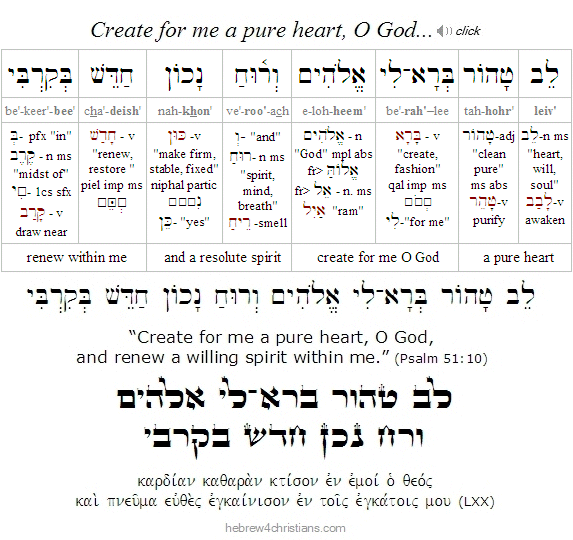
Parashat Vaetchanan - ואתחנן
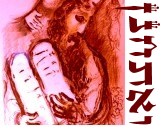
[ Our Torah reading for this week, parashat Vaetchanan, is always read on the Sabbath immediately following Tishah B'Av (i.e., on "Shabbat Nachamu," see entry below). ]
08.11.19 (Av 10, 5779) This week we will study parashat Vaetchanan (פרשת ואתחנן), a great Torah portion that includes some of the most foundational texts of the Jewish Scriptures, including the Ten Commandments, the Shema (the duty to love God and study His Torah), as well as the commandments of tefillin and mezuzot. In addition, in this portion Moses predicted the worldwide exile and the eventual redemption of the Jewish people in acharit hayamim (the prophesied "End of Days").
We always read this portion on the Sabbath that follows Tishah B'Av, called Shabbat Nachamu (שבת נחמו), the "Sabbath of Comfort," since the haftarah speaks about God's future consolation in the coming kingdom of God ("Comfort, comfort, my people [Isa. 40:1]). With the advent of this special Sabbath, we have just seven weeks to prepare for the new year (i.e, Yom Teruah or "Rosh Hashanah") and the High Holidays - a "jubilee" season that heralds the return of Yeshua... In addition to our Torah readings, on the 15th day of the month of Av we observe chag ha-ahavah (חַג הָאַהֲבָה), or "the holiday of love." Since it marks the "last" festival of the Jewish year, prophetically the 15th of Av (called Tu B'Av) pictures our marriage to the Lamb of God (Seh Elohim), the LORD Yeshua our beloved Messiah. On a soon-coming day those who belong to the LORD and are faithful to follow His ways will be blessed with the unspeakable joy of an eternally intimate relationship with Him. This is heaven itself - to be in the Presence of the LORD and to be regarded as His beloved (Rev. 19:6-9). Maranatha.
The Torah portion Vaetchanan begins with Moses' plea to the LORD to be allowed entry into the Promised Land, despite God's earlier decree (see Num. 20:8-12; 27:12-14). The Hebrew word va'etchanan (וָאֶתְחַנַּן) comes from the verb chanan (חָנַן), which means to beseech or implore. It derives from the noun chen (חֵן), grace, implying that the supplication appeals to God's favor, not to any idea of personal merit (in Jewish tradition, tachanun (תַּחֲנוּן) are prayers recited after the Amidah begging for God's grace and mercy). Moses was asking God to show him grace by reversing the decree that forbade him to enter the Promised Land.
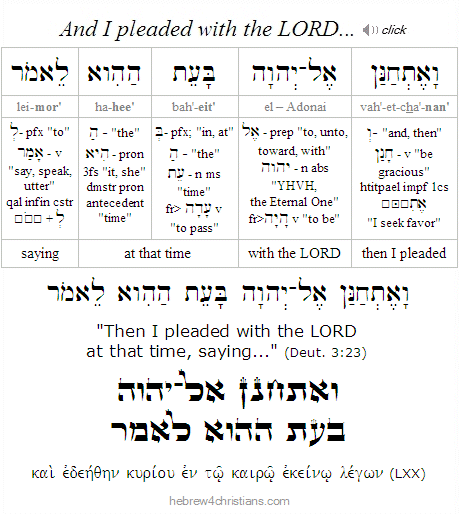 |
Note that in Jewish tradition, the idea of appealing to God's grace is not without expending personal effort. The gematria of vaetchanan is 515 -- the same as the word for prayer (i.e., tefillah, תְּפִלָּה) - which suggests that while grace is "free," it is something precious that must be sought after with the whole heart. Despite his repeated appeals, however, God finally said to Moses: רַב־לָך, "enough from you" (Deut. 3:26) and reaffirmed His decree that he would not be allowed to lead Israel into the land. That privilege was given to Yehoshua bin Nun (יְהוֹשֻׁעַ בִּן־נוּן), i.e., "Joshua the son of Nun," who foreshadowed Yeshua the Messiah.
Moses was prophetically forbidden into the land because the covenant made at Sinai was insufficient to fulfill the promise of God. This insufficiency, however, was not the fault of God's Torah, which of course is "holy, just, and good" (Rom. 7:12), but rather because of the weakness of the human condition (i.e., the "law of sin and death" - תּוֹרַת הַחֵטְא וְהַמָּוֶת). "For God has done what the law, weakened by the flesh, could not do. By sending his own Son in the likeness of sinful flesh and for sin, he condemned sin in the flesh, in order that the righteous requirement of the law might be fulfilled in us, who walk not according to the flesh but according to the Spirit" (Rom. 8:3-4). The New Covenant was needed to bring people to Zion, and this required a "change in the Torah" and the offices of a new priesthood (see Heb. 7:12). "The former commandment was set aside because of its weakness and uselessness - for the law made nothing perfect - but a better hope is introduced, and that is how we now draw near to God" (Heb. 7:18-19). The Love of God is our remedy, chaverim...
Shabbat Nachamu (שַׁבַּת נַחֲמוּ)
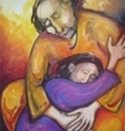
[ With the advent of this coming Sabbath, we have seven weeks to prepare for the new year (Rosh Hashanah) and the High Holidays - a "jubilee" season that heralds the return of Yeshua... ]
08.11.19 (Av 10, 5779) The prophet Zechariah (זְכַרְיָה) foresaw the future Messianic Era when the various fast days of the Jewish year would be transformed into to appointed times of great joy (Zech. 8:19): "Thus says Adonai Tzeva'ot (יהוה צְבָאוֹת): The fast of the fourth month (Tzom Tammuz), and the fast of the fifth month (Tishah B'Av), and the fast of the seventh month (Tzom Gedaliah), and the fast of the tenth month (Asarah b'Tevet), will be to the house of Judah for joy and rejoicing, and for pleasant appointed seasons, and the truth and the peace they have loved (וְהָאֱמֶת וְהַשָּׁלוֹם אֱהָבוּ)."
Because the great vision of Zion promises great future consolation by God, Jewish tradition named the Sabbath immediately following Tishah B'Av as the "Sabbath of Comfort, that is, Shabbat Nachamu: שַׁבַּת נַחֲמוּ, and assigned to it the prophetic portion from the Book of Isaiah that begins: נַחֲמוּ נַחֲמוּ עַמִּי - Nachamu, Nachamu ami - "comfort, comforted, my people..." (Isa. 40:1). The sages reasoned that the word nachamu was repeated to offer consolation for both Temples that were destroyed. Thematically, this Shabbat marks a time of joy over anticipated comfort in the days to come: Despite present tribulations, the LORD will vindicate His glory and completely ransom His people.
נַחֲמוּ נַחֲמוּ עַמִּי יאמַר אֱלהֵיכֶם
na·cha·moo · na·cha·moo · am·mee · yoh·mar · e·loh·hey·khem

"Comfort, comfort my people, says your God"
(Isa. 40:1)

Hebrew Study Card
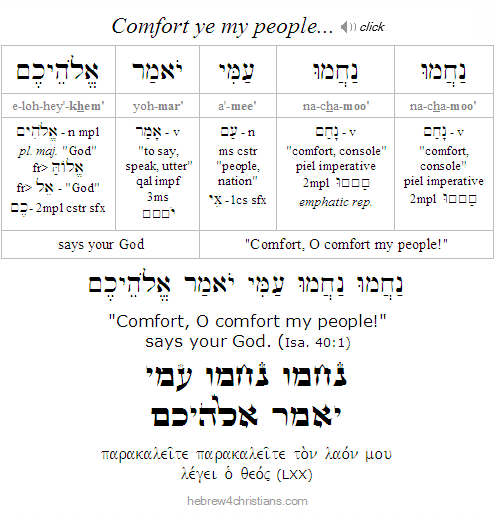
Seven Weeks Until Rosh Hashanah...
Shabbat Nachamu marks the start of a series of seven weekly readings related to the final redemption of the Jewish people (and indeed the entire world) called "The Seven Haftarot of Consolation." From the Sabbath following Tishah B'Av until Rosh Hashanah, we read words of comfort from the prophets. These selections foretell the restoration of the Jewish people to their land (the ingathering of the exiles), the future redemption of Israel, and the coming of the Messianic Era. In other words, we have seven weeks - 49 days - to prepare for the start of the new year (Rosh Hashanah) and the High Holidays - a prophetic "jubilee" season that concerns the return of Yeshua (and may He return soon, chaverim).
Note: Today we are observing Tishah B'Av, a day of solemn mourning for Zion. Hear then a few words from Jeremiah the prophet (ירמיהו הנביא) regarding the anguish of heart he felt regarding the destruction of Jerusalem: "My strength has perished; so has my hope from the LORD. Remember my impoverished and homeless condition, which is a bitter poison. My soul continually remembers it and is bowed down within me. Nevertheless this I call to mind, and therefore I have hope: The steadfast love of the LORD never ceases (חַסְדֵי יְהוָה כִּי לֹא־תָמְנוּ); for his mercies never come to an end (כִּי לא־כָלוּ רַחֲמָיו); they are new every morning; great is Your faithfulness (רַבָּה אֱמוּנָתֶךָ). "The LORD is my portion," says my soul, "therefore I will hope in him." The LORD is good to those who wait for him, to the soul who seeks him. It is good that one should wait quietly for yeshuat Adonai, the salvation of the LORD (לִתְשׁוּעַת יְהוָה); it is good for a man that he bear the yoke in his youth. Let him sit alone in silence when it is laid on him; let him put his mouth in the dust -- there may yet be hope; let him give his cheek to the one who strikes, and let him be filled with insults. For the Lord will not cast off forever, but, though he cause grief, he will have compassion according to the abundance of his steadfast love; for he does not afflict from his heart or grieve the children of men. To crush underfoot all the prisoners of the earth, to deny a man justice in the presence of the Most High, to subvert a man in his lawsuit -- the Lord does not approve. Who has spoken and it came to pass (מִי זֶה אָמַר וַתֶּהִי), unless the Lord has commanded it (אֲדנָי לֹא צִוָּה)? Is it not from the mouth of the Most High (עֶלְיוֹן) that good and bad come? Why should a living man complain, a man, about the punishment of his sins? Let us search and examine our ways, and return to the LORD! Let us lift up our hearts and hands to God in heaven..." (Lam. 3:18-41).
The Shema of Wisdom...

[ The following entry is related to our Torah portion this week, parashat Devarim... ]
08.09.19 (Av 8, 5779) The Mishnah asks, eizehu chacham? "Who then is wise?" and answers, "one who learns from everyone" (Avot 4:1). Wisdom, then, requires that you make space and take time to listen to others. "The talkative listen to no one, for they are ever speaking. And the first evil that attends those who do not know how to be silent is that they hear nothing" (Plutarch). Therefore Moses said, "If something is too difficult for you, bring it to me and I will listen" (Deut. 1:17). The sages comment that Moses would not pontificate a decision but would quietly and intently listen – and the solution would be revealed. The same may be said regarding prayer. If God commanded Moses to listen to the troubles of his people, how much more would He listen to our heart's cry for deliverance? After you've unburdened your heart of its anxious thoughts - these being "too difficult for you" - then you are made ready to hear God's voice in your midst....
Perhaps you (like me) once learned Psalm 19:7 as, "The law of the LORD is perfect, converting the soul." The Hebrew reads, תּוֹרַת יְהוָה תְּמִימָה מְשִׁיבַת נָפֶש, and might better be translated as, "The Torah of the LORD is perfect, returning the soul." Heeding Torah causes our souls to undergo teshuvah (תְּשׁוּבָה), or "repentance," which is the very theme of Tishah B'Av....
תּוֹרַת יְהוָה תְּמִימָה מְשִׁיבַת נָפֶשׁ
עֵדוּת יְהוָה נֶאֱמָנָה מַחְכִּימַת פֶּתִי
toh·raht · Adonai · te·mee·mah · me·shee·vaht · nah·fesh
ei·doot · Adonai · ne·e·mah·nah · mach·key·maht · pe·ti

"The Torah of the LORD is perfect, returning the soul
The testimony of the LORD is reliable, making wise the simple."
(Psalm 19:7)

Download Study Card
Peace of Shalom...
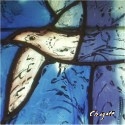
08.09.19 (Av 8, 5779) The sages say that the unbeliever lives a terribly burdensome life, for he refuses to acknowledge that his tribulations are shared by God, and therefore he bears all of life's burdens alone. Not so the person of faith, who understands that God shares his pain and who therefore finds life's burdens much easier to bear. As Yeshua said, "my yoke is good (χρηστὸς) and my burden is light (Matt. 11:30). "The very essence of trust in God (i.e., bittachon) is the serenity it imparts to the one who truly places his trust in Him." As it is written, "You keep him in perfect peace (lit. the "shalom of shalom") the one who leans on you, because he trusts in you. Trust in the LORD forever, for in Yah the LORD is everlasting strength" (Isa. 26:3-4).
 |
The first part of the Shema (i.e., Deut. 6:4-9) admonishes us to remember the truth of God "when you sit in your house, when you walk in your ways, when you lie down, and when you rise up." "In all your ways know Him," that is, in all that you put your hand to do look for the God's Presence and guidance (1 Cor. 10:31). This is something you must do: As King David stated, "I have set the Lord always before me, because He is at my right hand, I shall not be moved" (Psalm 16:8). You must "let the peace of God rule in you" (Col. 3:15). Shabbat shalom.
Moses' Miraculous Words...

[ The following entry is related to our Torah portion this week, parashat Devarim... ]
08.09.19 (Av 8, 5779) The midrash says that even though Moses "stammered" and was "kevad peh" (i.e., כְּבַד־פֶּה, "heavy of mouth") "and heavy of tongue" (וּכְבַד לָשׁוֹן), he was empowered to speak fluently whenever the Holy Spirit moved him. Sefer Devarim (the Book of Deuteronomy) is unique among the five books of Torah because it represents Moses' great farewell appeal to follow the LORD bekhol levavkha, "with all of your heart" (Deut. 6:5). In this final book of Torah, Moses - who once described himself as lo ish devarim (לא אִישׁ דְּבָרִים) "a man of no words" (Exod. 4:10), speaks some of the moving words of all of the Holy Scriptures, eloquently calling us to embrace the truth of Torah, to walk in God's love, and to await the final redemption...
Our Greatest Need...

[ The following entry is related to our Torah portion this week, parashat Devarim... ]
08.09.19 (Av 8, 5779) From our Torah this week we read: "For the LORD your God has been with you. You have lacked nothing" (Deut. 2:7). With God you have everything you need; without Him, you will never be truly satisfied. "Our hearts are restless until they find their rest in Thee," which is to say that the merry-go-round of desire for things of this world is ultimately vain and unfulfilling. Indeed, it is slavery to be attached to unslakeable desire; it is madness to restlessly desire more and more. God has set eternity within our hearts (Eccl. 3:11), a hunger that only heaven can fulfill, but we try to find happiness with the trinkets and junk of this passing realm.... When the LORD is with us – and when we dwell in the simplicity of that reality – we lack nothing: "For the LORD God is a sun and shield; the LORD bestows favor and honor; no good thing does he withhold from those who walk uprightly. O LORD of all power, blessed is the one who trusts in you" (Psalm 84:11-12).
כִּי שֶׁמֶשׁ וּמָגֵן יְהוָה אֱלהִים
חֵן וְכָבוֹד יִתֵּן יְהוָה
לא יִמְנַע־טוֹב לַהלְכִים בְּתָמִים
יְהוָה צְבָאוֹת אַשְׁרֵי אָדָם בּטֵחַ בָּךְ
kee · she'·mesh · oo·ma·gein · Adonai · e·lo·heem
chen · ve·kha·vohd · yee·tein · Adonai
lo · yee·na · tov · la·choh·le·kheem · be·ta·meem
Adonai · tze·va·oht · ash·rei · a·dam · bo·tei'·ach · bakh

"For the LORD God is a sun and shield;
the LORD bestows favor and honor;
no good thing does he withhold from those who walk uprightly.
O LORD of all power! blessed is the one who trusts in you."
(Psalm 84:11-12)

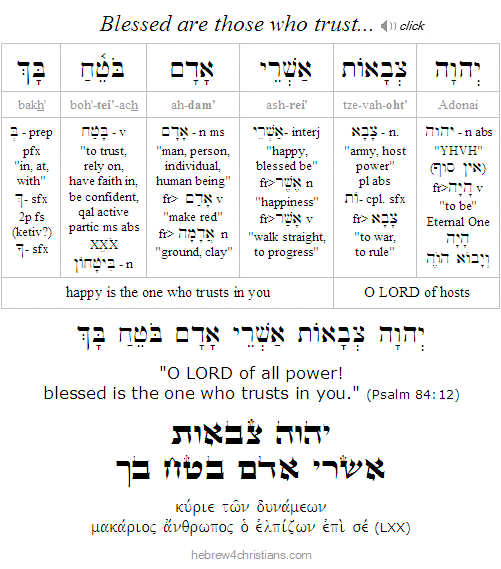
Tishah B'Av and Transience...

[ This weekend we are observing the holiday of Tishah B'Av... ]
08.09.19 (Av 8, 5779) In the Book of Isaiah it is written: "The grass withers, the flower fades, but the word of our God will stand forever" (Isa. 40:8), which sets up a great contrast between ha'olam hazeh (העולם הזה) and ha'olam haba (העולם הבא) – between this present world and the heavenly realm. Unlike the grass of the field that dries up or flowers that soon fade, the word of God stands forever. And despite the frailty of man and the inevitability of physical death, God's truth endures, which is a foundation upon which we can rest.
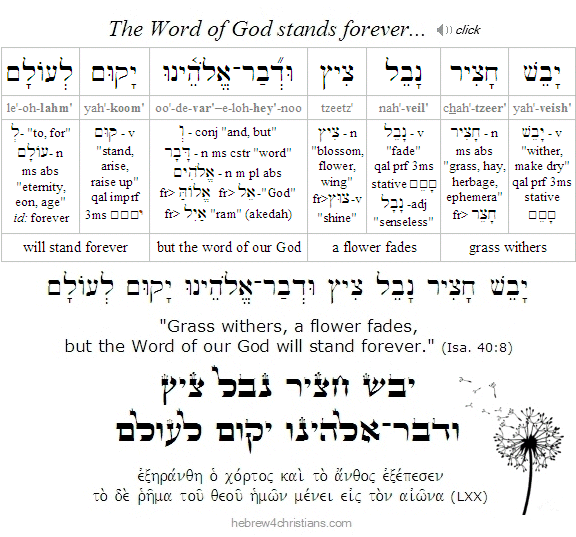 |
But how does the observation that life in this world "withers like grass" or a "fades like a flower" intended to comfort us? Do they not, on the contrary, lead us to regard our physical lives as vain and perhaps meaningless? Yes indeed. Our lives are empty and vain apart from the love of God and His truth. If we find ourselves wincing over such images, it is perhaps time to reexamine the state of our faith: To the extent that we regard this world as our "home" we will find the transience of life to be tragic... For those who are seeking a heavenly habitation, the "City of God" and the fulfillment of the promise of Zion, the fleeting nature of this evil world is ultimately a form of consolation...
הוֹדִיעֵנִי יְהוָה קִצִּי
וּמִדַּת יָמַי מַה־הִיא
אֵדְעָה מֶה־חָדֵל אָנִי
hoh·dee·ei·nee · Adonai · kee·tzee
oo·mee·dat · yah·mai · mah · hee
ei·de·ah · meh - chah·deil · ah·nee

"O LORD, make me to know my end
and what is the measure of my days;
let me know how quickly my life will pass"
(Psalm 39:4)

Hebrew Study Card
The theme of the transience of life is part of the message of Tishah B'Av. The Holy Temple, despite being the pride and joy of the Jewish people during the time of King Solomon, went up in smoke, and the place (i.e., ha-makom: הַמָּקוֹם) where the LORD chose to "put His Name" vanished as if it had never been... Understand, then, that the expression of your highest ideals, your most celebrated achievements, likewise can be turned to smoke in an instant. This, then, is the sober message of Tishah B'Av, a "holiday" that teaches that all things will be "tossed into the oven" (Matt. 6:30), though the truth of God endures forever.
On the Torah's calendar, Tishah B'Av is "sandwiched" between the two times Moses received the tablets of the covenant, first during Shavuot and later, after a period of repentance, during Yom Kippur. This means that just two months after celebrating the Sinai revelation, we mourn for the destruction of the Temple and the beginning of our long exile; and two months later still, we celebrate national atonement and the restoration of the covenant during Yom Kippur. All this is prophetic, of course, since Shavuot recalls the ascension of our LORD and the giving of the Ruach HaKodesh (Holy Spirit); Tishah B'Av foretells of Israel's long exile and the "age of grace" extended to the Gentiles; and Yom Kippur foretells the coming atonement of the Jewish people at the end of the age, when Israel accepts Yeshua as their great High Priest of the New Covenant (Jer. 30:24).
Tishah B'Av reminds us that this world is not our home, and that we are "strangers" and exiles here. The heart of faith is always in collision with this world. Yes, it is an affliction to wait for the LORD, a sort of "homesickness" of heart... The apostle Paul says our loneliness and alienation prepare for us an "eternal weight of glory" beyond all comparison, because we are not looking at what can be seen but at what cannot be seen. "For what can be seen is temporary, but what cannot be seen is eternal" (2 Cor. 4:17-18). Just as the "two-souled" man is unstable in all his ways, so the process of being "educated for eternity" means learning to focus our heart's passion and hope on the glory of heaven. "For where your treasure is, there will your heart be also" (Matt. 6:21).
 |
Ultimately, the loss of "the place where God put His Name" was a deliberate affliction of His love for his people. The Sacred Name of God [יהוה] is formed from the words hayah ("He was"), hoveh ("He is"), and yihyeh ("He will be"): הָיָה הוֶה וְיִהְיֶה, indicating that the LORD is always present, despite momentary appearances. Note that all the letters of the Name are "vowel letters," which mean they evoke breath and life. Indeed the first occurrence of the Name in Torah regards the inspiration of nishmat chayim (נִשְׁמַת חַיִּים), the "breath of life" in Adam (Gen. 2:4). The LORD is always present for you, breathing out life and hope...
The Battle for Sanity...
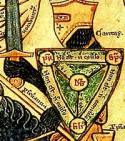
08.09.19 (Av 8, 5779) As I've mentioned repeatedly over the years, the great Apostle Paul foretold that the time before the "End of Days" would be "perilous" (χαλεπός) and full of appalling human depravity (2 Tim. 3:1-5). This is our world today. Because of the raging spiritual war going on all around us, then, the following needs to be emphatically restated: "The important thing is to not lose your mind..."
The mind is the "gateway" to your heart, and it is therefore essential to guard your thinking by immersing yourself in the truth... Fear is often the result of believing the lie that God is not in control or is unable/unwilling to help you... "Not losing your mind" therefore means being grounded in what is real, and it therefore means understanding your identity and provision as a child of God. That is why the first piece of the "armor of God" is the "belt of truth," since truth is the foundation (יְסוֹד) of life with God (Eph. 6:14). "God has not given us the spirit of fear, but of power (גְּבוּרָה / δύναμις) and of love (ἀγάπη), and of a "sound mind" (σωφρονισμός), lit. a "delivered" mind, "healed" from fragmentation (2 Tim. 1:7). The Greek word "sound mind" (σωφρονισμός) comes from the verb sodzo (σῴζω), meaning "to save," from saos (σάος) "safe," in the sense of being under caring influence of the Spirit of God...
מָגִנִּי עַל־אֱלהִים מוֹשִׁיעַ יִשְׁרֵי־לֵב
mah-gee-nee · al - e-loh-heem · moh-shee-a · yeesh-rey-leiv

"My defense is of God,
who saves the upright of heart."
(Psalm 7:10)

Looking for God...

[ The following is related to Tishah B'Av and the theme of teshuvah (repentance)... ]
08.08.19 (Av 7, 5779) The Hebrew word for "world" or "age" is olam (עוֹלָם), which is derived from a root verb (עָלַם) that means "to conceal" or "to hide." God "hides" His face from us so that we will seek Him, and that means pressing through ambiguity of this world to discern and take hold of the truth. Therefore King David said, בַּקְּשׁוּ פָנָיו תָּמִיד/ bakeshu fanav tamid: "Seek His face continually" (Psalm 105:4). Note that the Hebrew gematria (numerical value) for the word "fanav" (i.e., "His face") is the same as that for the word "olam." When we truly seek God's face (i.e., seek His Presence) we are able to discern the underlying purpose for our lives in this age.
דִּרְשׁוּ יְהוָה וְעֻזּוֹ
בַּקְּשׁוּ פָנָיו תָּמִיד
deer·shoo · Adonai · ve·oo·zoh
ba·ke·shoo · fah·nahv · tah·meed

"Seek the LORD and his strength;
seek his presence at all times."
(Psalm 105:4)

Hebrew Study Card
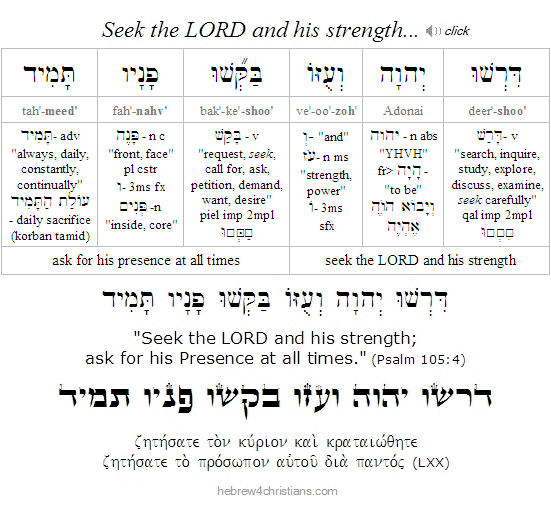
The ancient Greek version of the Torah (i.e., the Septuagint) translates this verse, "Seek the LORD and be strengthed; seek His face through everything (διὰ παντός)." The LORD God gives us "inner strength" (i.e., ἐγκράτεια, from εν-, "in" + κράτος, "strength" or "power") when we yield to "the power of His might" (ἐν τῷ κράτει τῆς ἰσχύος αὐτοῦ) (Gal. 5:22-23; Eph. 6:10). Therefore we must remember God's power and glory, for "He is the LORD our God (הוּא יְהוָה אֱלהֵינוּ); His judgments are in all the earth" (Psalm 105:7).
Seek and you shall find...

08.08.19 (Av 7, 5779) Teshuvah, or turning to God, means waking up, coming alive, returning to what is real... As is says: "Awake thou that sleepest - arouse from your state of slumber: and arise from the dead" (Eph. 5:14). The message to the sinner is always, "Wake up, wake up - you are living a nightmare..." The Spirit of God's love calls out, dirshuni vichyu (דִּרְשׁוּנִי וִחְיוּ), "seek me and live!" Open your eyes to discover life! "You will seek me and find me, when you seek me with all your heart" (Jer. 29:13).
וּבִקַּשְׁתֶּם אתִי וּמְצָאתֶם
כִּי תִדְרְשֻׁנִי בְּכָל־לְבַבְכֶם
oo·vee·kash·tem · oh·tee · oo·metz·ah·tem
kee · teed·re·shoo·nee · be·khol · le·vav·khem

"You will seek me and find me
if you search for me with all your heart"
(Jer. 29:13)

Hebrew Study Card
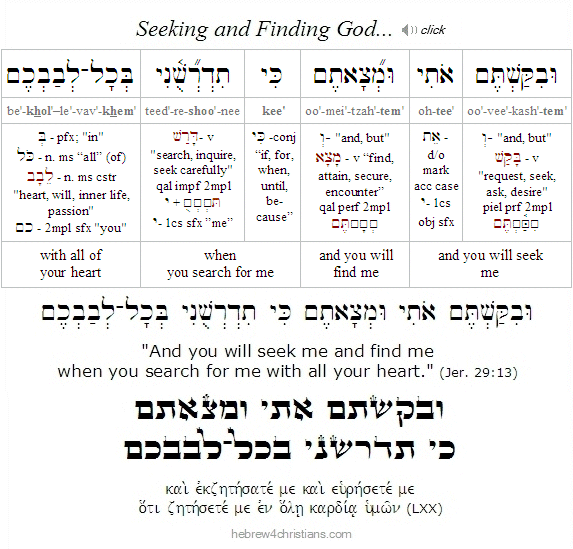
"Ask, and it shall be given you; seek, and you shall find; knock, and it shall be opened to you. For everyone who asks receives, and the one who seeks finds, and to the one who knocks it will be opened" (Matt. 7:7-8). The problem with many of us is not that we are so hungry, but rather that we are not hungry enough... We settle for "junk food" when God spreads out his banqueting table before us. There is a "deeper hunger" for life, and I pray we are all touched by such hunger pangs; there is a "blessed hunger and thirst" that feeds our heart's cry for God (Matt. 5:6); there is a "divine discontent" that leads to a deeper sense of contentment for the heart...
The Kingdom of God...

08.08.19 (Av 7, 5779) Yeshua told his followers that the Kingdom of God (i.e., mamlekhet Adonai: ממלכת יהוה) is "within you" (Luke 17:21). This teaches us that the reign of the Spirit is not to be found "out there" nor is the kingdom to be regarded as a political structure of this world, but is realized in spiritual relationship - namely, the communion between God with your heart and your heart with God... When we learn to see clearly, Yeshua says we can experience the divine Presence within our hearts and among ourselves. As we turn to the LORD, may we recognize that who we are is more vital than our outer appearance and contingent circumstances. Life in the kingdom means having a new identity, being a new creation (i.e., briah chadashah: בְּרִיָּה חֲדָשָׁה), and that changes everything (2 Cor. 5:16-17).
Return us to You, O LORD...
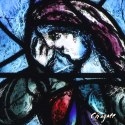
08.08.19 (Av 7, 5779) Have you ever lost something very valuable only to later discover it "hiding in plain sight," in the most obvious place? And yet that is what tends to happen to many of us as time goes by: we lose sight of what is most important and get lost in trivialities... We forget the meaning and purpose of our existence, we begin to sleepwalk through our days, numb and in quiet despair... A key verse chanted during this season of the year is: Hashivenu Adonai elekha ve'nashuvah: "Turn us back to you, O LORD, and we shall return," chadesh yamenu ke'kedem: "renew our days as of old" (Lam. 5:21). When we ask the LORD return us to Him, we are really asking him to help us wake up, to redirect our focus, and to enable us to engage in heartfelt self-examination by asking searching questions: "Who am I?" "How did I get here?" and so on. Teshuvah is a matter of "coming to yourself" and remembering the most important truths of life.
הֲשִׁיבֵנוּ יְהוָה אֵלֶיךָ וְנָשׁוּבָה
חַדֵּשׁ יָמֵינוּ כְּקֶדֶם
ha·shee·vei·noo Adonai e·ley·kha ve·nah·shoo·vah,
cha·desh ya·mey·noo ke·ke·dem

"Turn us back to yourself, O LORD, so that we may return to you;
renew our days as of old" (Lam. 5:21)

Hebrew Study Card
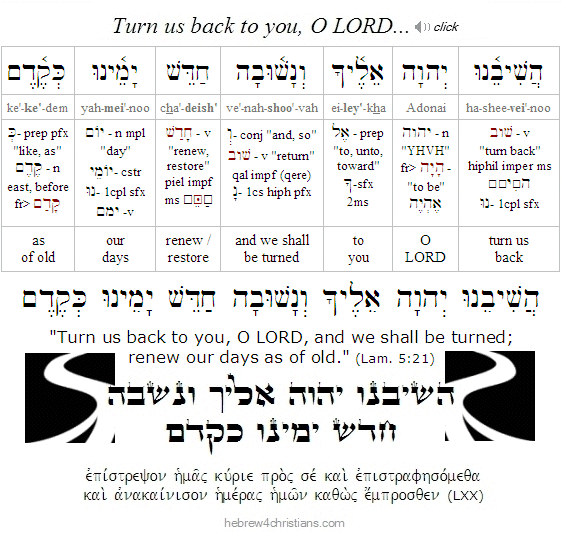
Hebrew Grammar Updates...
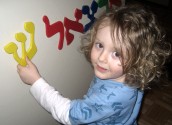
08.08.19 (Av 7, 5779) Shalom chaverim! It has been a long-term goal of mine to create an entirely free online Biblical Hebrew grammar for the the Hebrew for Christians website, and over the last few weeks I have been working very diligently on adding new content regarding the Hebrew Verbal System. In addition to creating some new pages, I have created a number of free PDF downloads with online examples of how the grammar works for particular verbs and verbal constructions. It is a lot of work to do this, of course, but I believe it is just another piece to the overall mission of Hebrew for Christians to teach the "Language of the Kingdom." Thank you for your prayers for this work to go forward, and if you are interested in learning more, see the Hebrew Grammar pages, especially Units 10 and 11.
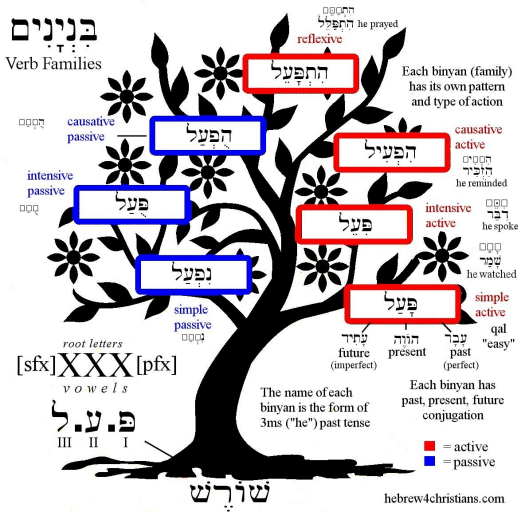 |
Note: You don't have to become an expert in Hebrew to benefit from the Hebrew for Christians website, of course, and I know many of you who are just learning the Hebrew alphabet or who come here to read encouraging meditations and daily insights on the Scriptures or to study about the Jewish holidays. That's wonderful, friends, and I appreciate everyone who is part of this ministry! Nevertheless, even a little Hebrew helps you understand the Jewish heart of your faith better, so it is my hope that you will continue to study and learn -- regardless of your level Hebrew learning! Shalom.
Trust and Suffering (אמון וסבל)

08.07.19 (Av 6, 5779) Sometimes in our afflictions we may feel lost, confused, and uncertain of ourselves. We dare not doubt God's love for us, though we may wonder how He might use such affliction to mend our hearts... As C.S. Lewis once said, "We are not necessarily doubting that God will do the best for us; we are wondering how painful the best will turn out to be" (Letters of C.S. Lewis, 1964). There is a trust issue in suffering, and an intimacy that comes through its fires. As Kierkegaard reminds us, "It is one thing to conquer in the hardship, to overcome the hardship as one overcomes an enemy, while continuing in the idea that the hardship is one's enemy; but it is more than conquering to believe that the hardship is one's friend, that it is not the opposition but the way, is not what obstructs but what develops, is not what disheartens but ennobles" (Four Upbuilding Discourses, 1844).
Amen. If you can't detect God's hand in your circumstances, then trust His heart... The heart of faith affirms: gam zu l'tovah (גַּם זוּ לְטוֹבָה): "this too is for good," particularly when the present hour may be shrouded in darkness... Whenever I am confused about life (which is often enough), I try to remember what God said to Moses after the tragic sin of the Golden Calf: "I will make all my goodness pass before you and will proclaim before you my Name, 'The LORD' (יהוה). And I will be gracious to whom I will be gracious, and will show mercy on whom I will show mercy" (Exod. 33:19). God's character does not change: the LORD is the same "yesterday, today, and forever." The meaning of the Name, however, cannot be known apart from understanding the need of the heart:
יְהוָה יְהוָה אֵל רַחוּם וְחַנּוּן
אֶרֶךְ אַפַּיִם וְרַב־חֶסֶד וֶאֱמֶת
Adonai · Adonai · el · ra·choom ve·chan·noon
e·rekh · a·pa·yeem ve·rav-che·sed · ve·e·met

"The LORD, the LORD, a God merciful and gracious,
slow to anger, and abounding in lovingkindness and truth."
(Exod. 34:6)

Hebrew Study Card
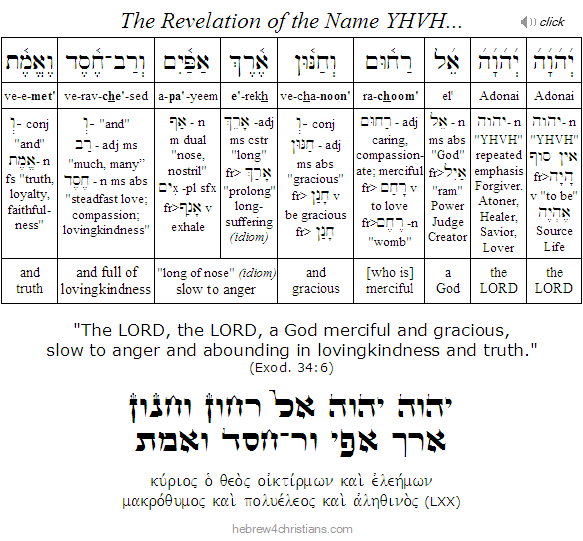
At the time of the awesome encounter at the "burning bush," God had revealed to Moses that the Name YHVH (יהוה) means: "He is Present" (i.e., the word is a play on the Hebrew verb hayah [הָיָה], "to be"), and therefore God is "always there" (see Exod. 3:14). The great I AM (אֶהְיֶה) means God stands outside of the constraints of time, "one day is as a thousand years" and "a thousand years as one day" before Him (2 Pet. 3:8). Just as a thousand years is but "a watch in the night" (Psalm 90:4), so one day is as a thousand years. God's Spirit broods over all things and sustains the entire universe. God is "necessary being," the Source of Life, and foundation for all other existence. God's creative love and power sustain all things in creation...
Now while the idea that God is the Source of all life in the universe is surely important, it is not entirely comforting, especially in light of man's guilt and anxiety over death. After all, we do not stand before the "god of the philosophers," but rather the personal God of Abraham, Isaac, and Jacob. The meaning of the Name YHVH - that He is merciful, gracious, slow to anger, abounding in love and truth, and so on - therefore presents additional revelation in face of man's inherent brokenness and spiritual need. Some things in life are only known in the passion of faith... things like love, beauty, honor, and so on. The Name of the LORD as the Compassionate One is only known in humility, when all human pretense is stripped away and the inner life is laid bare in its desperate need. The Name YHVH is God's response to the heart's cry for deliverance, for compassion, for mercy....
What is God like - what is His heart - is the first question, and how we answer that will determine how we deal with all the other questions that come up in theology... What do you feel inside when you stare up at the ceiling before you go to bed? In light of the ambiguity and heartaches of life we might wonder if God is there for us. Does God care? Is He angry at me? Does He really love me? This is the raw place of faith, where we live in the midst of our questions. The Name YHVH means "He is present," even when we are unconscious of His Presence in the hour of our greatest need.
 |
Partners with God...
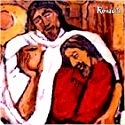
08.06.19 (Av 5, 5779) "The LORD has given to us precious and magnificent promises, so that through them you may become partners of the divine nature, escaping the corruption of the world and its lusts" (2 Pet. 1:4). In this verse note the connection between believing the promises of salvation and being "partners" (κοινωνοὶ) in the divine nature. It is by faith that we come to know the divine nature (θείας φύσεως), that is, the great attributes of God's character and heart. We are enabled to apprehend this because the miracle of spiritual rebirth transmits the life and "spiritual DNA" of our Heavenly Father to us, transforming our inner essence, and enabling us to surrender our lives to the divine will and truth. In other words, if you are a child of God then you are ontologically connected with Him, but as you grow you will learn to cleave to him, to talk with him, to understand reality in spiritual terms, and to share his passion for the healing of the world in Yeshua (תּקוּן עוֹלָם). This sort of faith is not an abstraction or ethereal hope but is instead a present spiritual reality, a daily decision and affirmation, an ongoing journey... We have a responsibility to grow up and become partners with HaShem (שותפים עם יהוה) in this world. Faith is more of a verb than a noun as we authentically commune with God and become a blessing to others. Faith itself is the work of God (John 6:29), and the works of faith are those of the Spirit. As it is written: "For we are his handiwork, created in Yeshua the Messiah for good works (לְמַעֲשִׂים טוֹבִים) which God prepared beforehand that we should walk in them" (Eph. 2:10).
 |
The City of the King...
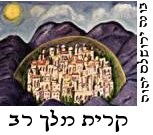
[ The following is related to the fast of Tishah B'Av, which begins Saturday, August 10th.... ]
08.06.19 (Av 5, 5779) Jerusalem is central to the Jewish heart. When religious Jews pray three times a day, they always turn toward the Holy City (i.e., mizrach: מזרח "east"). Synagogues likewise place the holy ark (the place where Torah scrolls are kept) on the wall closest to Jerusalem. Many observant Jews keep small section of an eastern wall of their house unpainted as a sign of mourning for the destruction of the Temple. Every year we close the Passover Seder with the words, La-Shanah Haba'ah Bi Yerushalayim! ("Next year in Jerusalem"). These same words are invoked to conclude the holiest day of the Jewish year, Yom Kippur. Indeed Yeshua called Jerusalem the "City of the great King" (Psalm 48:2; Matt 5:35): It is the place where He was crucified, buried, resurrected, and from where He ascended to heaven. It is also the birthplace of the true church (כלה של משיח) and the focal point of humanity's eschatological future. At the Second Coming, Yeshua will physically return to Jerusalem to restore the throne of King David. Then all the New Covenant promises given to Israel will be fulfilled as the Kingdom of God is manifest upon the earth.
For more on this, see "The Significance of Zion and the Tragedy of Tishah B'Av."
Loneliness and Exile...
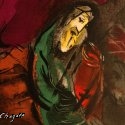
[ The solemn holiday of Tishah B'Av begins Saturday, August 10th at sundown... ]
08.06.19 (Av 5, 5779) The Scroll of Lamentations (מגילת איכה) is traditionally recited during Tishah B'Av to remember the destruction of the Holy Temple and other tragedies that have befallen the Jewish people. Lamentations is an acrostic poem that begins with the Hebrew letter Aleph in the word "eichah" (אֵיכָה): "How (eichah) lonely sits the city that once was full of people!" (Lam. 1:1). The sages note that this Hebrew word "how" (i.e., eichah) could also be read as "where are you?" (i.e., אַיֶּכָּה, ayekah), God's first question to Adam after he broke covenant in the Garden of Eden (Gen. 3:9). The midrash draws a connection between the lamentation of the LORD over Adam's banishment from Eden and Israel's banishment from Zion (Hos. 6:7). In both cases the problem centers on the failure to ask where God is.
During the Tishah B'Av service at the synagogue, when the cantor reaches the second to last verse of the book, "Hashivenu," he pauses and the congregation recites the verse in unison: Hashivenu Adonai, elekha vena-shuvah; chadesh yamenu kekedem: "Turn us back to You, O LORD, and we shall be turned; renew our days as of old" (Lam. 5:21). Often this verse is repeated and sung to a haunting melody as the scroll is returned to the Ark.
הֲשִׁיבֵנוּ יְהוָה אֵלֶיךָ וְנָשׁוּבָה
חַדֵּשׁ יָמֵינוּ כְּקֶדֶם
ha·shee·vei·noo Adonai e·ley·kha ve·nah·shoo·vah,
cha·desh ya·mey·noo ke·ke·dem

"Turn us back to yourself, O LORD, so that we may return to you;
renew our days as of old" (Lam. 5:21)

Hebrew Study Card

How many people today live in a state of self-imposed exile from the LORD? How lonely... God uses our loneliness and alienation to question our hearts, asking each of us, ayekah – "Where are you?" "Why have you turned away from me and chosen a state of exile?" Our inner pain is meant to provoke us to seek His face. He awaits our only possible response, "Hashivenu!" -- an imperative (demand) for the grace to repent: "You return us (i.e., you cause us to return) so that we may be reunited with you and healed!" We do not appeal to our own resources or strength to undergo this return, but rather trust that God's sovereign grace is sufficient to restore us to His presence. As Yeshua said, "No one can come to me unless the Father who sent me draws him, and I will raise him up" (John 6:44).
The tears of the prophet Jeremiah represent God's compassionate love for the Jewish people; the Book of Lamentations is really God's cry... God cares about the suffering of His people: b'khol tzaratam lo tzar (בְּכָל־צָרָתָם לוֹ צָר) - "In all their affliction he was afflicted" (Isa. 63:9). Even after all the horrors that befell the people of Judah due to God's disciplinary judgment, the LORD still encouraged them to seek Him again. "The faithful love of the LORD (חַסְדֵי יהוה) never ceases, and his compassions never fail. They are new every morning; great is your faithfulness" (Lam. 3:22-23). Our response to the faithful love of the LORD is teshuvah (i.e., תְּשׁוּבָה, "turning [shuv] to God"). In Modern Hebrew teshuvah means an "answer" to a shelah (שְׁאֵלָה), or a question. God's love for us is the question, and our teshuvah – our turning of the heart toward Him – is the answer. We return to the LORD when we truly acknowledge that He is our Father and our King. May we so turn today...
 |
The Will to Believe (לִשְׁמוֹר אֱמוּנִים)

[ The following entry is related to our Torah portion this week, parashat Devarim... ]
08.05.19 (Av 4, 5779) From our Torah portion this week (i.e., Devarim) we read: "But you were not willing to ascend (וְלא אֲבִיתֶם לַעֲלת), but became bitter (מָרָה) against the Word of the LORD your God" (Deut. 1:26). Moses' rebuke was not that the people were afraid to conquer the land as much as that they had lost heart and no longer desired to take hold of God's promise. The people gave up their dream; they forsook their hope; and they had lost the "devotion of their youth, their love as a bride, how they followed the LORD in the desert, into a land not sown" (Jer. 2:2). The people's failure was on two levels: First they lapsed in faith by abdicating trust in God's word, and second, they had lost the passion of their first love. In light of this, the sages say that the greater problem was that of losing heart, since the heart directs the will to believe in the miracle of God, or not...
Moses' rebuke of the people's heart condition recalls the sober warning Yeshua gave to the Ephesian believers: "I know your works, your toil and your patient endurance, and how you cannot bear with those who are evil, but have tested those who call themselves apostles and are not, and found them to be false. I know you are enduring patiently and bearing up for my name's sake, and you have not grown weary. But I have this against you, that you have abandoned the love you had at first. Remember therefore from where you have fallen; repent, and do the works you did at first. If not, I will come to you and remove your menorah from its place, unless you repent" (Rev. 2:2-5). Likewise the author of the Book of Hebrews commented: "And to whom did he swear that they would not enter his rest, but to those who were disobedient? And with whom was he provoked for forty years? Was it not with those who sinned, whose bodies fell in the desert? So we see that they were unable to enter because of unbelief" (Heb. 3:17-19). The question of our faith is essential: "It is a fearful thing to fall into the hands of the living God" (Heb. 10:31).
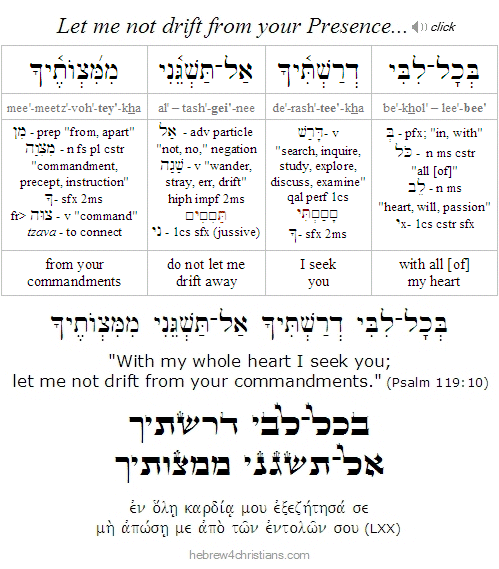 |
 |
New Hebrew Grammar Pages....

08.05.19 (Av 4, 5779) Shalom friends. It has been awhile since I've worked on the Hebrew Grammar pages of the main site, but recently I have begun writing some new lessons that I hope you might find helpful. The Hebrew verbal system can seem to be a formidable topic because verbs are often more complex than other parts of speech, but once you begin to think about the logic of the "binyanim" (i.e., the verb stems that spring from the root), it is not that difficult to comprehend. Consider the following diagram I made (click for larger):
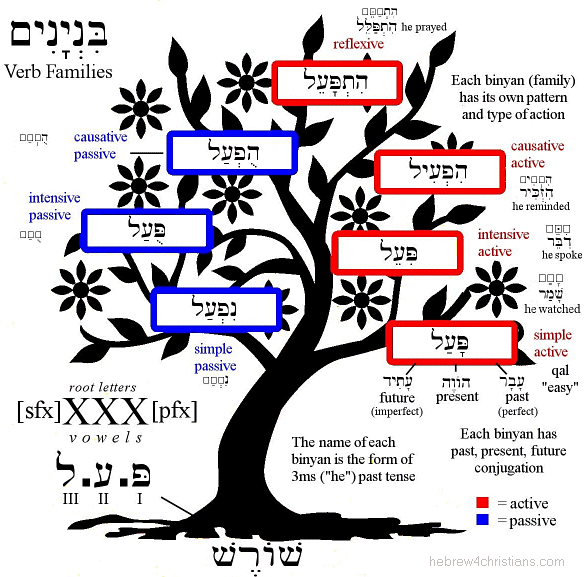 |
A couple general observations might be helpful:
- Every Hebrew verb is based on a three-consonant root called the shoresh (שׁוֹרֶשׁ). The shoresh "encodes" or contains the basic semantic meaning or purpose of a given verb. For purposes of classification, each consonant of a root is assigned a number (I, II, III). Strong roots have no weak consonants defined as either a guttural letter (i.e., ר, ע, ח, ה, א) or in some instances, a Yod (י) or Nun (נ). Weak roots, on the other hand, have one (or more) guttural letters which will cause changes in the vowel patterns.
- A root's type of action is expressed in a particular binyan (בִּנִיָן) often described as a linguistic "house" or "structure," and by extension, as an offshoot "stem," or "branch" derived from a basic root. There are seven binyanim (בִּנְיָנִים), each having its own vowel pattern and characteristic mode of action. When a shoresh follows that pattern its action will change but its basic meaning will be retained. Some binyanim are active (i.e., the subject does action) while others are passive (i.ee. the subject receives action). One binyan is reflexive (i.e., the subject both does and is affected by the action). The seven binyanim each have three "tenses" (past, present, and future) as well as other verbal constructions such as infinitives, so a single shoresh can be used to describe a lot of nuances regarding the characteristic action of any conjugated form. For now it is best to simply remember that a binyan is pattern of vowels (which prefixes and/or suffixes), and the name of each binyan (e.g., pa'al, piel) is the 3ms form of that pattern.
- The most basic form of the verbal root is known as the Pa'al (פָּעַל; based on the 3ms pattern) since it expresses the simple sense of the shoresh ("walk," "stand," "eat," and so on). Because it is the easiest and simplest form, it is called Qal (קַל), meaning "light" or "simple." Qal verbs represent the most basic of the verbal stems and are the easiest to learn. In most Hebrew dictionaries, verbs are listed in the 3rd person masculine singular of the Qal (when it exists).
 |
At any rate, here are a few new resource pages I created for learning the biblical Hebrew verbal system. I hope to add more of these as time (and strength) permit:
Tishah B'Av - Aug. 10th - 11th

08.05.19 (Av 4, 5779) Tishah B'Av (תשעה באב, or the "ninth [day] of [the month of] Av") is an annual fast day of mourning that recalls the many tragedies that have befallen the Jewish people over the centuries, but most especially the destruction of the Holy Temple and the ongoing galut (exile) of Israel. This year Tishah B'Av begins Saturday, August 10th at sundown and runs 25 hours until Sunday, August 11th, one hour after sundown. The customs for observing the fast are similar to those of Yom Kippur.
Tishah B'Av is generally regarded as the saddest day of the Jewish year (even sadder than Yom Kippur) since it was on this date that both the First and the Second Temples were destroyed and the Jewish people were forced into exile. The root of these tragedies is said to go back to the Exodus from Egypt, when the LORD decreed a 40 year exile from the Promised Land because of the Sin of the Spies on the ninth of Av. In addition, Aaron died on Av 1 (Num. 33:38), and this was said to foreshadow the destruction of the Temple. The sages call this prophetic principle: ma'aseh avot siman labanim (מַעֲשֵׂה אֲבוֹת סִימָן לַבָּנִים): "The deeds of the fathers are signs for the children."
The ninth of Av is the lowest point of a three week period of mourning that began with the fast of the 17th day of the fourth month (undertaken to recall the first breach in the walls of Jerusalem by the Babylonians before the First Temple was destroyed). The "Three Weeks of Sorrow" is intended to instill a sense of teshuvah (repentance) and to prepare for the Messianic redemption to come.
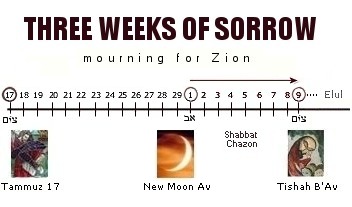 |
Tishah B'Av allows us to express heartfelt grief over the loss of Zion and therefore over the fraility of our human condition. During this time it is appropriate to grieve over our sins and to shed tears that attest to lev nishbar ve'nidkeh, a "broken and crushed heart" (Psalm 51:17). Indeed, during the entire "Three Weeks of Sorrow" we read selections from the prophets that forewarn of the coming destruction of the Temple (churban) and the subsequent exile of the Jewish people (galut). During this time of the year, we listen to the lamentations of the prophet Jeremiah crying out for our repentance...
During Tishah B'Av synagogue services, the lights are dimmed and the Aron Hakodesh (Holy Ark) is draped in black (in some synagogues the parochet (curtain) is removed as a sign of mourning). The crowns with tinkling bells are removed from Torah scrolls. Congregants remove their leather shoes and do not greet each other. The cantor leads the prayers readings in a low, mournful voice, and the cantillation (chanting style) for the Scripture reading is set to elegiac, sorrowful melodies.
Note: For a PDF study of Tishah B'Av (and why it's important), click here.
Shabbat Chazon (שבת חזון)

[ The Sabbath preceding the somber holiday of Tishah B'Av is called Shabbat Chazon... ]
08.04.19 (Av 3, 5779) We are in the midst of the "Three Weeks of Sorrow" that began with the Fast of the Fourth month and ends with the solemn fast of Tishah B'Av (the Fast of the Fifth month; Zech 8:19). Spiritually, these three weeks are marked by a renewed called for teshuvah (repentance), and the weekly readings from the prophets all warn about imminent judgment from heaven. Among the Orthodox, the last nine days of the Three Weeks are very solemn. Beginning on the first day of the month of Av, traditional mourning customs are practiced in anticipation of the doleful fast of Tishah B'Av, when the Book of Lamentations (Megillat Eichah) will be plaintively chanted during the evening service. The Sabbath that immediately precedes the fast of Tishah B'Av is called Shabbat Chazon (i.e., שבת חזון, the "Sabbath of Vision") because the Haftarah that is read (i.e., Isa. 1:1-25) describes the terrible vision of the prophet Isaiah regarding the imminent destruction of the Temple:
"Hear, O heavens and give ear, O earth,
For the LORD has spoken;
Though I brought up and raised My children,
They have rebelled against me." (Isa. 1:2)
When it was first recorded, Isaiah's vision of the destruction was still future, and the Jews still had a chance to repent before the great tragedy befell them. However, since they refused to turn back to God, calamity overtook them. Today the Haftarah is traditionally chanted to the same haunting melody as Megilat Eichah (Lamentations), written by the prophet Jeremiah, who was an eyewitness to the destruction and fall of Jerusalem.
During the last nine days of the Three Weeks of Sorrow it is common to confess the sins in our lives that likewise contribute to the lack of God's Presence in our midst. Hashivenu Adonai, elekha ve'nashuvah; chadesh yamenu kekedem: "Turn us back to You, O LORD, and we shall be turned; renew our days as of old" (Lam. 5:21).
Though Shabbat Chazon is a time of mourning, it is also a time for hope. The Torah reading for this Sabbath is always parashat Devarim, the first portion of the Book of Deuteronomy. In this reading, Moses details the victorious battles with Sihon the king of Amorites and Og the king of Bashan. Because it speaks of God's victory, the sages recommended envisioning the future Temple that will be built by the Messiah at this time. According to Jewish tradition, after the Messiah comes and restores Israel, Tishah B'Av will become one of the happiest days of the year (and may He arrive soon and in our days). L'shavuah tov, chaverim....
The Final Book of Torah (שבת דברים)

08.04.19 (Av 3, 5779) The concluding book of the Torah of Moses is called Devarim ("words"), from the phrase eleh ha'devarim ("these are the words...") found in its opening verse (see below). In our English Bibles, Devarim is known as "Deuteronomy," from a Greek word meaning "second (or repeated) law" (δευτερονόμιον), a term used to translate the phrase mishneh ha-Torah ("copy of the Torah," Deut. 17:18). Generally speaking, this book represents Moses' "farewell address" to Israel, where he reviews the history and the laws given to the people and repeatedly warns that obedience will bring blessing while disobedience will bring disaster. The series of personal discourses (or sermons) in this book all have the tone of rebuke and admonition, and indeed some sages say it resembles a sort of "deathbed blessing" not unlike Jacob's blessing given to his sons.
Our Torah portion for this week – the very first of the Book of Deuteronomy – begins with Moses recounting the journey from Mount Sinai to the edge of the promised land. He mentioned the difficulty of personally governing the people and recalled how he set up a system of judges to help him administer justice among the various tribes. Moses then reminded the people of the sin of the spies and the rebellion of the people at Kadesh Barnea, which led to God's decree that no one of that generation would live to enter the land of Canaan (except for Caleb and Joshua). Moses then provided an outline of the 38 year exile of the Israelites back toward the Sea of Reeds, into the desert regions, and then back again until the subsequent generation was ready to enter the promised land.
Near to the Hurting...

08.02.19 (Av 1, 5779) Awakening to our need for God inevitably involves a sense of irremediable brokenness, a feeling that you are not whole, that you are a mess, and that your need for God's healing is constant and relentless... Contrary to the ideals of proud humanism, spirituality is a state of "blessed neediness," of being "poor in spirit," that aches with inner desperation for God's power of healing (Matt. 5:3). Those who humbly cry out to the LORD understand their great need for deliverance. Our Lord Yeshua testified: "The Son of Man came to seek and to save the lost" (Luke 19:10), and therefore He is found in the midst of the leper colonies of the hurting, the forgotten, and the rejected. As the "Man of Sorrows" (i.e., ish makhovot: אִישׁ מַכְאבוֹת) he understands the language of our pain (Isa. 53:3).
קָרוֹב יְהוָה לְנִשְׁבְּרֵי־לֵב
וְאֶת־דַּכְּאֵי־רוּחַ יוֹשִׁיעַ
ka·rohv · Adonai · le·neesh·be·rei - leiv
ve·et - dak·ei- roo'·ach · yo·shee'·a

"The LORD is near to the brokenhearted
and saves the crushed in spirit"
(Psalm 34:18)

Hebrew Study Card

The question may be asked, how can we live with our brokenness? Yeshua asks us not to see it as a curse from God that reminds us of our wretched condition but to yield it to Him for our sanctification and ultimate healing... In this way, brokenness can be a gateway to a deeper walk with God, going "through the wound" to find life and blessing... Shabbat Shalom.
Strangers with Him...

08.02.19 (Av 1, 5779) "Hear my prayer, O LORD, and give ear to my cry; hold not your peace at my tears! For I am a stranger with you, a sojourner, like all my fathers" (Psalm 39:12). The godly regard themselves as outsiders (i.e., gerim: גֵּרִים) in this world, temporary residents (i.e., toshavim: תּוֹשָׁבִים) on their way to the world to come (Heb. 13:14), while the wicked regard this world as the only (or all-consuming) reality, and therefore they cling, demand their place here, and live entirely for its momentary pleasures. In light of this, it has truly been said that God 'settles' among those who are strangers in this world, but makes himself "strange" to those who 'settle' here... And may it please the LORD our God to give us the blessing of dissatisfaction with this world and its trinkets, and an abiding and all-consuming desire to be home with Him. Amen.
שִׁמְעָה־תְפִלָּתִי יְהוָה וְשַׁוְעָתִי הַאֲזינָה
אֶל־דִּמְעָתִי אַל־תֶּחֱרַשׁ כִּי גֵר אָנכִי עִמָּךְ
תּוֹשָׁב כְּכָל־אֲבוֹתָי
sheem·ah · te·fee·lah·tee · Adonai · ve·shav·ah·tee · ha·a·zee·nah
el · deem·ah·tee · al · te·che·rash · kee · geir · ah·noh·khee · ee·makh
toh·shav · ke·khohl · a·voh·tai

"Hear my prayer, O LORD, and give ear to my cry;
hold not your peace at my tears! For I am an outsider with you,
a temporary resident, like all my fathers."
(Psalm 39:12)

Hebrew Study Card
Keep moving toward the Heavenly City, friends... Do not give up hope. "I am sure of this, that he who began a good work in you will bring it to completion (ἐπιτελέω) at the Day of Yeshua the Messiah" (Phil 1:6). The LORD is able to guard you (φυλάξαι) from stumbling and to present you blameless before the presence of His glory with great joy (Jude 1:24). "He will preserve you (βεβαιόω) to the end, guiltless in the Day of our Yeshua the Messiah" (1 Cor. 1:8). He who calls you is faithful; He will surely do it (1 Thess. 5:24). "The Lord is faithful (נֶאֱמָן הוּא): He will establish you and guard you against the evil one" (2 Thess. 3:3).
Suffering and Healing...

08.01.19 (Tammuz 29, 5779) I've written about the problem of suffering in more or less intellectual terms over the years, though I think the real problem, when reflected upon emotionally, is the fear of being lost, abandoned, and made an orphan forever and ever. It is the child's cry for his father's touch or his mother's warm embrace denied and left ungiven... Is that not something of the fear, after all? As the late Henri Nouwen once said: "Not being welcome is your greatest fear. It connects with your birth fear, your fear of not being welcome in this life, and your death fear, your fear of not being welcome in the life after this. It is the deep-seated fear that it would have been better if you had not lived." The central message of the cross of Messiah is that God regards you as personally worth dying for, and indeed, that your life is worth the exchange of His own... You are treasured; you are loved. This is of first importance (1 Cor. 15:3-5). The Word of Life is - above all else - an invitation, a cry of welcome, that sings out to you in your loneliness and shame. The core of the battle is here - whether you will decide to trust in God's love or shrink back into the places of darkness, isolation, and pain. Yeshua says, "Don't be afraid; come to me; I love you, I accept you; I receive you; please, be welcome with me; I will take your hand, I will be with you..."
אַל־תִּירָא כִּי עִמְּךָ־אָנִי
אַל־תִּשְׁתָּע כִּי־אֲנִי אֱלהֶיךָ
al - tee·rah · kee · ee·me·kha-ah·nee
al - teesh·tah · kee-a·nee · e·loh·hey·kha

"Do not be afraid, for I am with you;
do not be dismayed, for I am your God"
(Isa. 41:10)

The real question, for some of us, is whether you want to be loved, after all. Some people, so sadly, know nothing other than the pain of being outside, rejected, unwanted... and for them it is a great, terrible struggle to open their hearts to love. May God bring His compassion to bear upon them, and may he help us share his heart with others. Chodesh tov, chaverim....
Following Yeshua...

08.01.19 (Tammuz 29, 5779) When Yeshua says "follow me," he doesn't mince words or ask for the impossible; neither does he seek "admirers" or the celebrity of mere men. To follow Yeshua means to walk along the same road he did, not in the physical sense, of course, but in the way or "how" of the road... To "walk as he walked" means your life will share his heart, vision, and spirit as much as is possible in your present circumstances. The life of the Teacher is the road; his heart voices the spirit that calls the disciple ahead; he prepares a place for you in the communion of his love. May you press on toward the goal of the upward call in Yeshua the Messiah (Phil. 3:14).
"What dreadful untruth it is to admire in relation to the truth instead of imitating it... When there is no danger, when there is dead calm, when everything is favorable to Christianity, it is all to easy to confuse an admirer with a follower, and this can happen very quietly; the admirer can die in the delusion that the position he took was the true one. Give heed, therefore, to the contemporaneity of Christ" - Soren Kierkegaard (Practice in Christianity).
The Fruit of our Words...

[ Our Torah reading this week (Mattot) discusses various laws regarding vows and oaths... ]
08.01.19 (Tammuz 29, 5779) Yeshua said that as a tree is to its fruit, so is a person's heart is to his speech. Our words arise from an underlying source and root: "I tell you, on the Day of Judgment people will give account for every careless word (πᾶν ῥῆμα ἀργὸν) they speak, for by your words you will be justified, and by your words you will be condemned" (Matt. 12:36-37). First note that the phrase translated "every careless word" can be understood as "every 'workless' word," that is, every vain or empty word spoken, every broken promise, every insincere utterance, and so on. Second, note that there is a relationship between naming and being in Hebrew thought, and indeed the Hebrew word davar (דּבר), usually translated as "word," can also mean "thing." This suggests that our words define reality - not in an absolute sense, of course - but in terms of our perspective and attitude, and for that we are held responsible before the LORD. Since our words express our thoughts, Yeshua wants us to make up our minds: "Either make the tree good and its fruit good, or make the tree bad and its fruit bad, for the tree is known by its fruit" (Matt. 12:33)
And may it please our gracious and long-suffering LORD to answer the cry of our heart for inner purity and truth: "Let my words and my inmost thoughtsbe acceptable before you, O LORD, my Rock and my Redeemer" (Psalm 19:14). Amen...
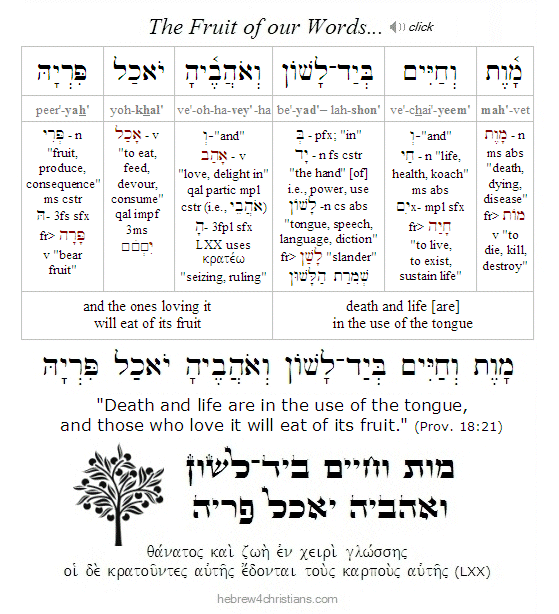 |
The tongue expresses the condition of the heart, since "from the abundance of the heart the mouth speaks" (Luke 6:45). Therefore the root issue concerns the heart (לֵב), the "midst of the self" that wills, desires, and chooses how to interpret and describe the world. If we choose to see from a heart of fear, we will tend to use our words as a weapon; but if we see with a heart of faith, we will extend compassion and seek to build others up....
In the Book of Proverbs we read, "When words are many, transgression is not lacking, but whoever restrains his lips is wise" (10:19). The Chofetz Chaim comments: "When people are preparing a telegram, notice how carefully they consider each word before they put it down. That is how careful we must be when we speak." As James the Righteous admonishes us: "Let every person be quick to hear, slow to speak, slow to anger" (James 1:19).
Hebrew Keywords:
Here are a couple Hebrew "words for the day" related to our Torah portion for this week:
- Dibbur emet (דברי אמת) - The practice of "speaking truth" and being honest and straightforward (i.e., yashar: יָשָׁר) with ourselves and others; the principle of using words with integrity and justice. "These are the things you are to do: speak truth (דַּבְּרוּ אֱמֶת) to one another, render in your gates judgments that are true and make for peace" (Zech. 8:16). See also Lev. 19:11; Eph. 4:25, Col. 3:9, among other verses. Note that dibbur emet also forbids spreading gossip, sharing worthless news reports, expressing contempt, mockery, or outrage over the viewpoints of others, and so on. An honest person doesn't play games with words but understands that communication is a sacred trust. Our words are to be regarded as sacred, as an expression of truth. God has made us inviolable promises, and we are never to play games with that. Just as His word is sacred, so we should strive to be sacred in our speech, too....
The Torah states, "You shall not put a stumbling block (מִכְשׁוֹל) before the blind" (Lev. 19:14). In addition to its literal meaning, the word "blind" figuratively refers to a person unaware of all the facts and who is therefore made vulnerable. Someone who misdirects the blind deceives them, and this violates the 9th commandment not to bear false witness (Exod. 20:16; 23:1). Such deception is called genevat da'at (גְּנֵבַת דַעַת), or "stealing the mind," since it defrauds the other person's trust. For example, it is common practice for politicians to disclose only what they think others need to know, and therefore they offer incomplete versions of truth for the sake of their own self-serving interests. Lying to others is a violation, then, of both the commandment not to steal and the commandment not to bear false witness. "The righteous person hates lies" - דְּבַר־שֶׁקֶר יִשְׂנָא צַדִּיק (Prov. 13:5).
- Shemirat ha'lashon (שְׁמִירַת הַלָּשׁוֹן) - "Guarding the tongue," that is, watching what you say and being careful not to use words abusively or foolishly. As it is written: "What person is there who desires life and loves many days, that he may see good? Keep your tongue from evil and your lips from speaking deceit. Turn away from evil and do good; seek peace and pursue it." (Psalm 34:12-14). "Set a guard, O LORD, over my mouth (שִׁיתָה יְהוָה שָׁמְרָה לְפִי); keep watch over the door of my lips" (Psalm 141:3). And as King David prayed: "Let my words and my inmost thoughts be acceptable to you, O LORD, my Rock and my Redeemer" (Psalm 19:14). See also Prov. 10:31; 12:13; 13:3; Eccl. 10: 12; Eph. 4:29; Col. 4:6, and so on.
 |
|



























